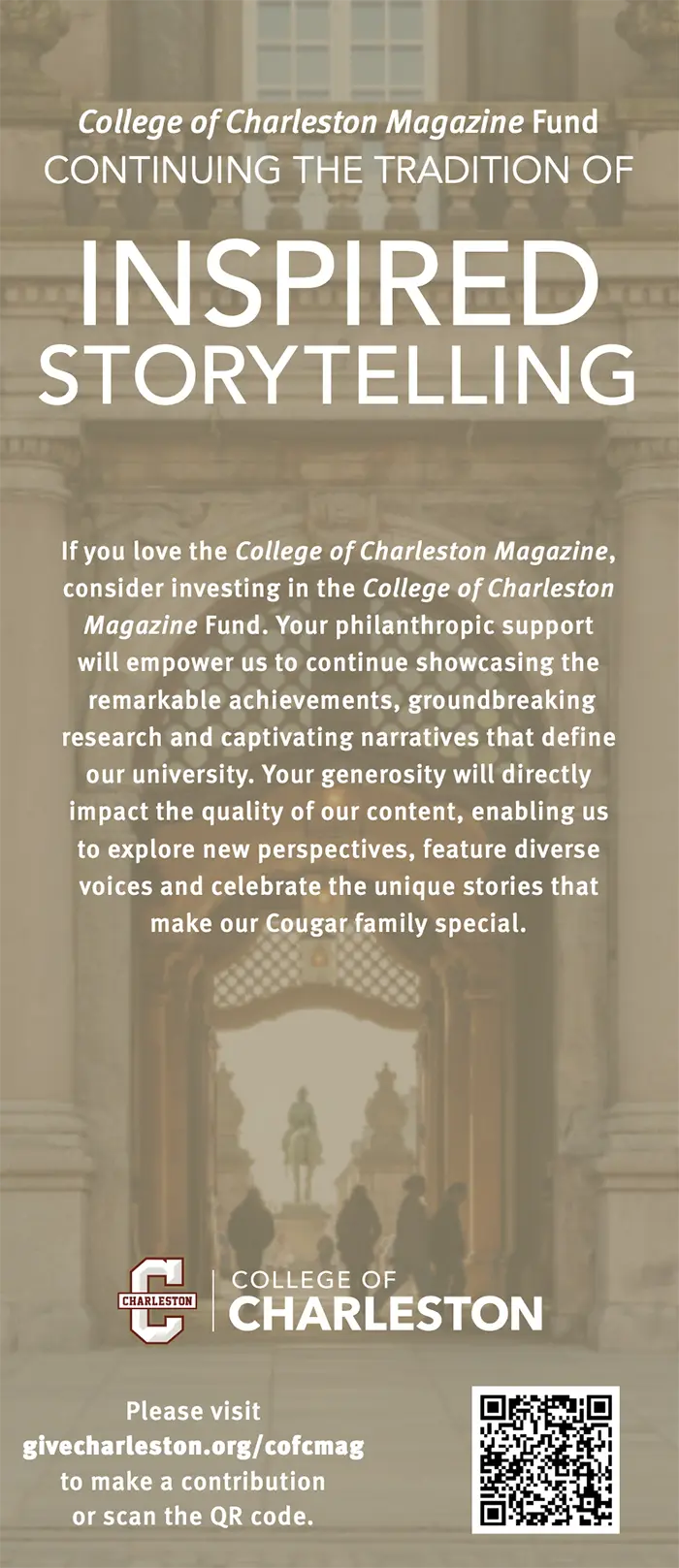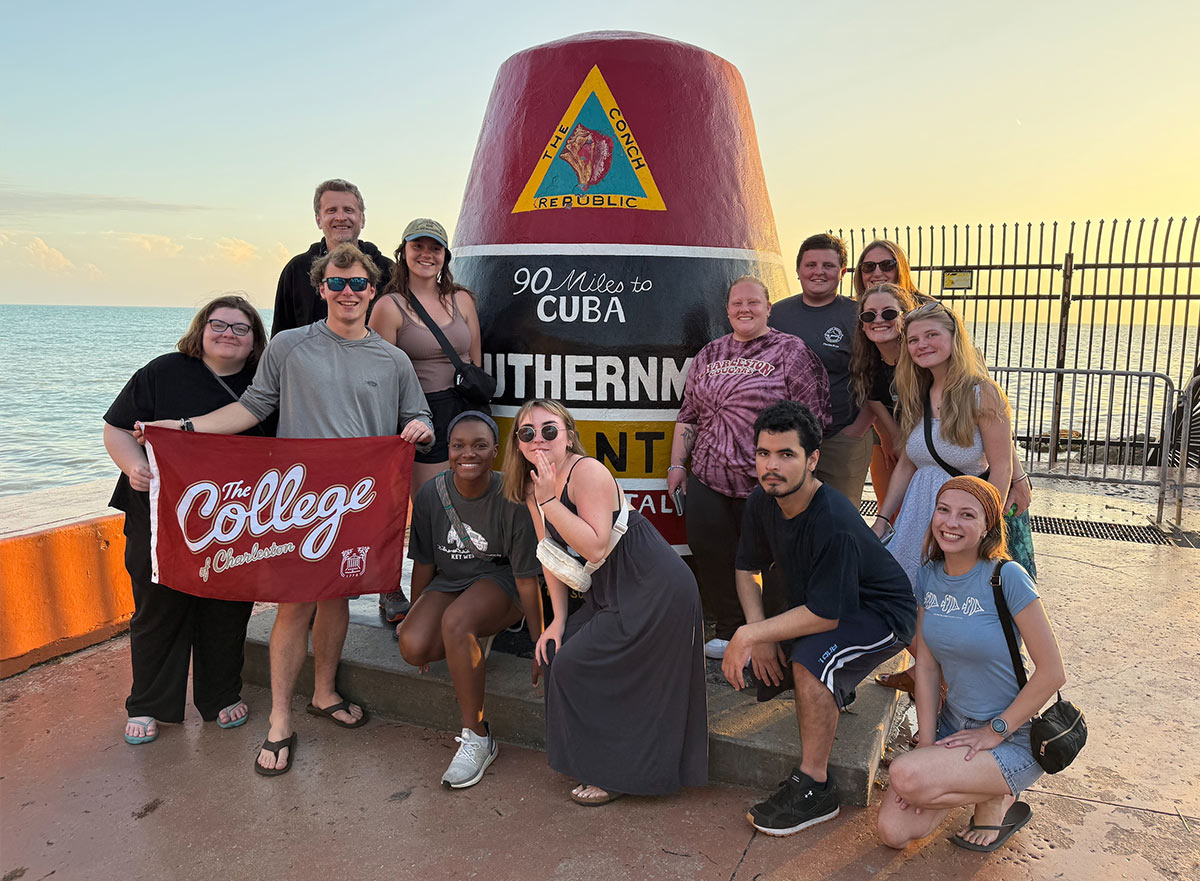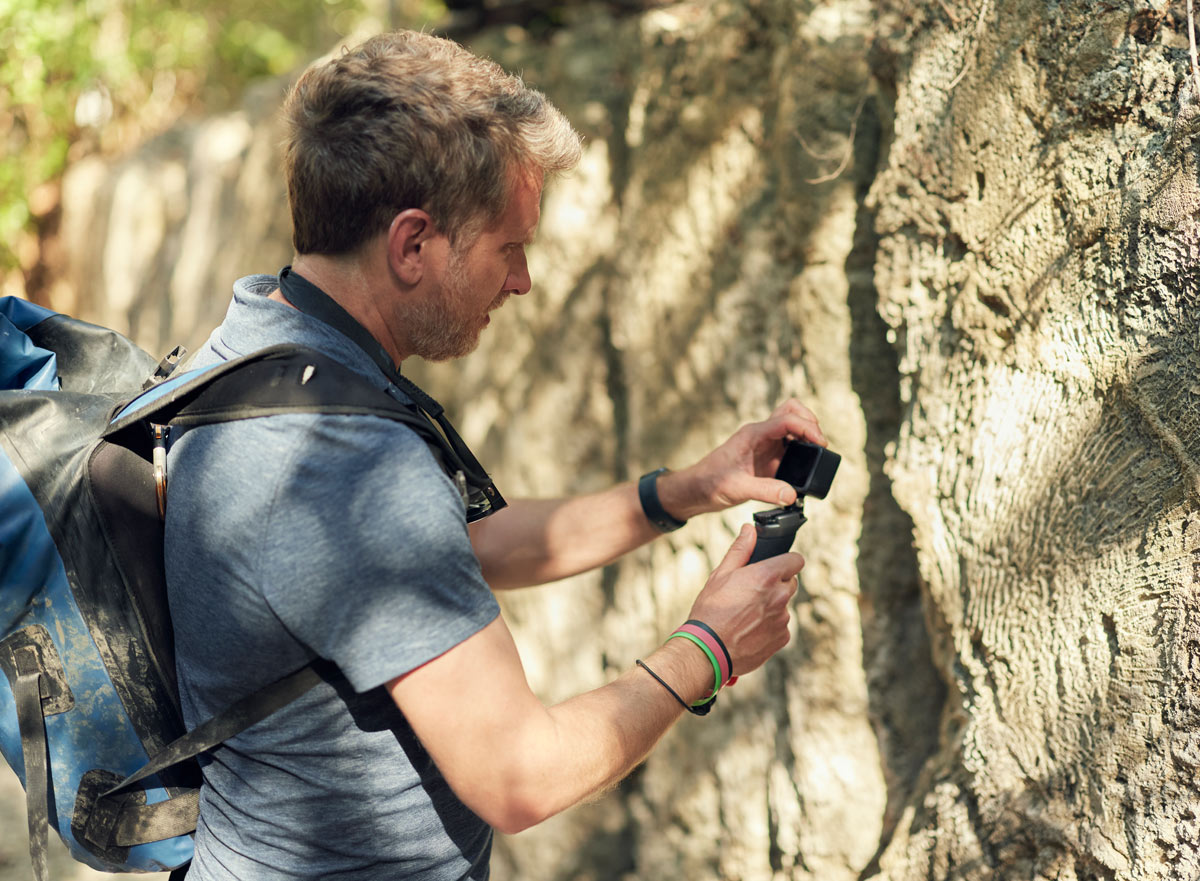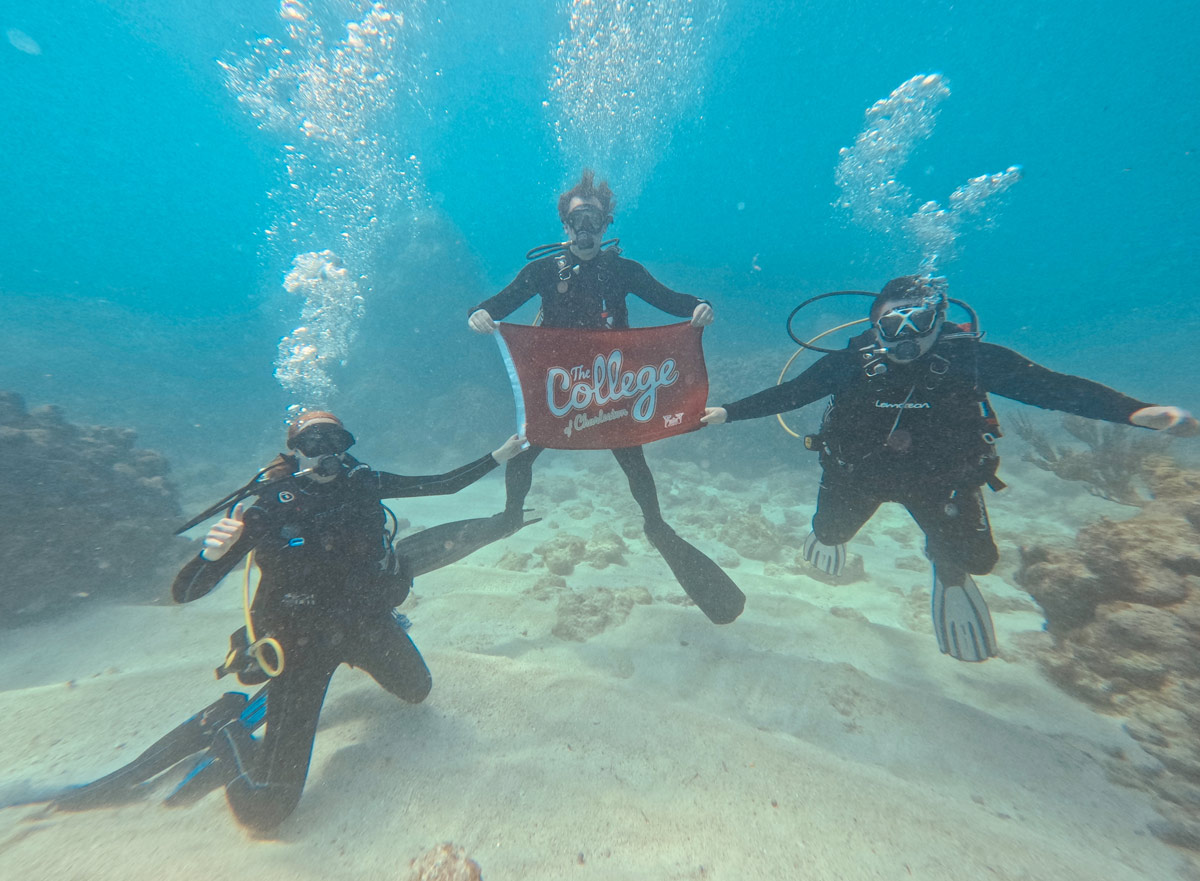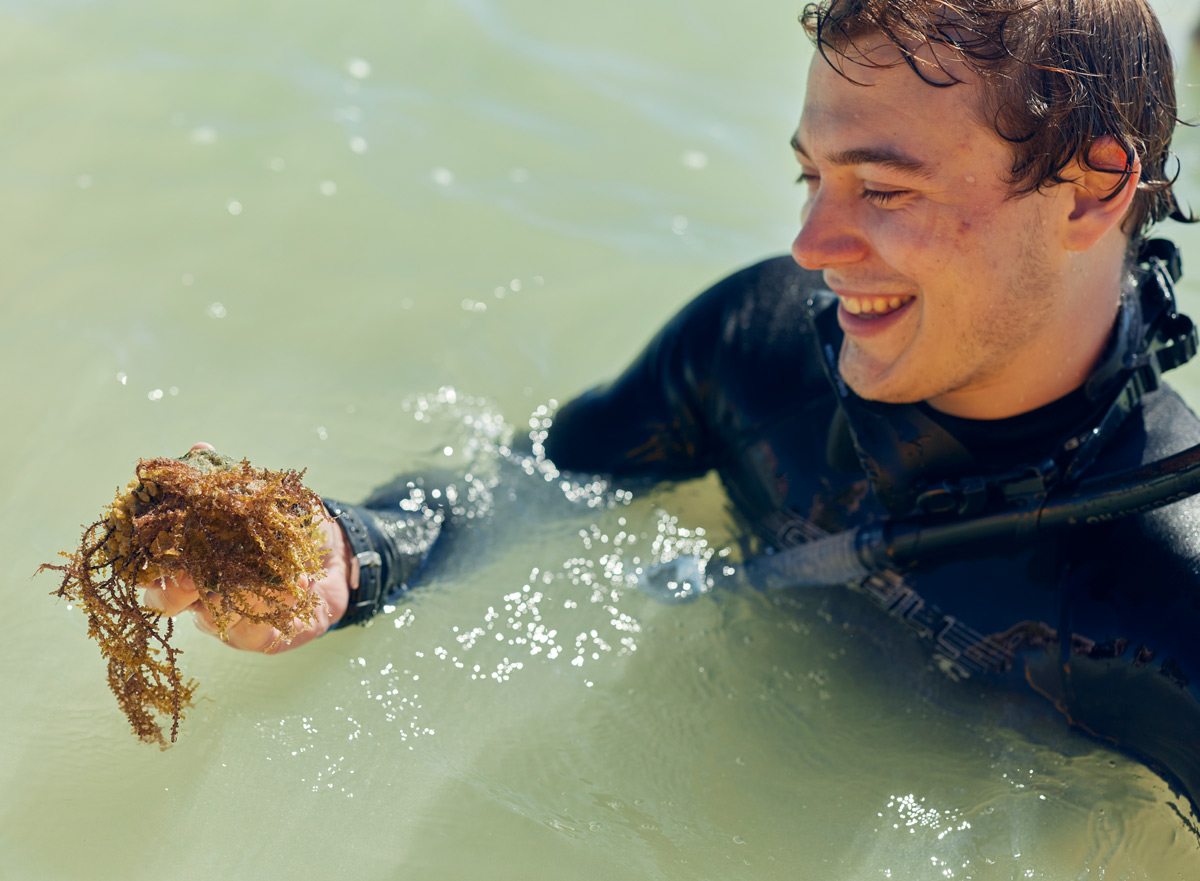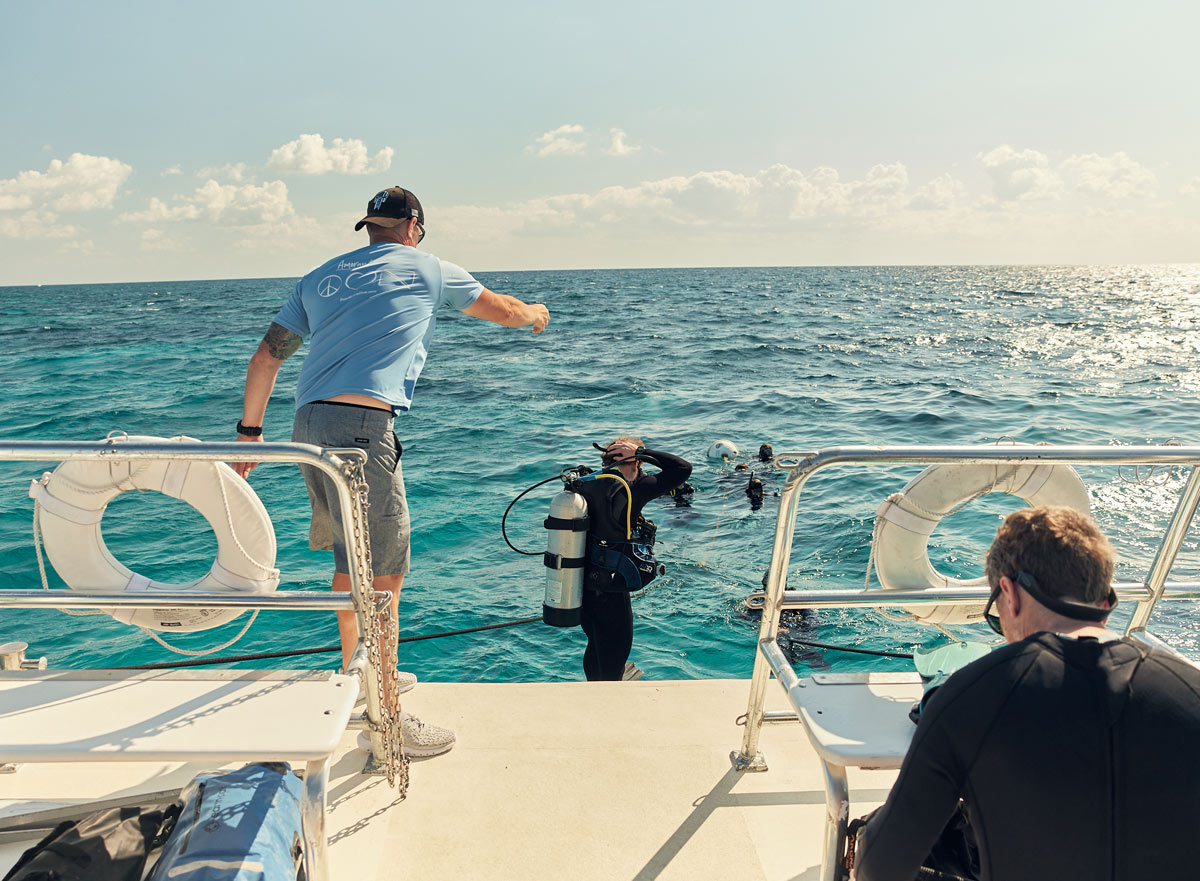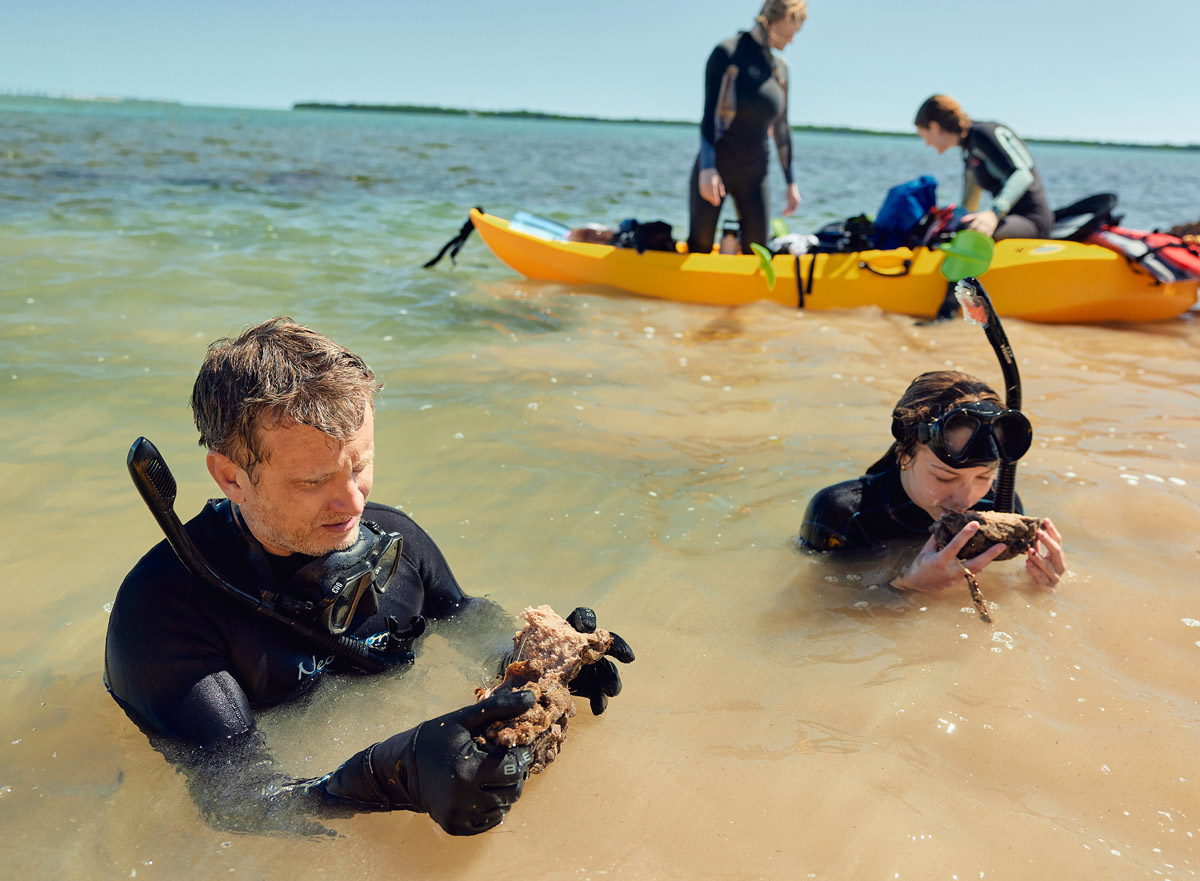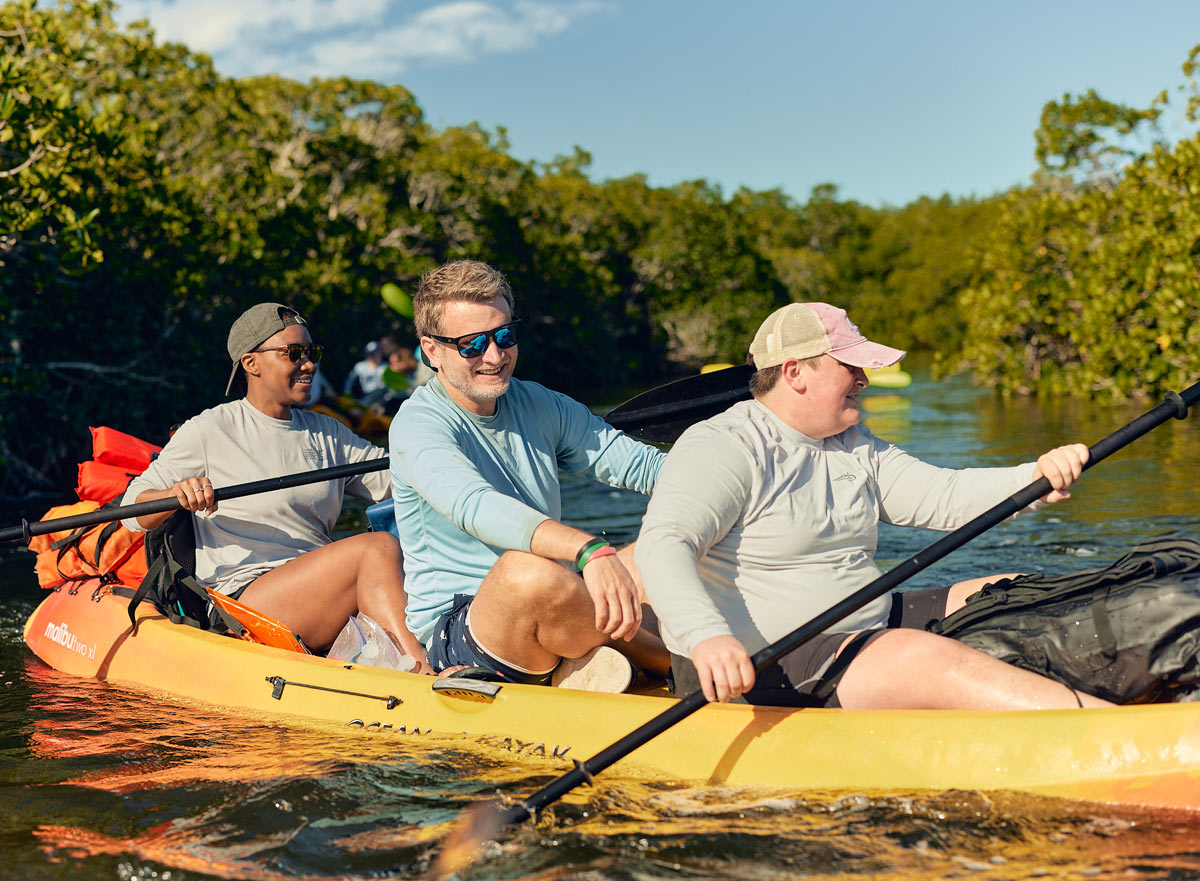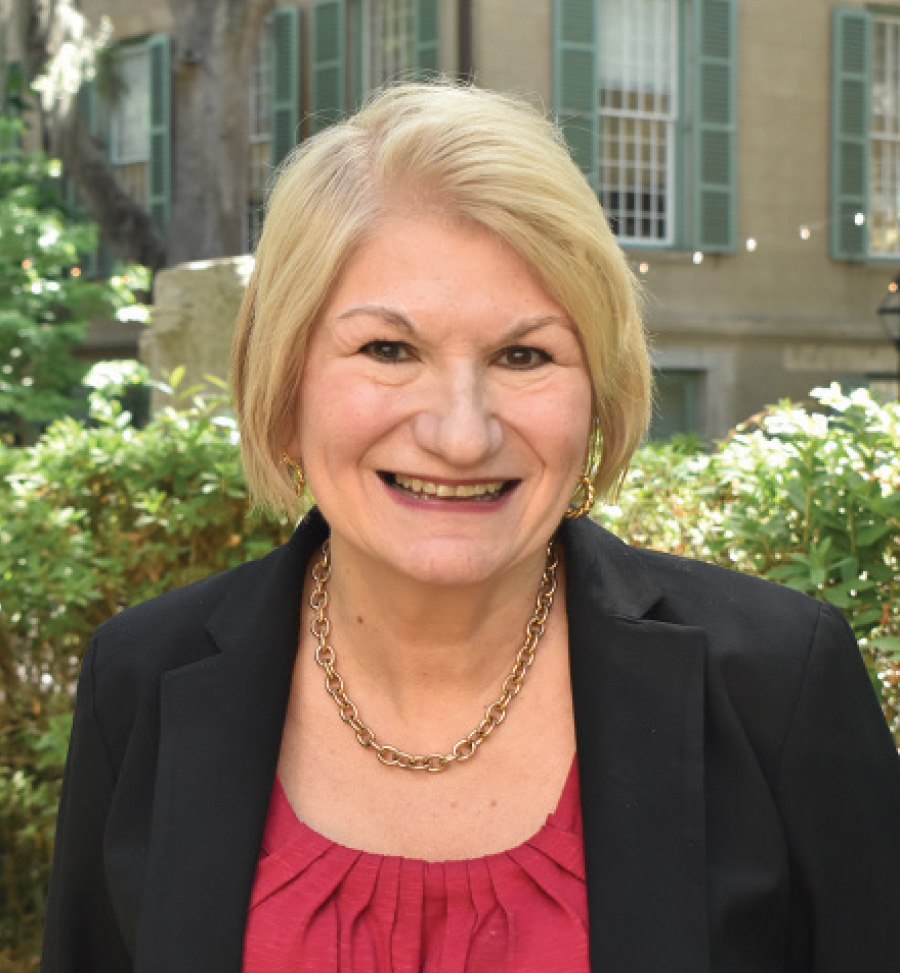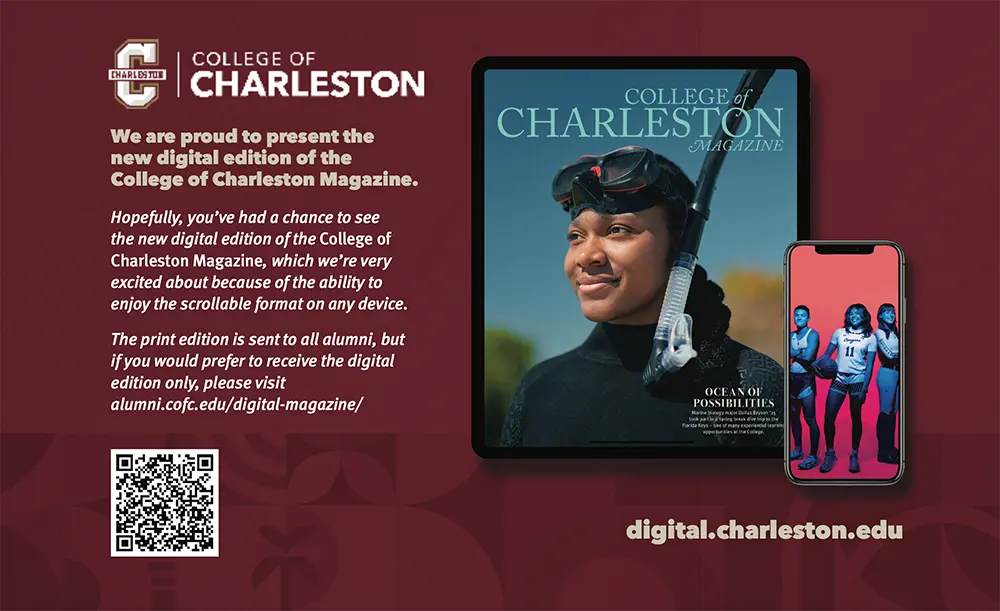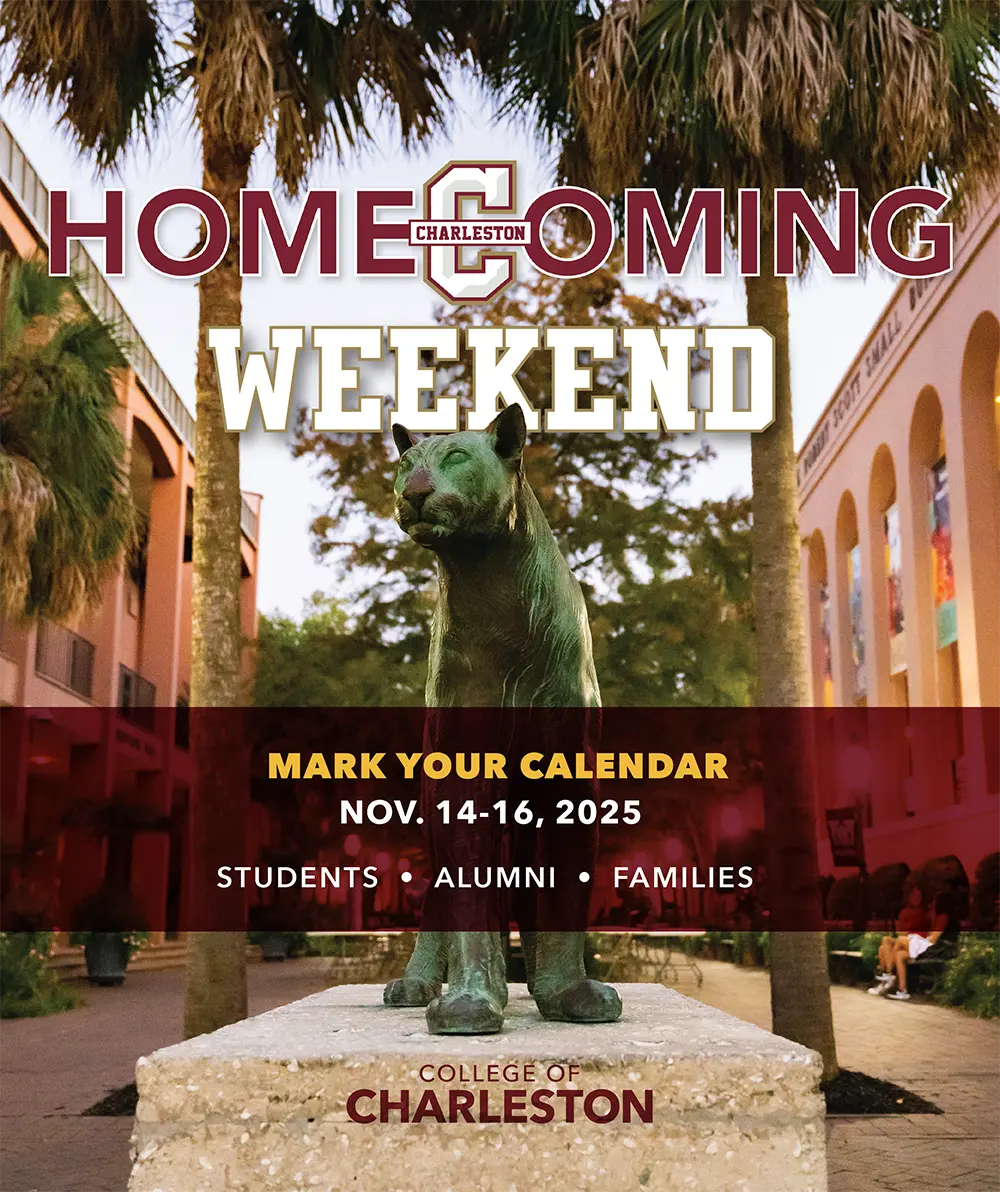College of Charleston Magazine Summer 2025

POSSIBILITIES
Marine biology major Dallas Bryson ’25 took part in a spring break dive trip to the Florida Keys – one of many experiential learning opportunities at the College.

SUMMER 2025 Volume XXIX, Issue 2
College of Charleston
Office of Marketing and Communications
Charleston, SC 29424-0001
- Coming Home
26 Thanks to Jewish studies major Leah Davenport ’25, a family murdered in the Holocaust is now memorialized in front of their Berlin residence. - Deep Dive
34 As part of Chris Freeman’s Biology of Coral Reefs class, 12 students spent spring break in the Florida Keys, illustrating the College’s emphasis on – and expertise in – experiential learning. - Global Impact
42 The head of global marketing efforts for developer communities at Google, Rachelle Olden ’04 is using technology, community and inclusivity to create space for something better.
-
Departments
- Around the Cistern 3
- Life Academic 9
- Making the Grade 15
- TEAMWORK 21
- Impact 49
- Alumni Notebook 55
- LAST WORD 72
- on the cover: Dallas Bryson ’25
- photo by: Mary Beth Koeth
Just What the Doctor Ordered
So how do we keep up with all of this change but not end up like Oldsmobile? It’s an important question that every person, every business and every institution needs to reflect upon and try to answer for themselves.
For the College of Charleston, we embedded our answers about change into our 10-year strategic plan, Tradition & Transformation, and we determined that focusing on the three pillars of our business (student success, academic distinction and employee success) would help us balance what has made our institution great for so long while at the same time positioning us for the future.
When I first arrived at the College in 2019, our institution was designated a comprehensive university by the state, which limited our ability to offer doctoral degrees (also known as terminal degrees). Since then, we have worked closely with the South Carolina General Assembly to change the law and to reclassify colleges and universities in the state. And now, the College has the ability to offer a limited number of doctoral programs.
In addition to a Ph.D. in math and computing that we implemented two years ago, this past academic year the College received approval to offer two new doctoral degree programs: an Ed.D. (doctor of education) in learning and inquiry in practice and an executive DBA (doctorate in business administration).
The Ed.D. combines theoretical and practical learning experiences, with a strong emphasis on community partnerships, policy and applied research. It was designed to be both flexible and accessible for today’s working professional, with options for both full-time and part-time study. Coursework is offered in a hybrid format, combining online and in-person instruction, and students will need to complete 60 credit hours. Time to completion will vary, but we expect full-time students to take three years and part-time students about 5.5 years. The first cohort of students, pulled from a strong applicant pool, began their studies in June. This program is perfect for educators as well as those in the nonprofit sector.
The executive DBA is a plus-up for the MBA, going beyond that work to foster a deeper understanding of organizational issues and help executives make high-level decisions rooted in rigorous analysis. Most importantly, it will help working professionals to navigate disruption, from AI to globalization, and provide them with the tools to anticipate change and design sustainable strategies. The program focuses on applying research to practical business problems, so it is ideal for leaders who want to combine theory and practice.
Ours is one of only 34 executive DBA programs in the country and is the first of its kind in the state of South Carolina. For those interested, you must have a master’s degree and a minimum of 10 years of work experience. The program is 55 credit hours and can be completed in three years. There is a one-weekend residency per term and online learning. The first cohort will begin in August.
We expect both of these doctoral programs will help update and upgrade our students’ skill sets to make them more effective leaders in their chosen professions. Change can be difficult to navigate, but education is the key for advancement and handling the path forward. More importantly, these new programs will lift the College into a higher orbit of innovation, relevance and impact.
This is not your father’s (or your mother’s) College.

AROUND THE CISTERN
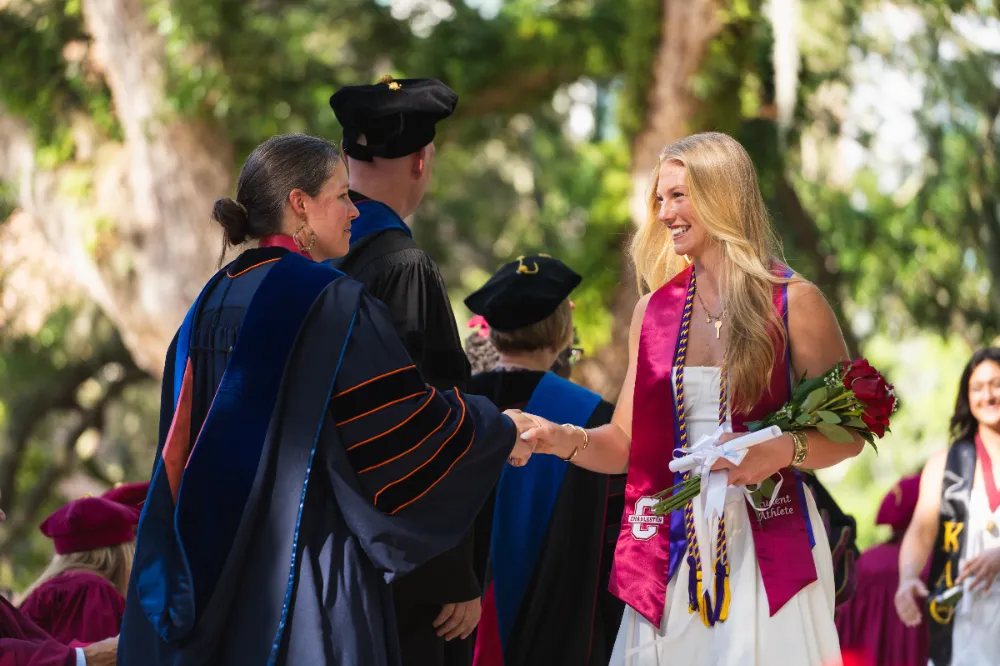
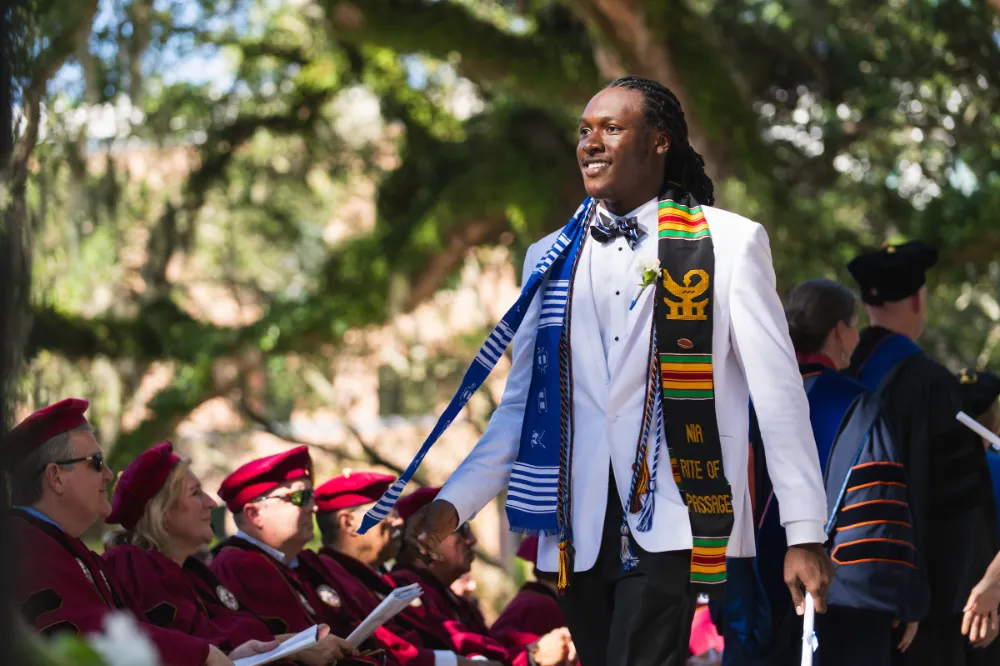
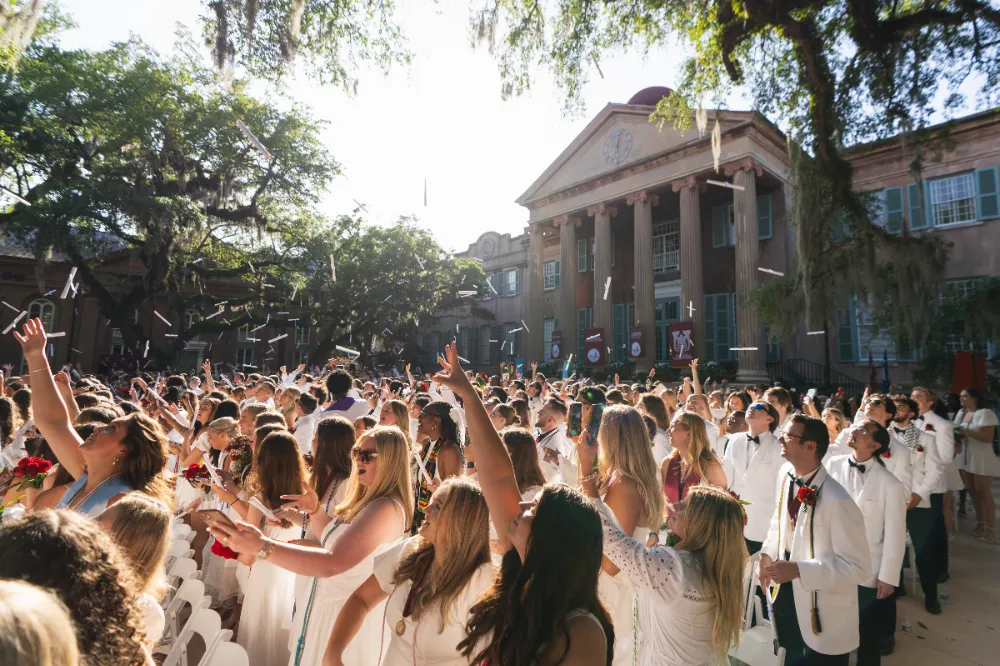
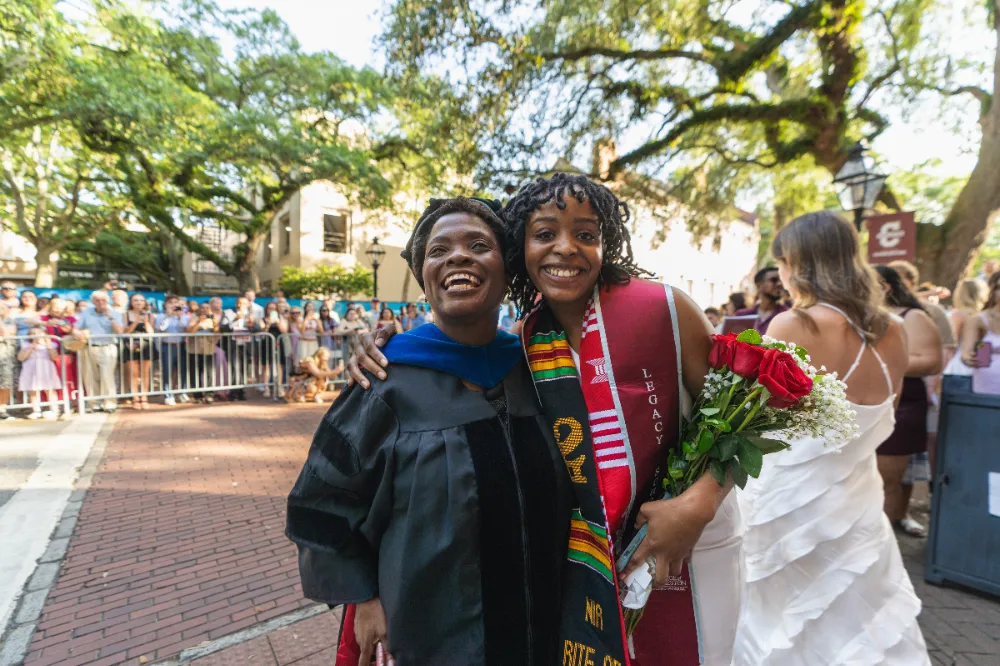
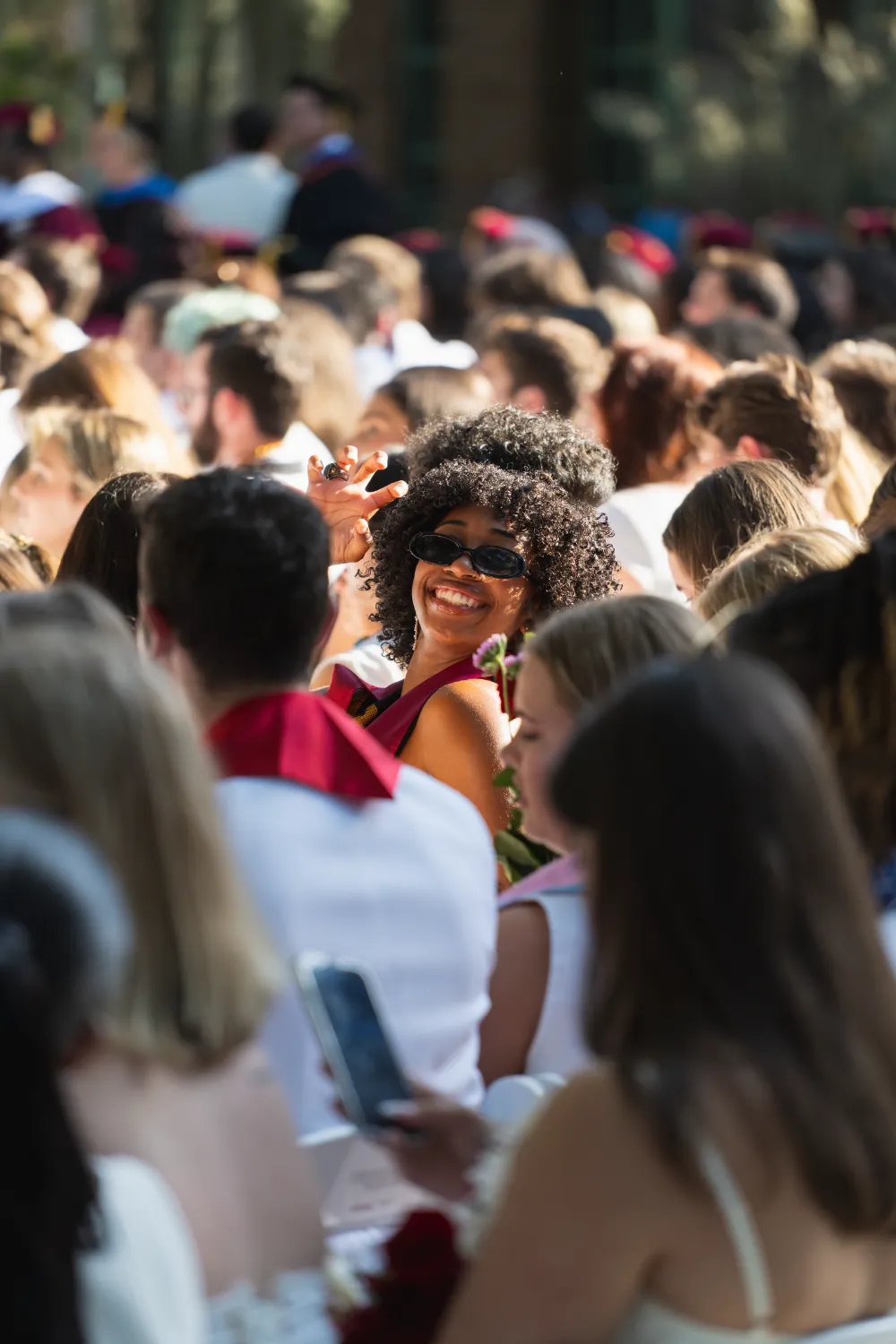
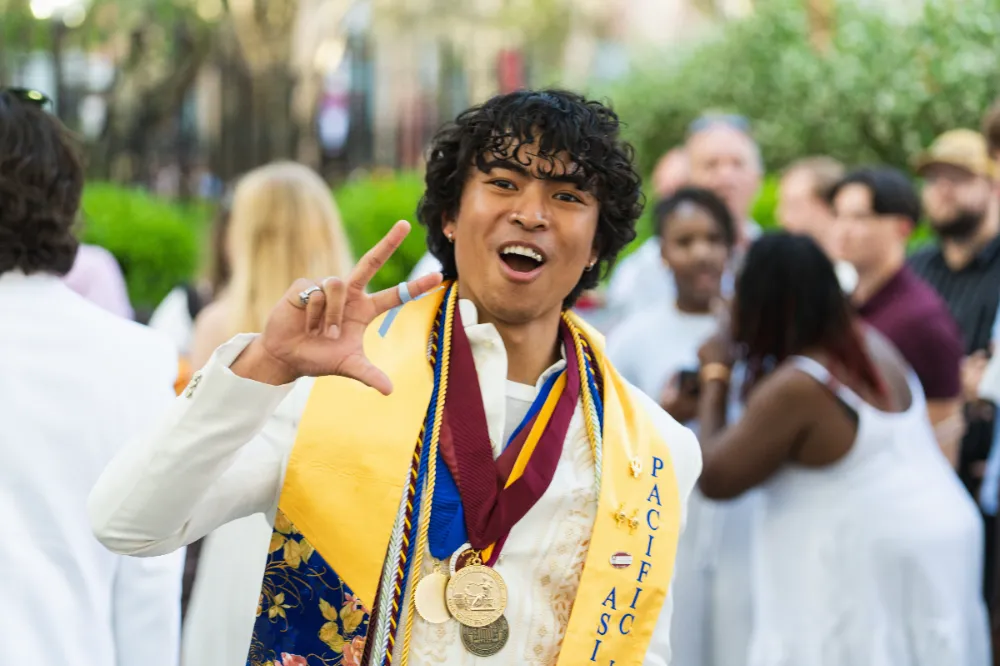
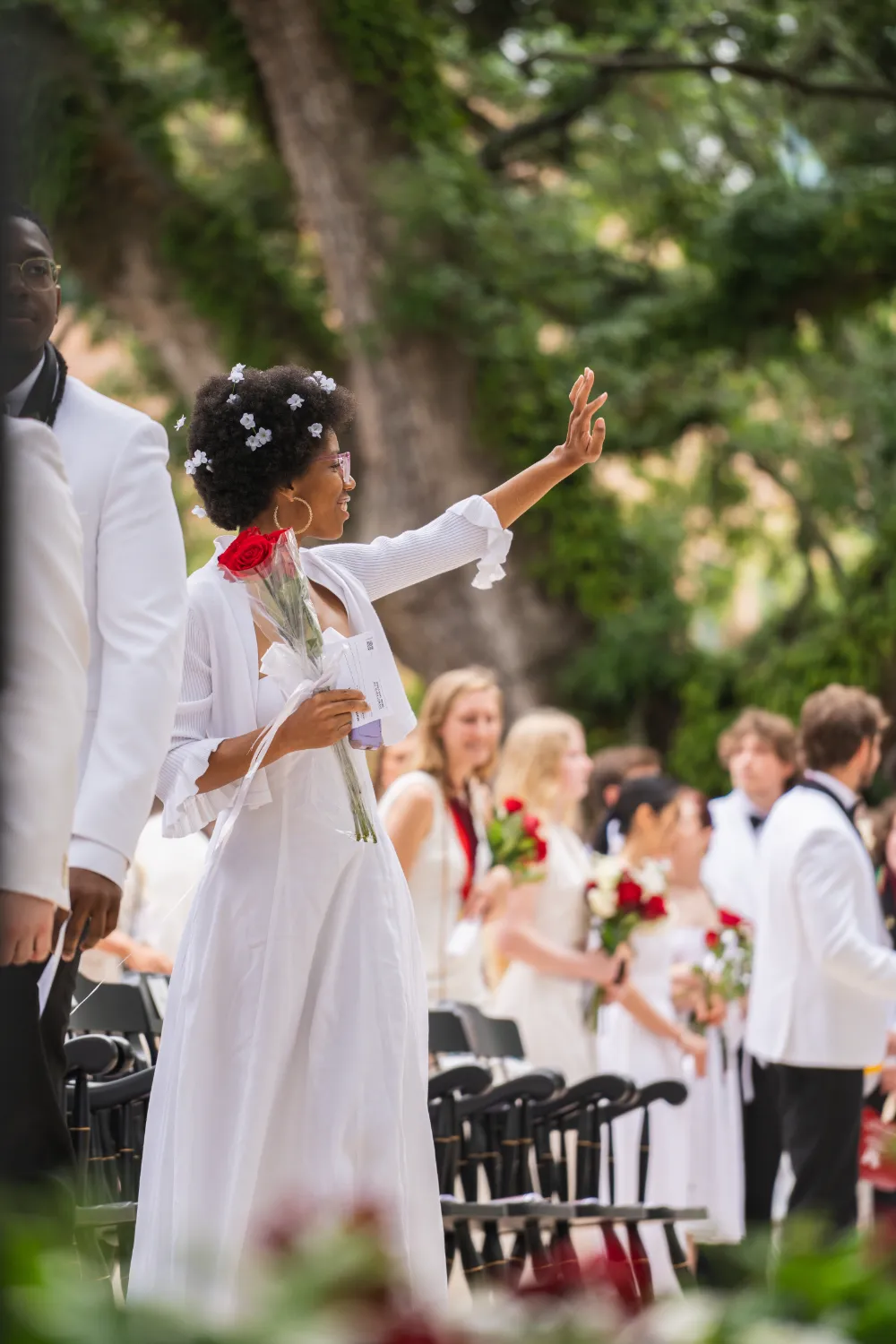
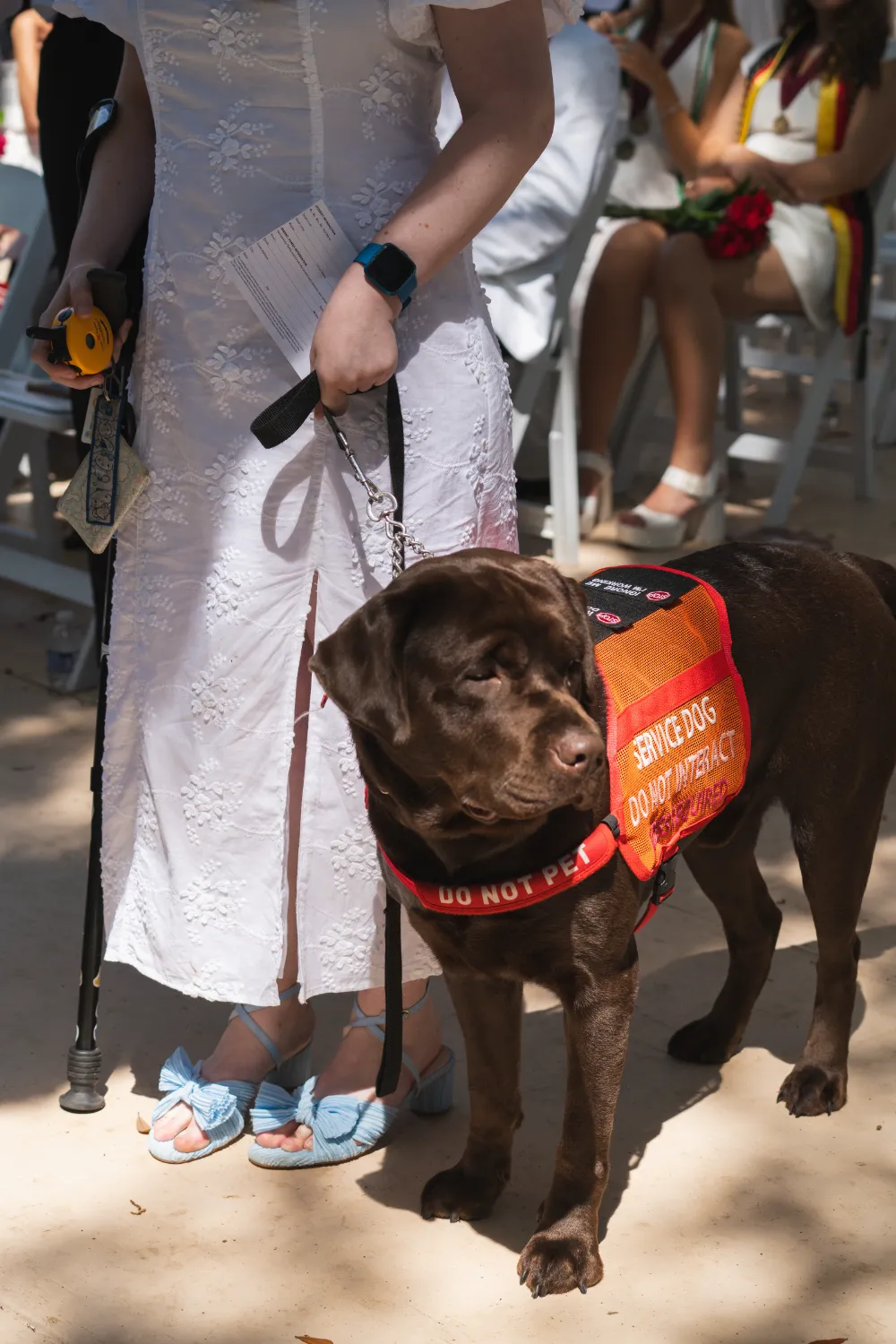
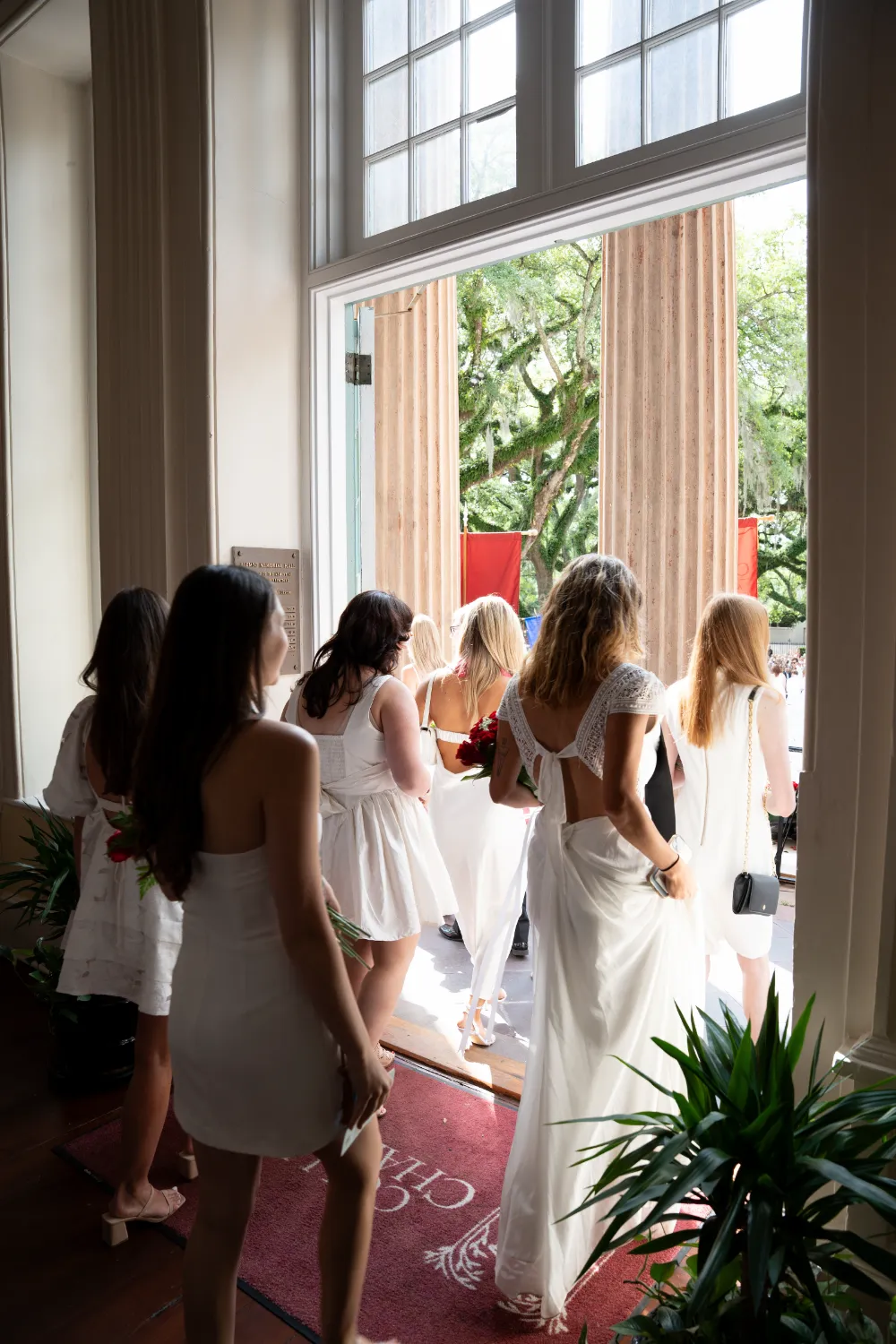
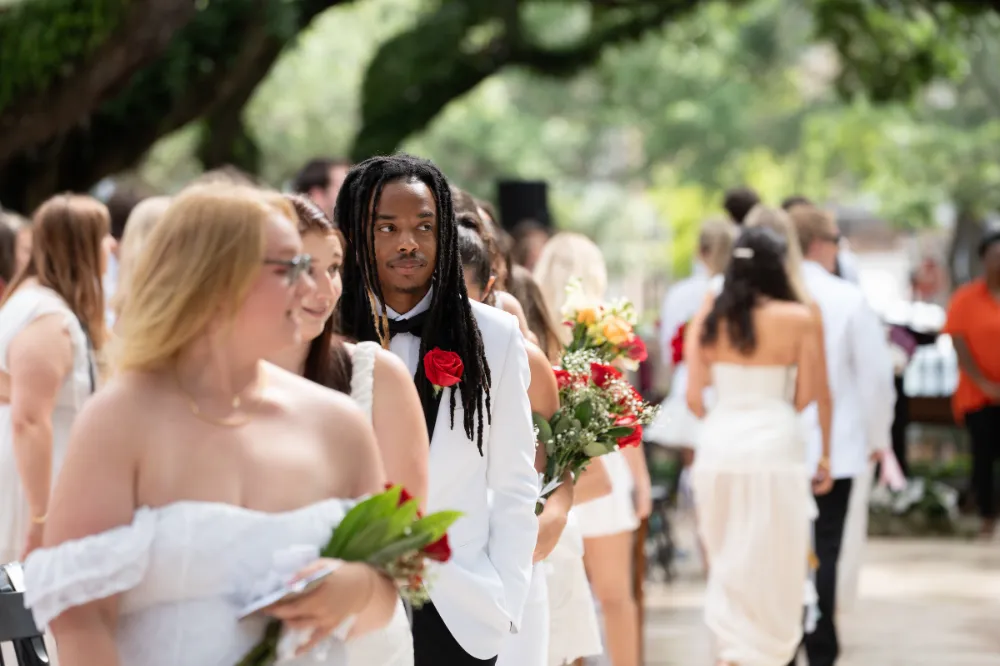
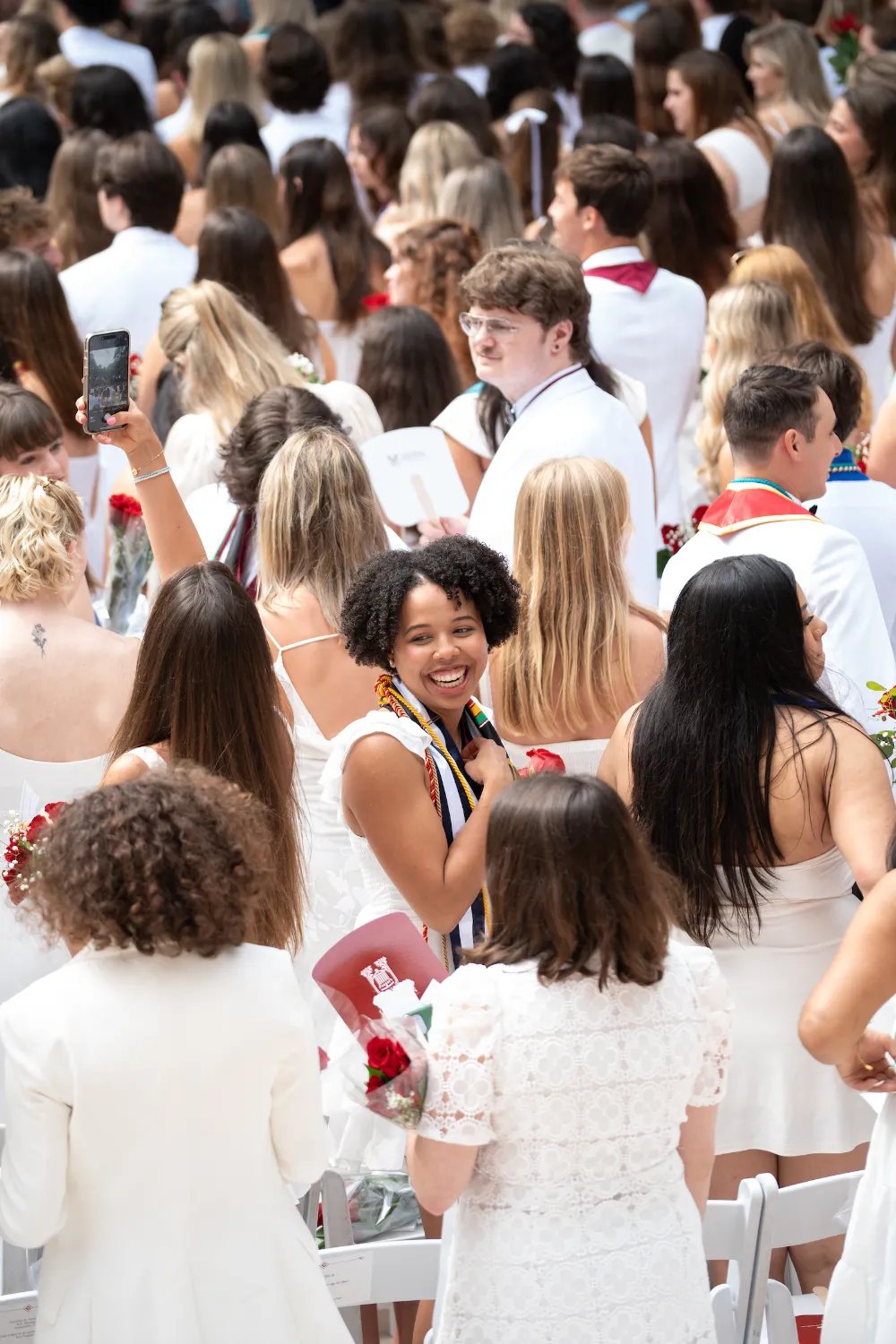
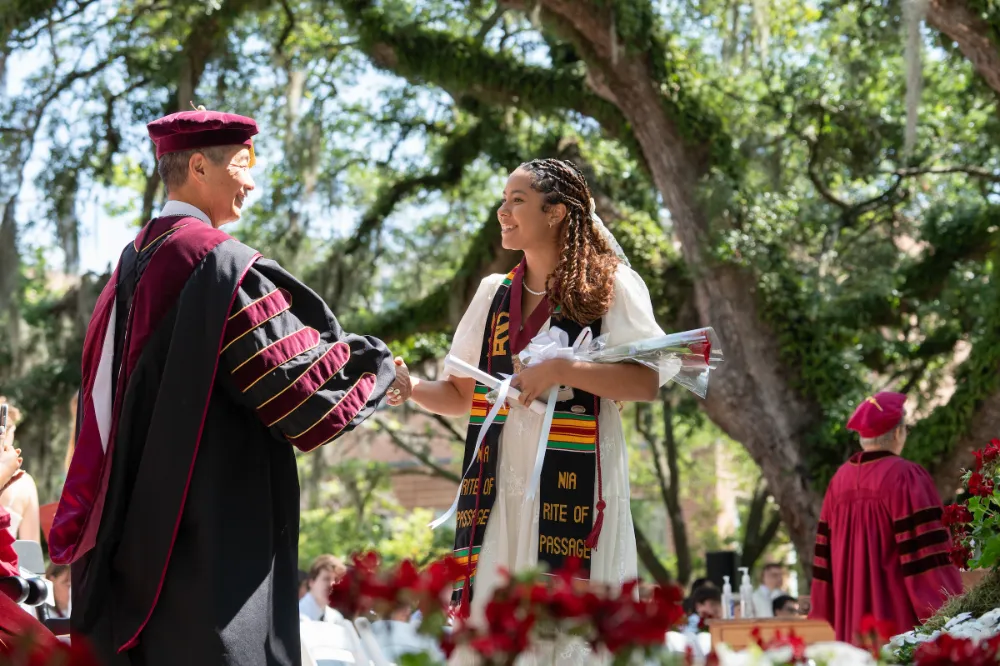
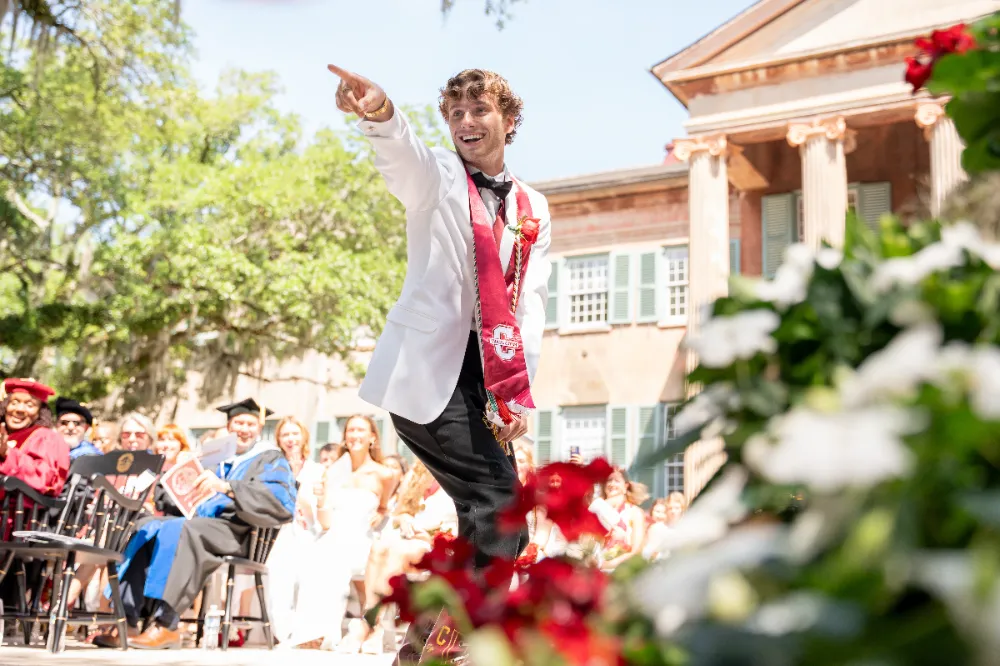
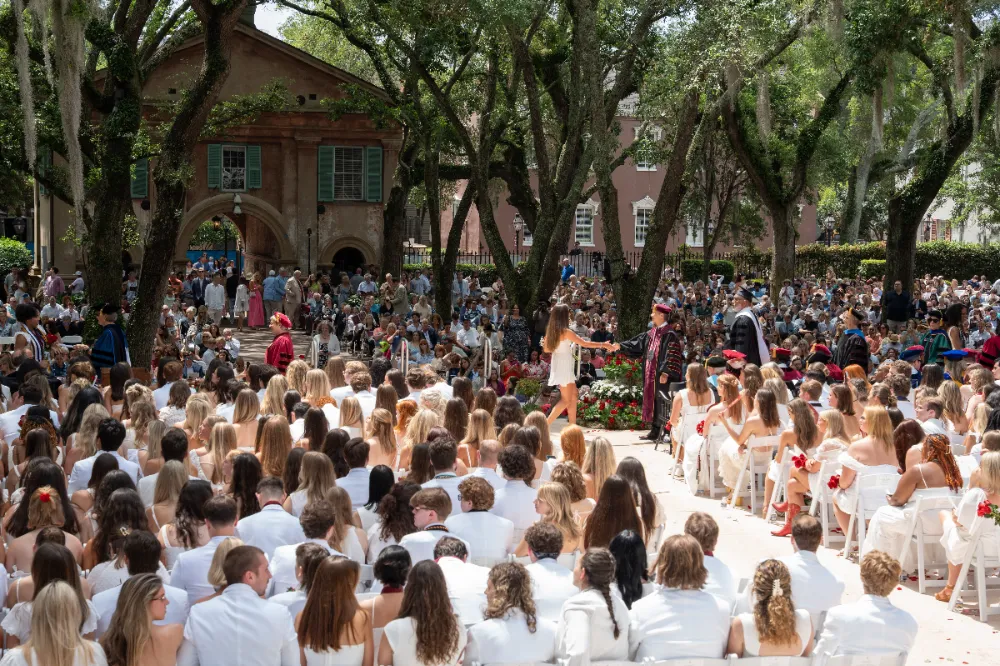
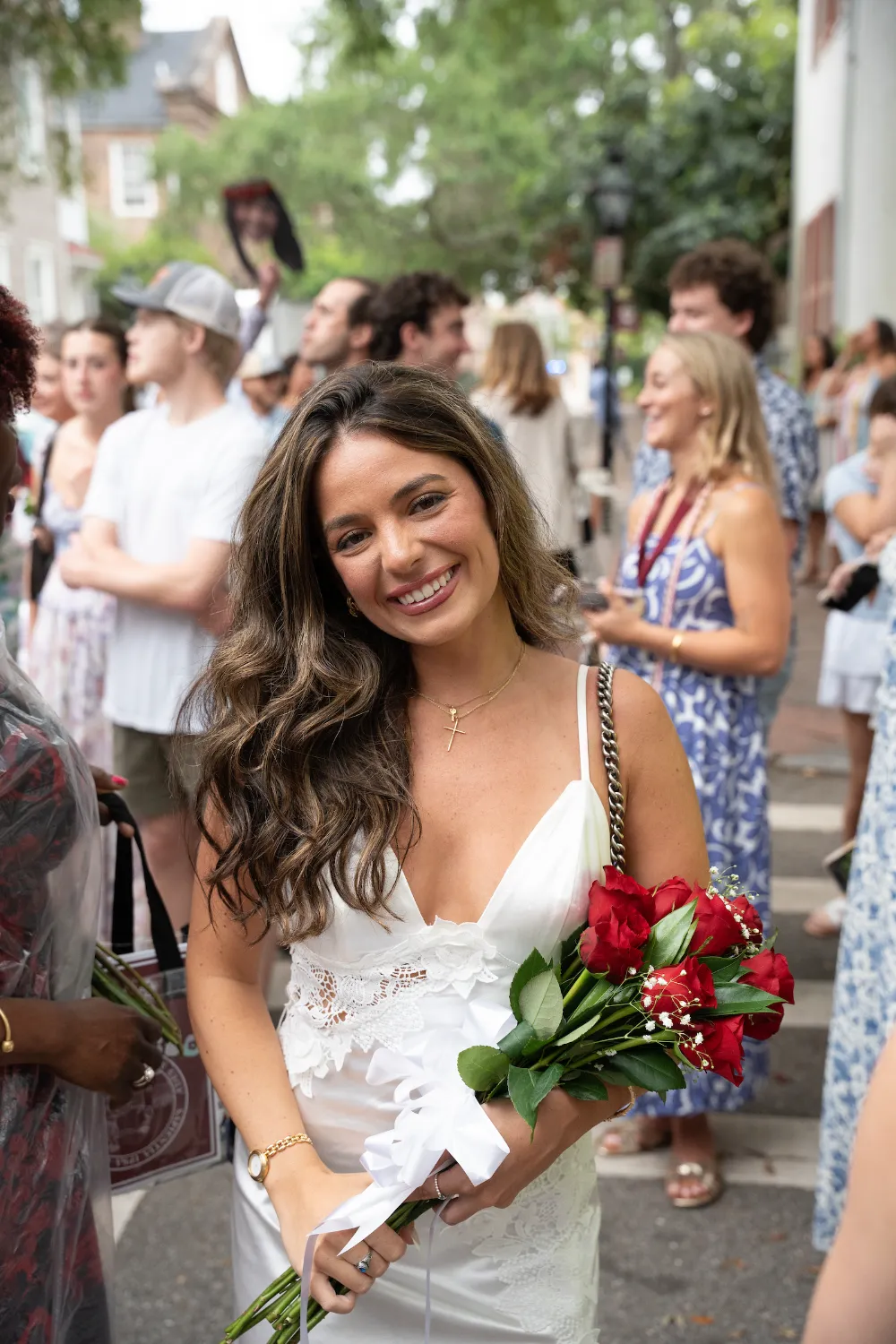
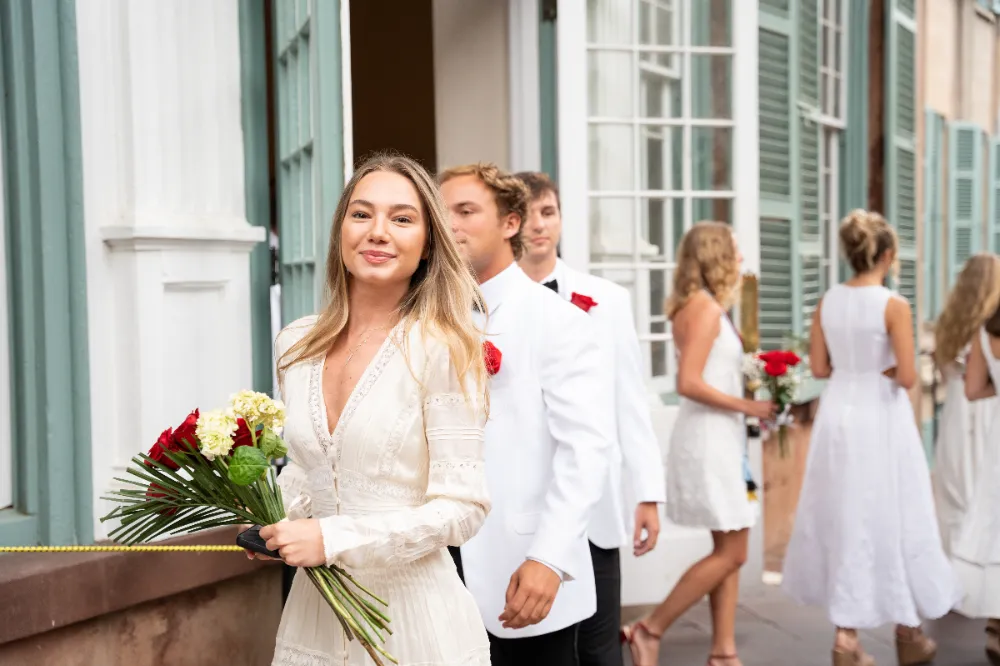
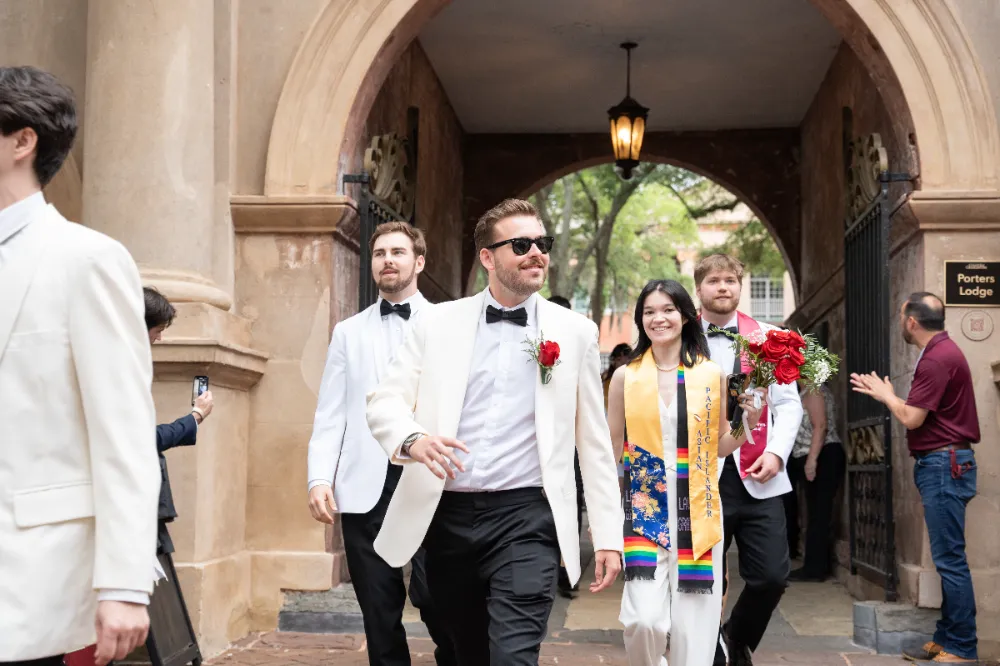
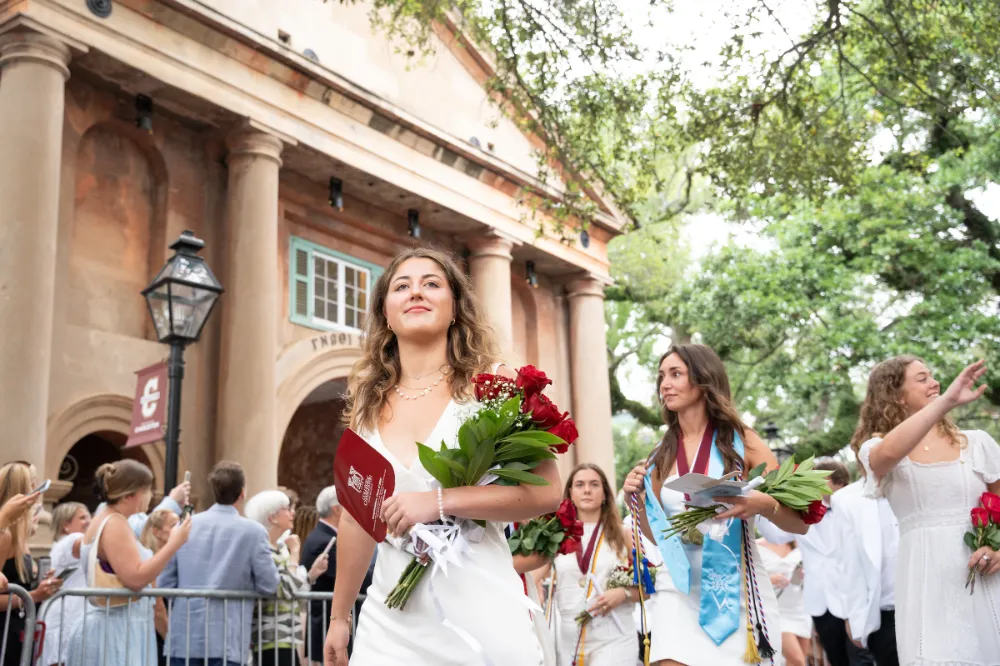
Cistern Crossed!
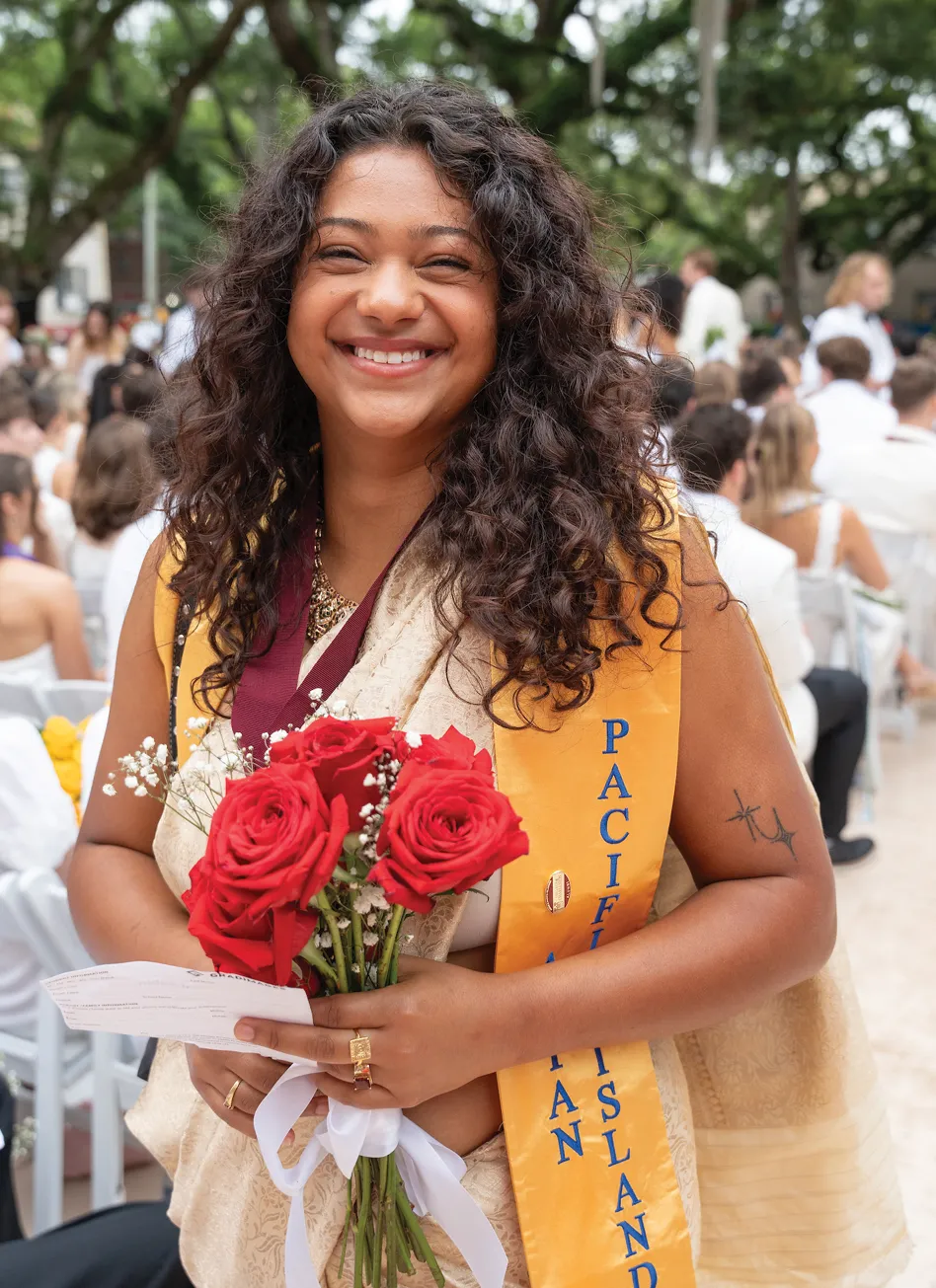

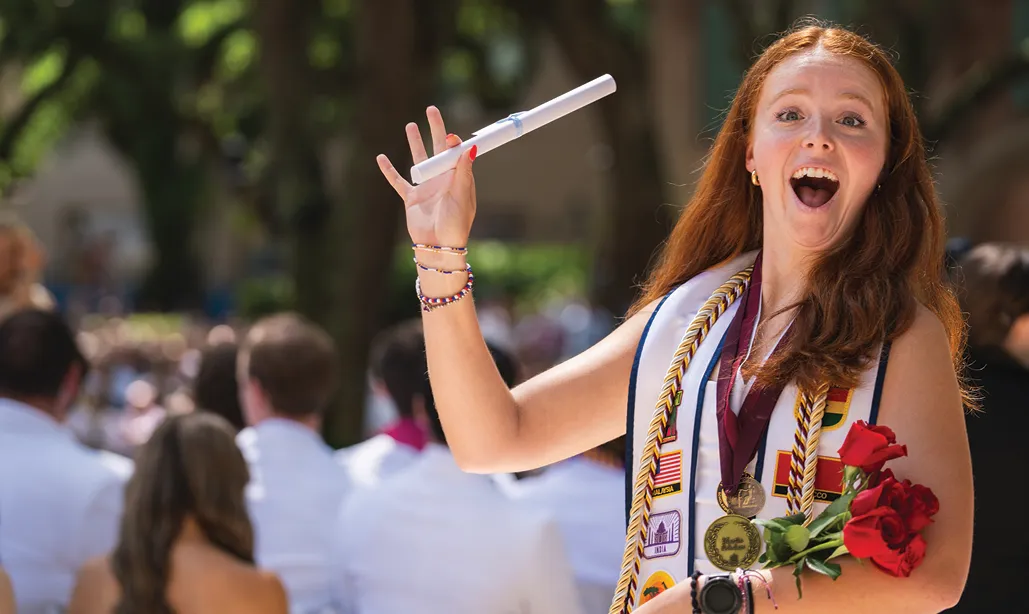
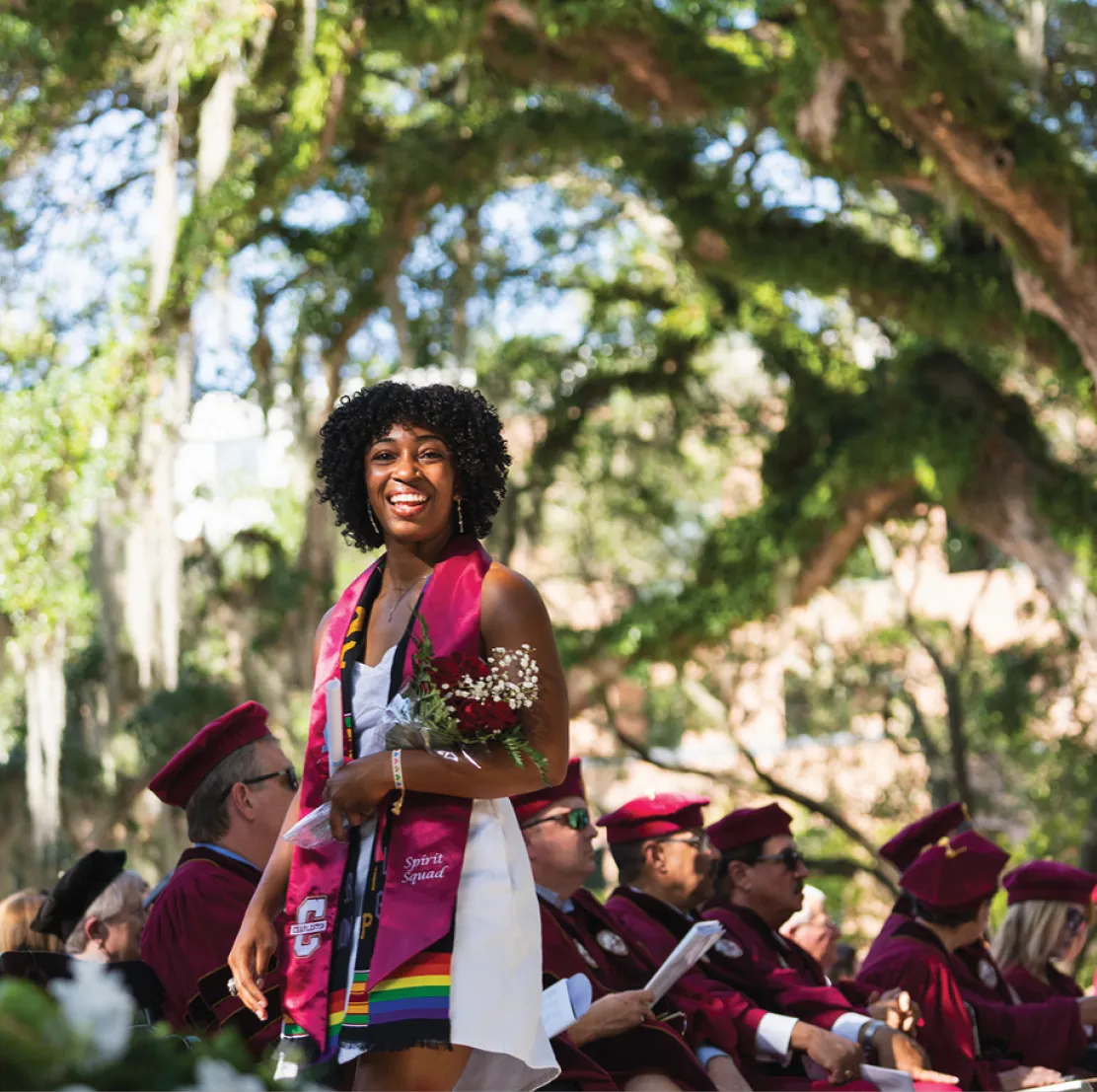
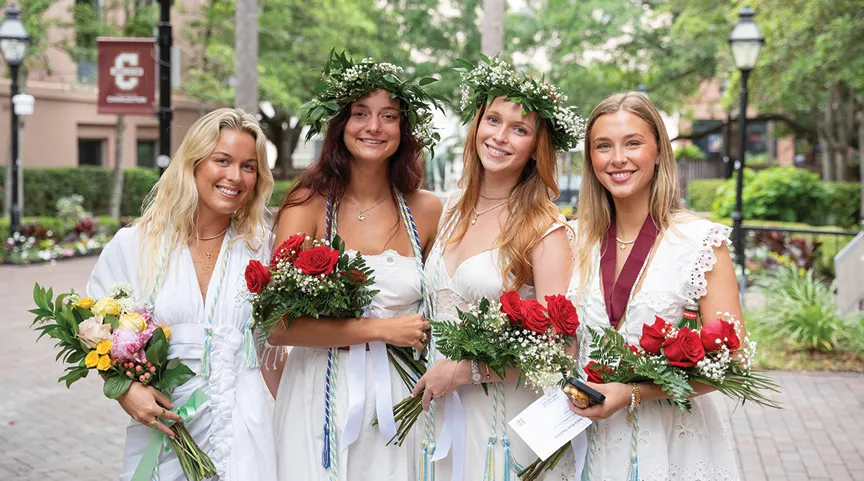
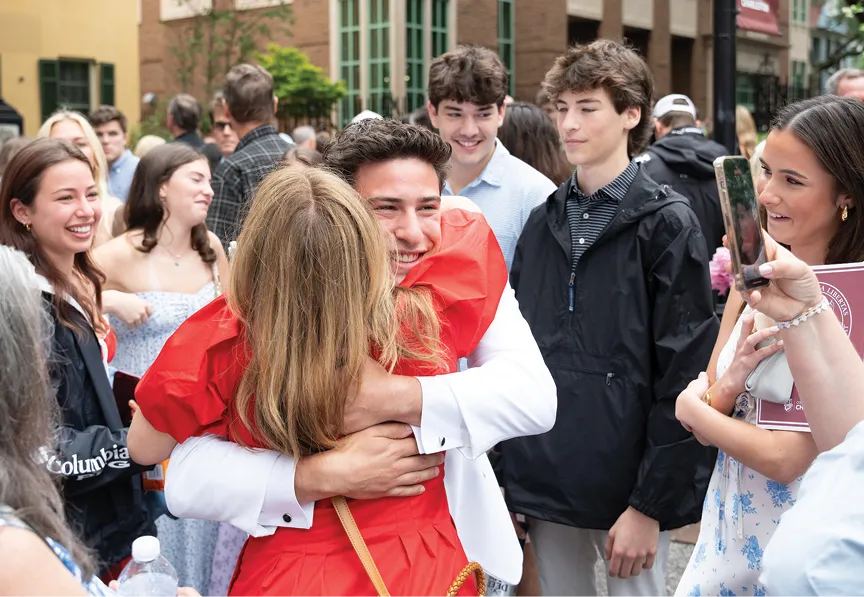
Class of 2025
by the Numbers
(undergraduate degrees)
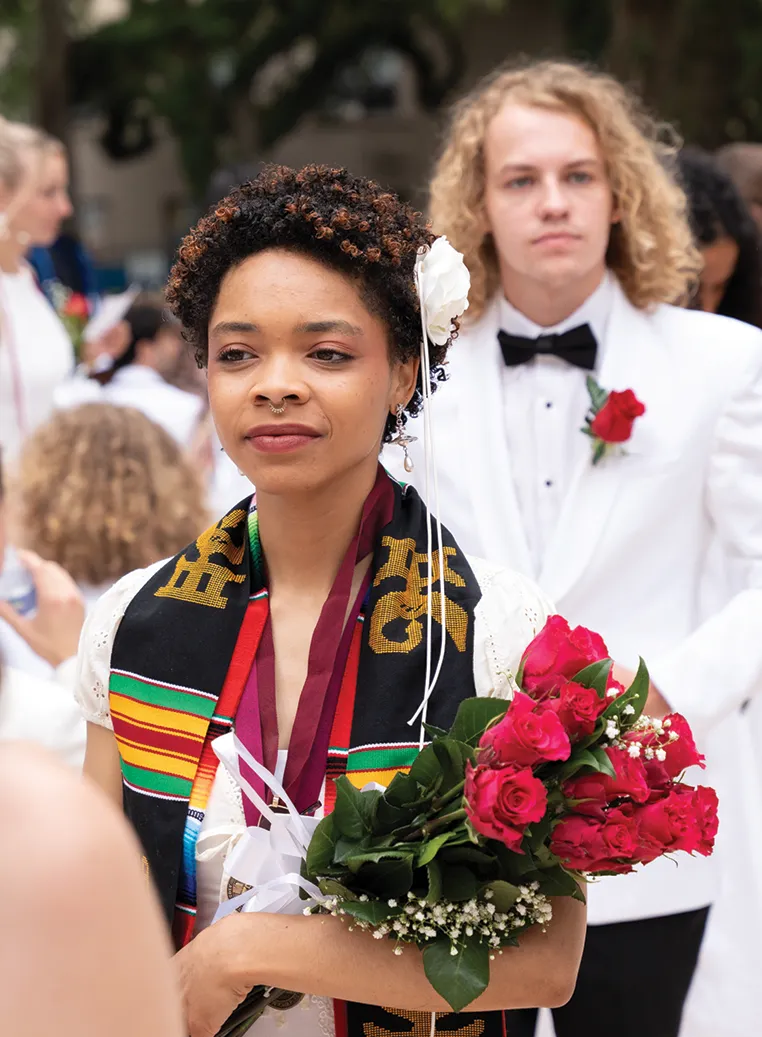
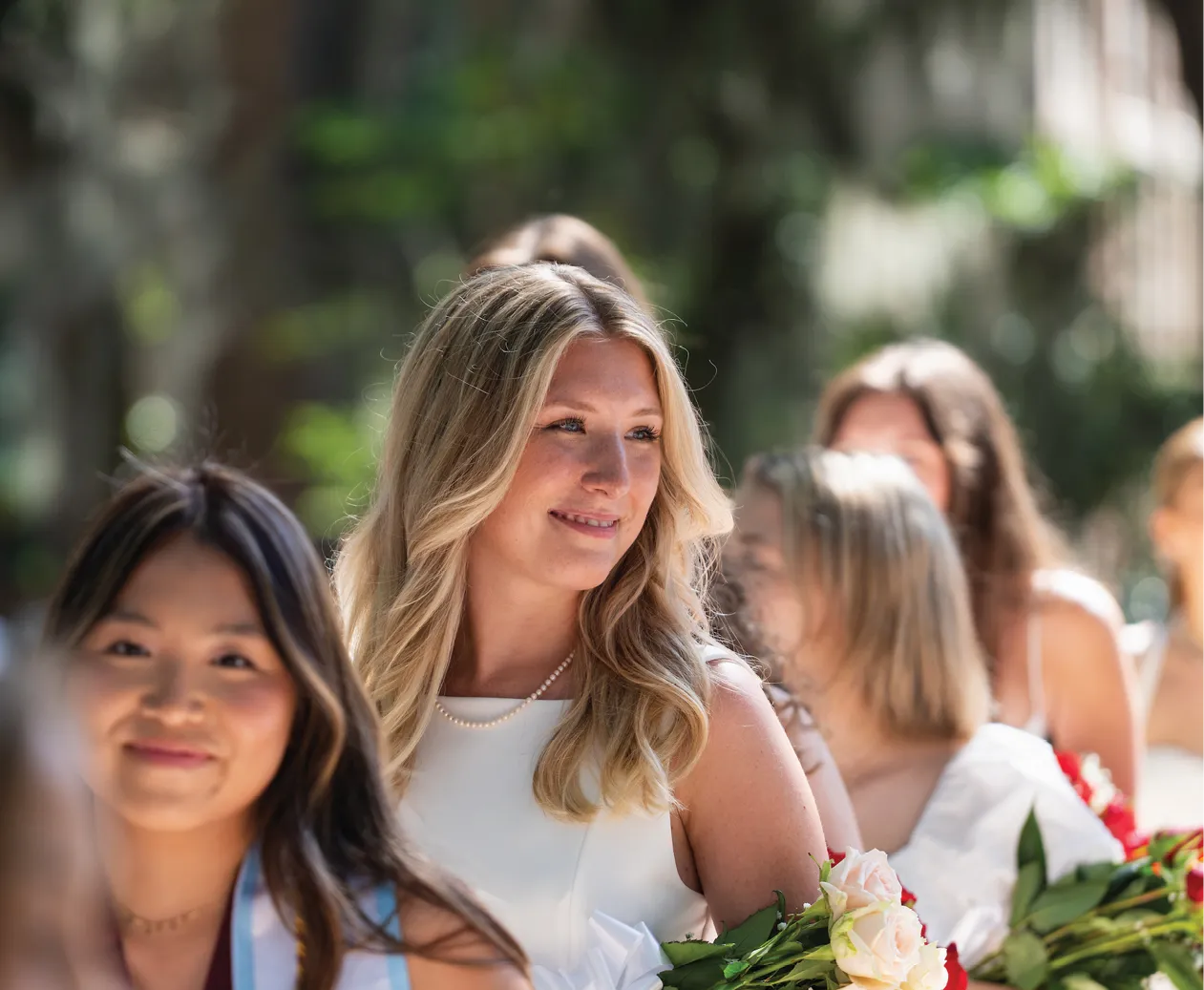
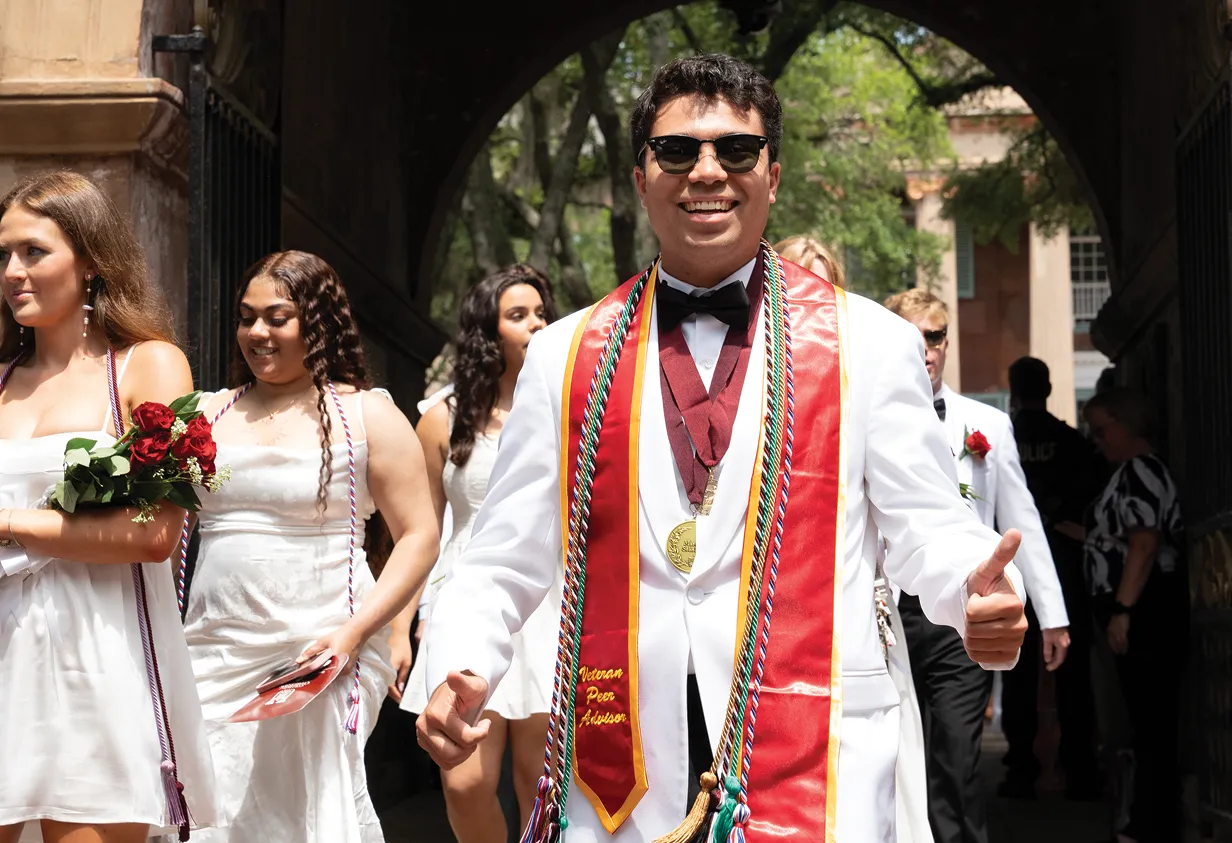

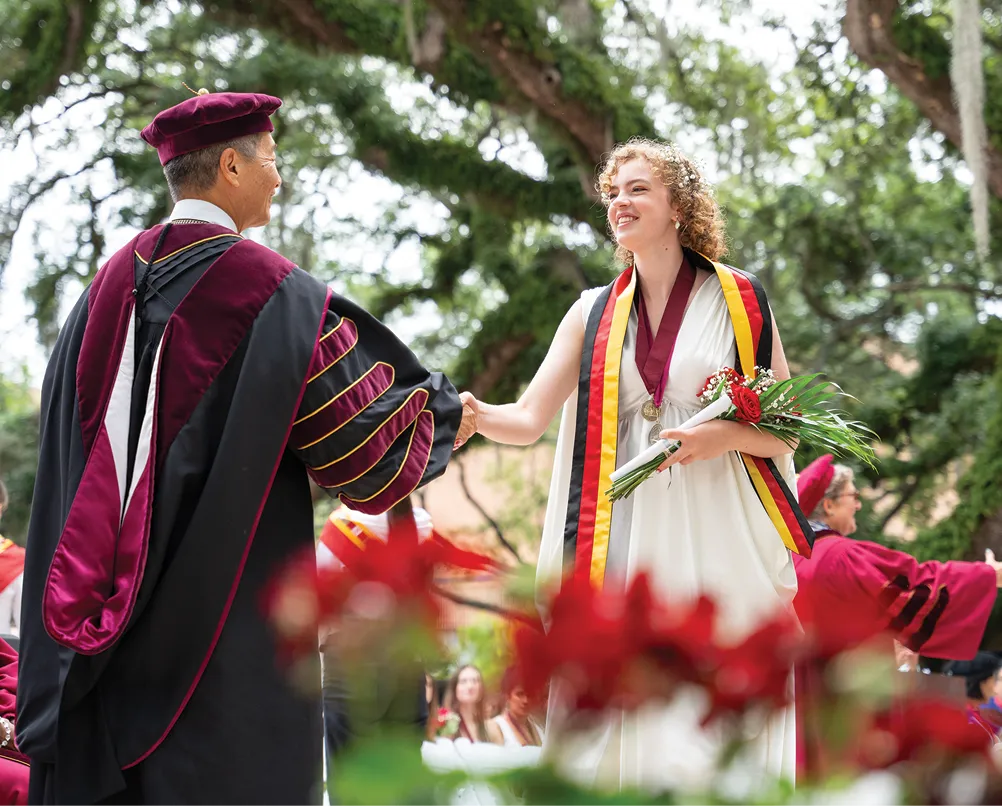
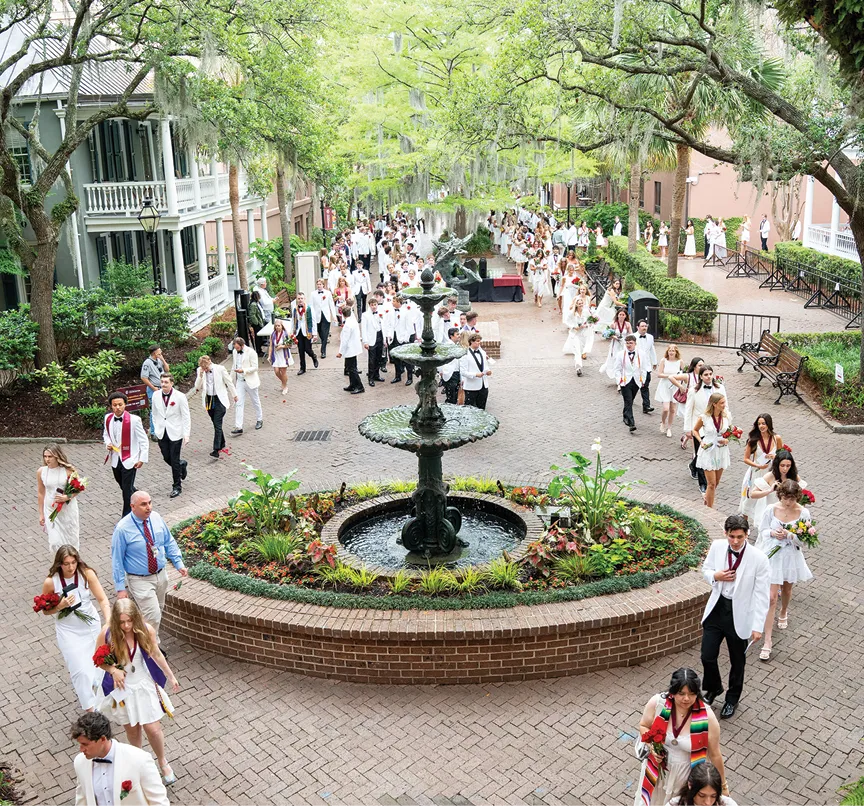

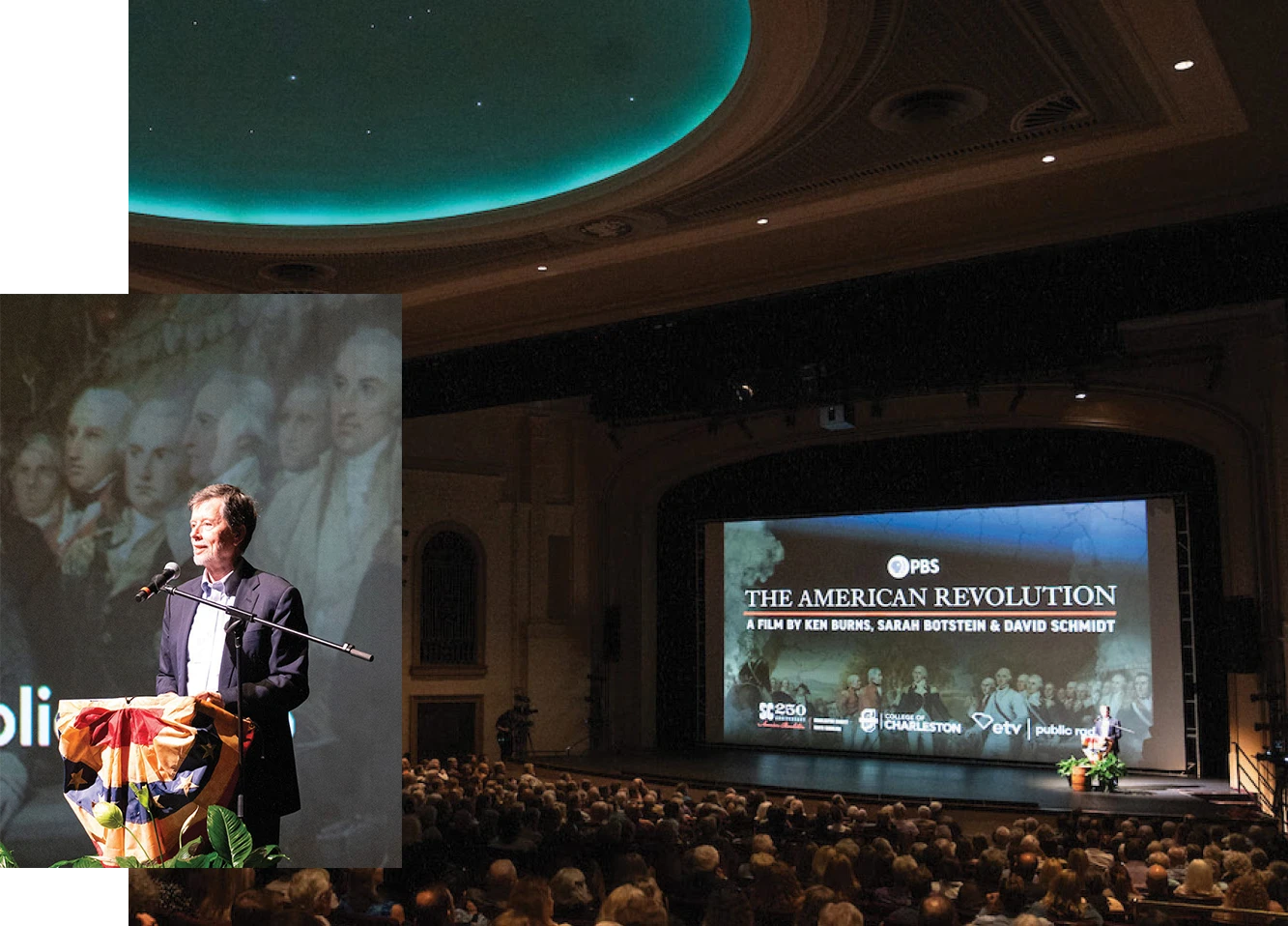
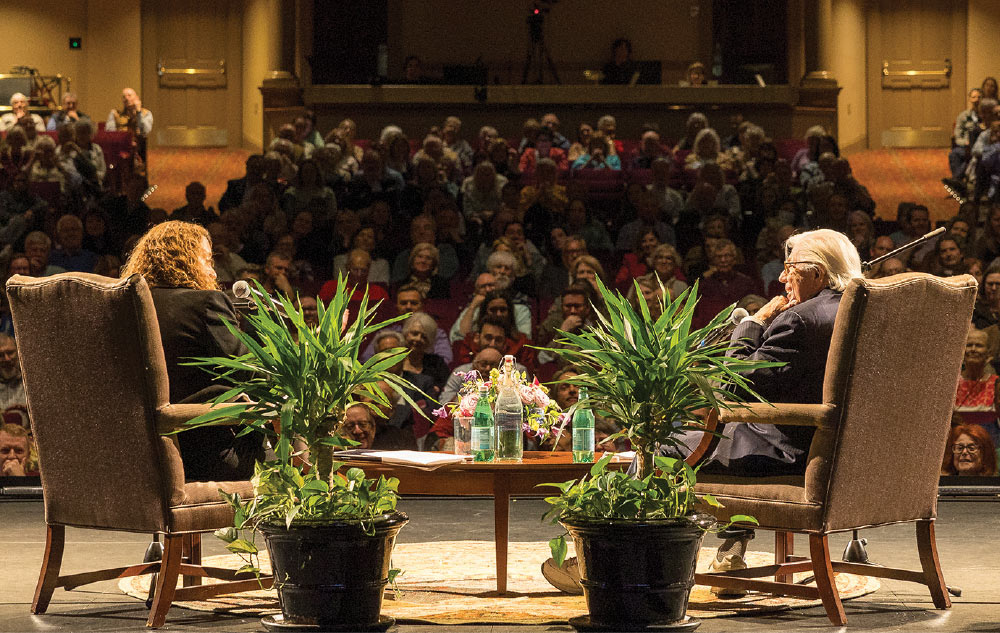
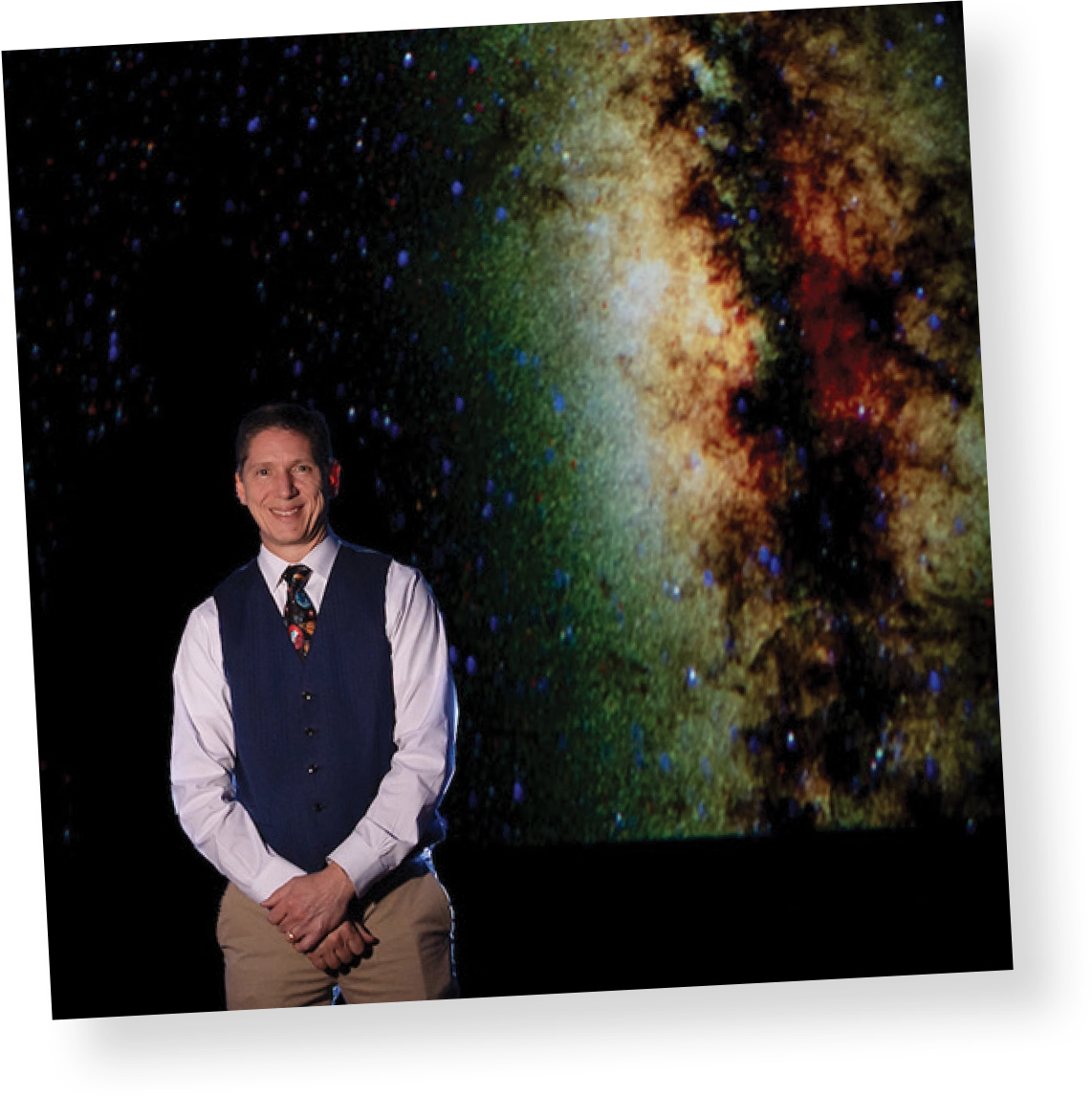
Five Questions FOR Rachael McNamara ’00
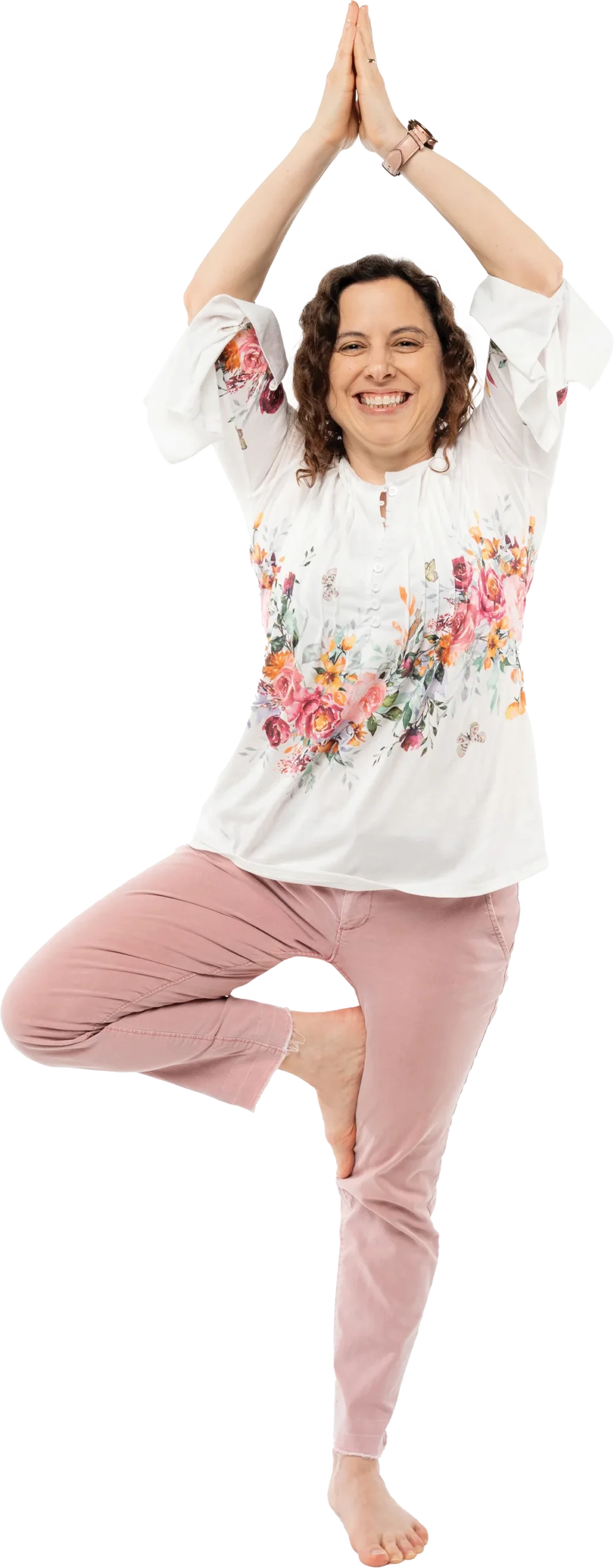
What is wellness, and what is well-being?
Wellness is about the holistic personal choices people make for themselves around wellness, like nutrition, exercise and stress management. Well-being is about larger-scale social and environmental factors like friends, partners and community, as well as where people live, including aspects of their physical environment like green spaces, air, water and safety.
What new programs have you introduced?
We have expanded dog therapy, an evidence-based activity to reduce stress, and also hold weekly meditation, training to increase skills at helping others and, one of our favorites, cooking classes with student organizations. Around a meal, you can see barriers break down and people start to relax. There’s nothing like meeting and bonding over food.
You advise a student-led program called Students 4 Support. How does S4S work?
S4S was created to give students a space to talk with certified and trained peers. In addition to having the opportunity to meet in person, S4S has a texting platform that gives students the ability to seek support and understanding on the go. It’s incredibly impactful for students to have the opportunity to speak with someone their age with similar experiences.
Are we in a mental health crisis?
If you had asked me in fall of 2023, I would have said that we were starting to see positive gains since the pandemic, but this year, we seem to be falling back. We may be in a mental health crisis. Our children and young adults are dealing with a lot that impacts their mental health and wellness. Although it’s easy to blame a generation, if an entire group is struggling, then a question we should ask ourselves is, “What has happened in our society that helped to create the struggle?” There is a correlation between the use of cell phones and an increase in social anxiety, loneliness and isolation. We have also observed that the use of phones has decreased the opportunity for chatting in informal spaces like waiting for a class to start. We are still trying to figure things out, but it seems pretty conclusive that scrolling in general tends to lower one’s mood while writing and reading positive comments can increase one’s mood.
Has student wellness and well-being changed since you were a student at the College?
While we had a version of student life to create a sense of belonging, students’ desire for programming and wellness education has grown exponentially. This growth is due to the awareness of the challenges students face and the needs they express. Nationally, students share a strong desire for a focus on wellness and well-being, and part of the reason is because they struggle emotionally due to challenges that this generation has had to experience, which can impact their motivation and productivity.

Electric Spark
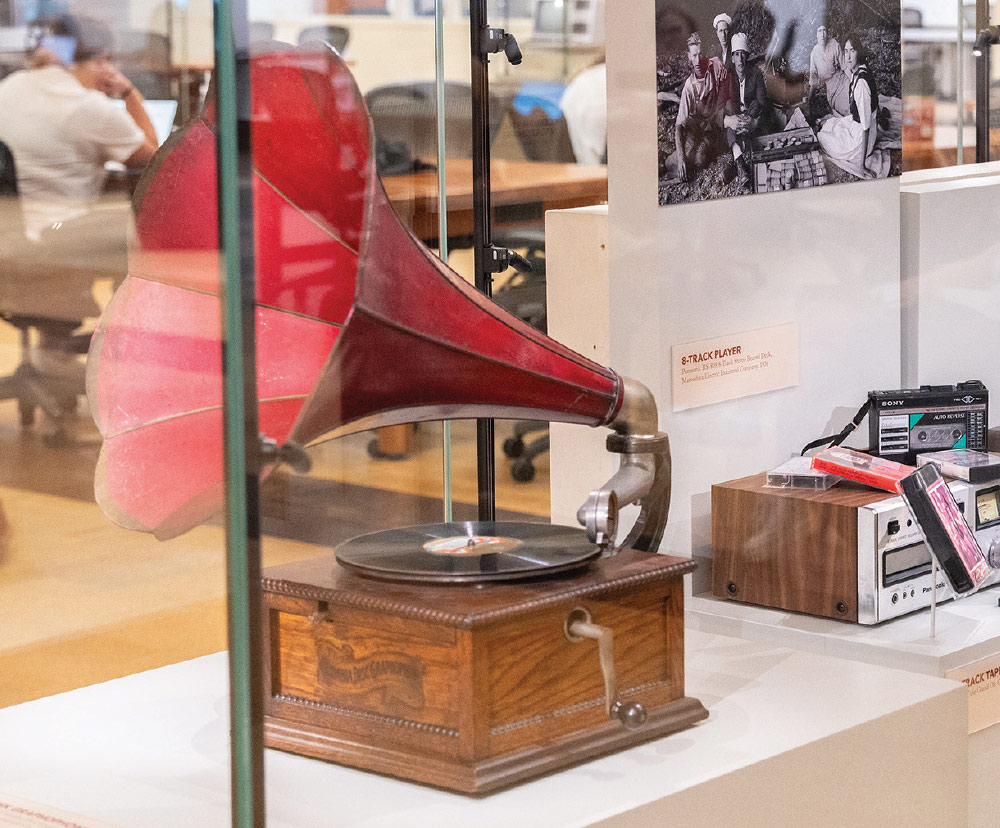
LIFE ACADEMIC
Striking a Chord
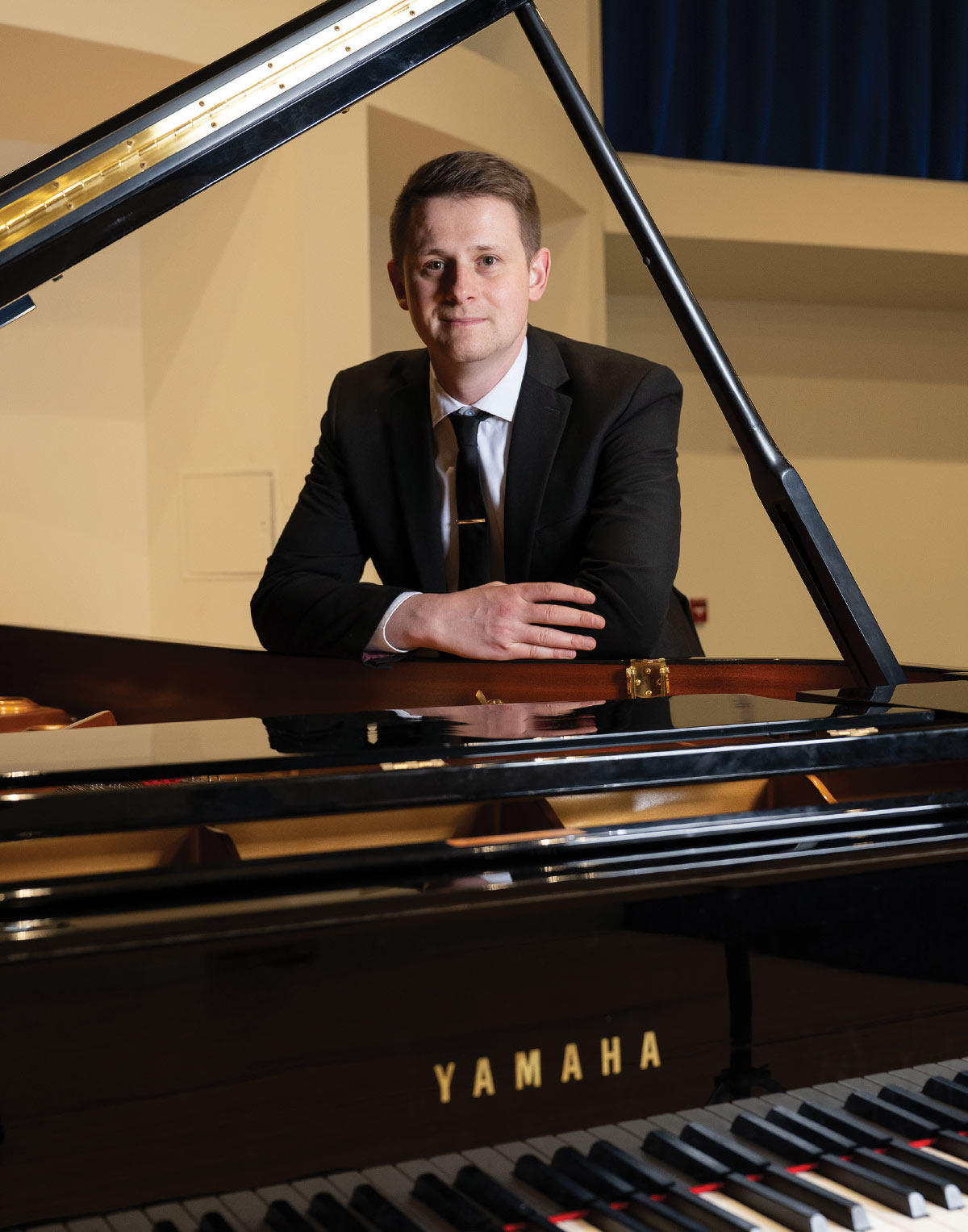
“Four chords in, we have no idea where we’re meant to be,” he says, fingers poised above the keys. “Try to ID that place of home to your ear.”
Chords reverberate throughout the room as the lesson of the early signs of Beethoven’s genius for structural and harmonic daring come ringing through.
For Hicks, there is a lot more at stake than just learning to appreciate music. “The humanities box is not just about appreciation of the arts, but about a style of thinking, critical thinking, that our very democracy relies upon,” he says. “We have an opportunity, as artists and historians of all different types, to emphasize those skills in our classroom teaching, and it is an important responsibility.”
Born and raised on the small island of Guernsey off the coast of France, Hicks began playing piano at age 5, inspired by his great-grandmother. “I was learning to read music at the same time as learning to read English,” he recalls, adding that he returns home often.
After earning simultaneous degrees from both the University of Manchester and the Royal Northern College of Music, Hicks came to America in 2015 for his master’s at Yale and doctorate at Northwestern. He then taught at Whitman College in Walla Walla, Wash., for two years before coming to the College. His performance career has taken him to prestigious venues like London’s Wigmore Hall, and he has recorded multiple albums, including a release this August of Chopin’s Nocturnes.
Hicks also oversees the College’s International Piano Series, which brings world-class pianists to campus for performances and master classes. Department chair Michael O’Brien notes that Hicks stood out in a highly competitive international search not just for his artistry, but for his vision for growing the program.
“As the artistic director of the series,” he says, “Dr. Hicks is a public champion for the piano’s relevance to modern society, not only for the College, but the community as a whole.”
Hicks has already put his stamp on the series, including moving master classes to the renovated Recital Hall and opening them to the public. He’s also secured impressive artists for the 2025–26 program, such as Richard Goode, whom O’Brien calls “arguably the foremost living performer of Beethoven’s piano work in the world.”
In between it all, Hicks manages to practice his craft for 20 to 30 hours a week. Unlike most artists who practice to hone their performance, Hicks performs so he can carry on practicing.
“I love exploring a piece so deeply that I get to know a composer and their experience,” he says. “It teaches you about enjoying the journey, and that skill of learning to enjoy the process makes you a much happier person in life generally.”
Leisure Pursuits
Name:
Ashley “Wallopin’” Walters, assistant professor of Jewish Studies and director, Pearlstine/Lipov Center for Southern Jewish Culture
Hometown:
Randolph, N.Y.
Hobby:
Boxing
Bob and Weave:
My husband has been training and coaching at Hurricane Boxing for several years now. He continually encouraged me to give boxing a try, but I had a very unfavorable impression of the sport, especially the thought of getting punched in the face.
The Hook:
In December 2023, I finally went to a class and loved it. I’ve really fallen in love with this beautiful, crazy and humbling sport.
Decision:
I recently lost my sister-in-law at the age of 41 for an unknown health reason. Her premature death really shook me to my core and made me start prioritizing my health. It’s what prompted me to finally set foot in the boxing gym. Boxing is truly unlike any other workout, and my fitness has improved dramatically.
Promoter:
At Hurricane Boxing, we have one of the largest groups of women boxers in the state and a fantastic community of women supporting women inside and outside of the ring. The Hurricane Boxing Foundation and coaches like Michael Golemis have dedicated countless hours to building up the sport of boxing, especially among underprivileged youth.
Purse:
I competed in the 2025 Battle on the Bricks charitable tournament to fight for a cause that is bigger than myself. The real fighters are the children fighting for their lives at MUSC Children’s Hospital, the veterans of the Warriors Surf Foundation and the student-athletes (many of whom take my classes) who train day in and day out to compete on behalf of the College.
Literary Pursuits
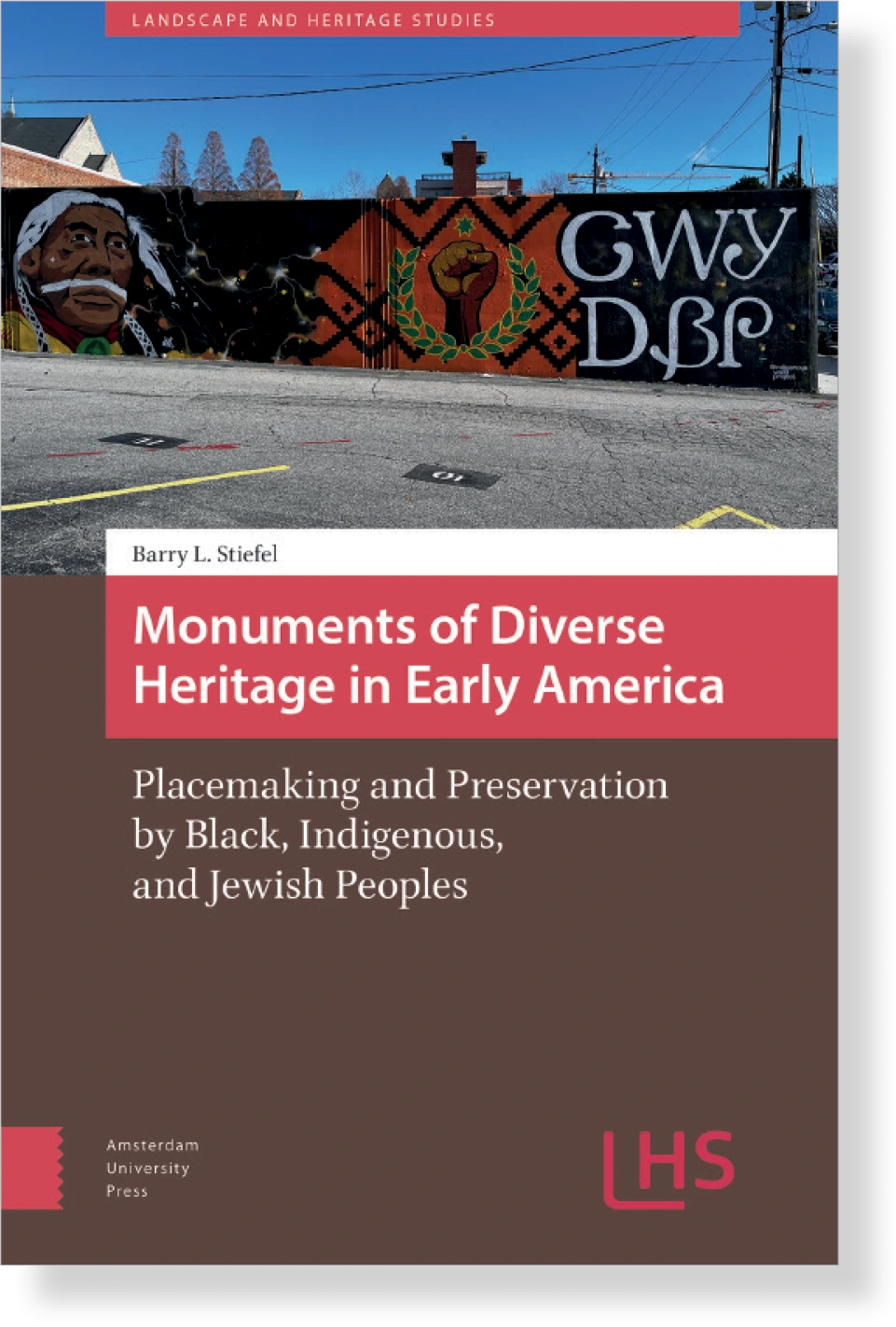
History is preserved through stories. But some stories – particularly those of minorities – have a history of not being told.
Seven years ago, Barry Stiefel noticed this pattern of silence in his research on the preservation of minority historic sites within the Black, Indigenous and Jewish communities. The widespread closures during the pandemic and the antiracist protests sweeping the country further convinced him that these voices needed a platform to speak. Stiefel started weaving together his various essays into one cohesive book that would communicate the efforts of these groups in preserving history.
“In essence, this book project is a response to the growing recognition of the need for a more inclusive and equitable approach to historic preservation,” says Stiefel. “It aims to shed light on the often-overlooked contributions of Black, Indigenous and Jewish communities and to advocate for preserving their heritage on their terms.”
The project required extensive research at various historic sites and archives across North America and Europe. From Charleston to New York, Canada to the Caribbean, Germany to Gibraltar, prestigious institutions to storage closets, Stiefel had quite the adventure scoping out primary sources and hidden gems for his book.
“One of the most profound experiences was learning about my own ancestors and their contributions to a historic site that has not yet received the preservation attention it deserves,” he notes. “This personal connection added a layer of significance and urgency to my research, making the project deeply meaningful on a personal level.”
Stiefel’s research also unearthed fascinating stories about well-known historic sites. One of these is the story of Maria, an enslaved woman from Augusta, Ga., who donated her own money in 1859 to help save George Washington’s home. “This act of generosity and dedication, despite her own circumstances, was incredibly moving,” says Stiefel.
But stories like Maria’s are often overshadowed. That’s exactly why Stiefel took on this massive project: to provide a lamppost that finally lets this hidden history shine.
“Every culture has its own ways of preserving the past,” he says. “I encourage readers to rethink traditional narratives and consider all groups’ diverse experiences and contributions in shaping American history, highlighting the importance of preserving these histories to create a more inclusive and equitable society.”
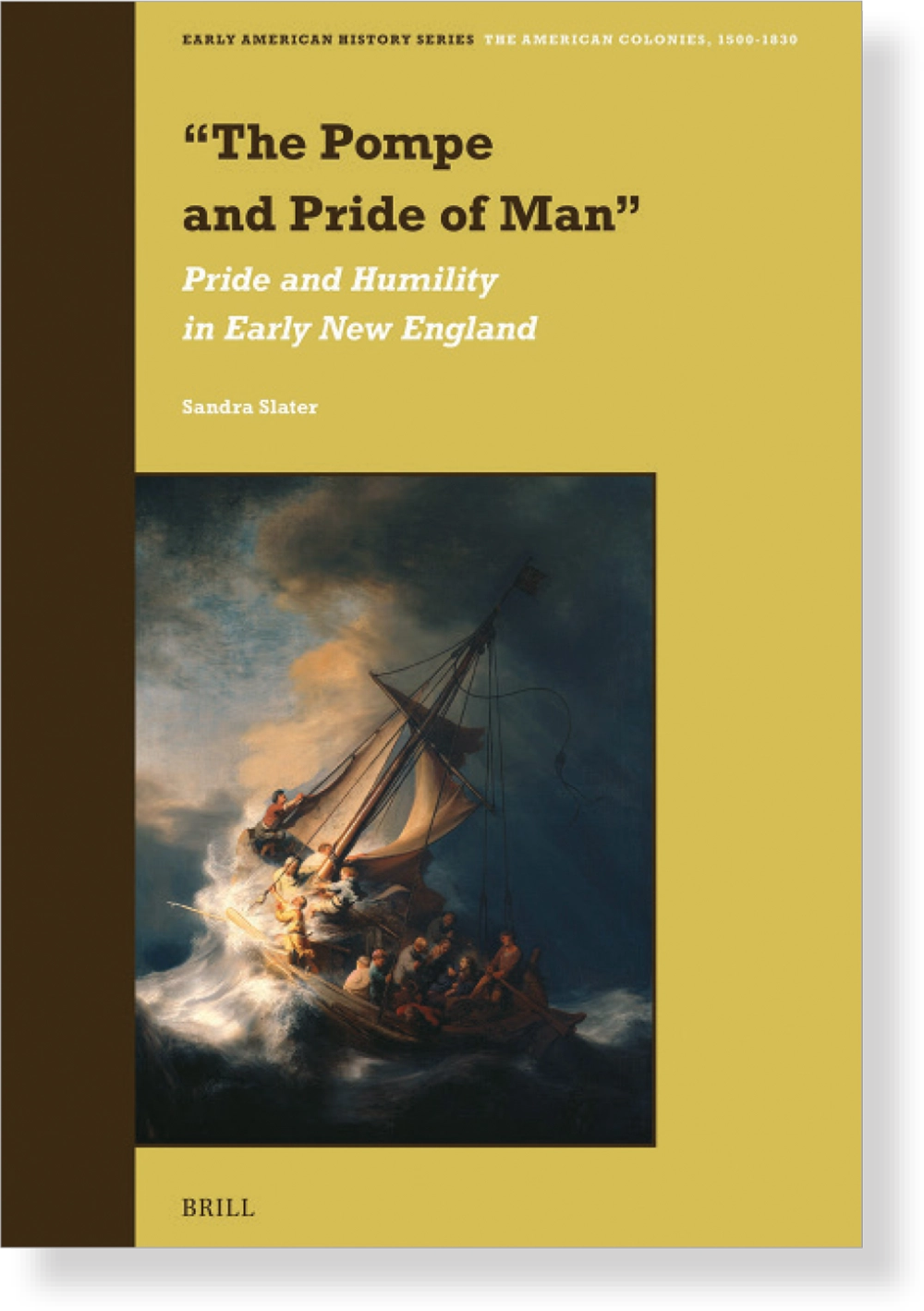

My Favorite Reads
Explainer in Chief
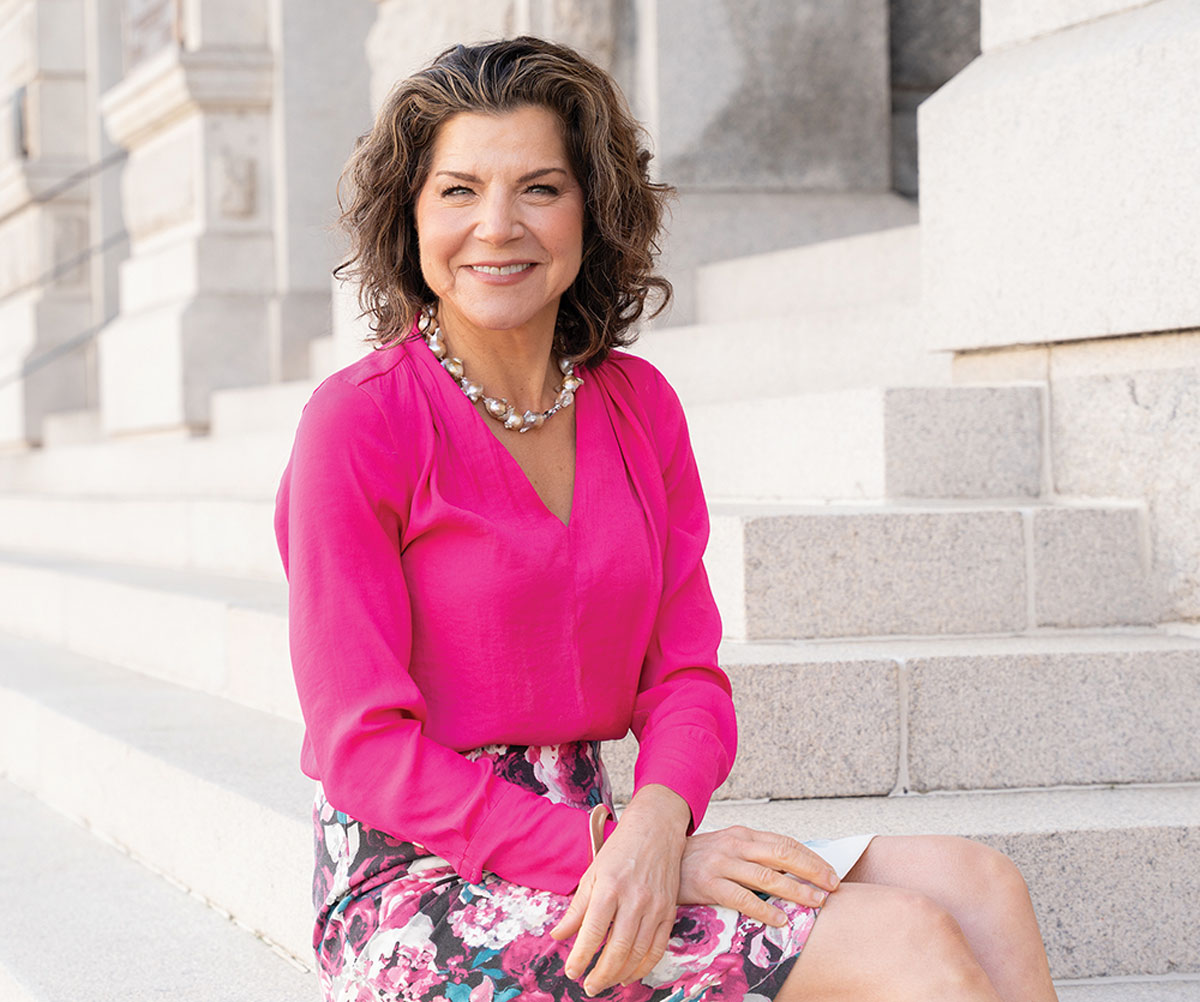
So, it should come as no surprise that after graduating with a political science degree from Wellesley College in 1995, Wofford enrolled in Duke University School of Law.
Everything was going according to plan. Until it didn’t.
“It’s a weird situation, but I figured out over halfway through law school that I didn’t want to be a lawyer anymore,” she confesses. “There was just a gut feeling that this was the wrong path for me.”
She decided to pause law school for a year to figure out what she wanted to do. The pause did not work, so she returned to her original plan. A year later, she started taking classes again and in 2001 graduated magna cum laude with a law degree but no job or plan.
No problem.
She was offered the opportunity to teach an American government class as an adjunct instructor at the University of South Carolina Upstate. She knew she had found her true calling on the first day of class.
“I fell in love with teaching right then and there,” she says. “That is how I got on the path of becoming a college professor who taught and studied law instead of a practicing lawyer.”
Soon after earning a doctorate in political science from Emory University in 2011, Wofford accepted a teaching position at the College.
It has been a great fit.
Not only is Wofford a professor in the political science department, but she is also the director of the prelaw advising program at the College. Her unique educational training helps her maneuver both fields easily. Her research interests in American politics and the U.S. legal system have come in handy when examining the many complex issues that have recently been dominating the news cycle.
Wofford believes this is a historic time in America because of how political power is now exercised in this country. We’re in a critical period where many institutions are being tested, she notes, and American politics is extremely polarized, but one of the areas of hope she sees is with the courts.
“The judicial branch is doing exactly what it’s supposed to be doing, which is calmly, slowly and rationally think about how political power should be exercised in this country,” she says. “The system continues to operate, and the people are bringing cases to the courts. Courts are hearing the cases and making very legally sound decisions.”
And rising above politics, as they are supposed to do. “They are expected to use rationale, logic and legal thinking to come to the best decision, regardless of what chaos is happening in the political world. I think they’re doing that.”
Wofford’s expertise on the Constitution has not gone unnoticed. News organizations such as The Washington Post, The New York Times and National Public Radio have reached out to her for analysis of current events. Her legal and political writings have also been published both nationally and internationally.
“So many people thought I was crazy to walk away from the legal path, but I would never trade that for what I get to do now,” she says. “It’s a bit of a cliché, but teaching young people to better understand politics and the law is my small way of making the world better.”
Making the Grade
Ahead of the Pack
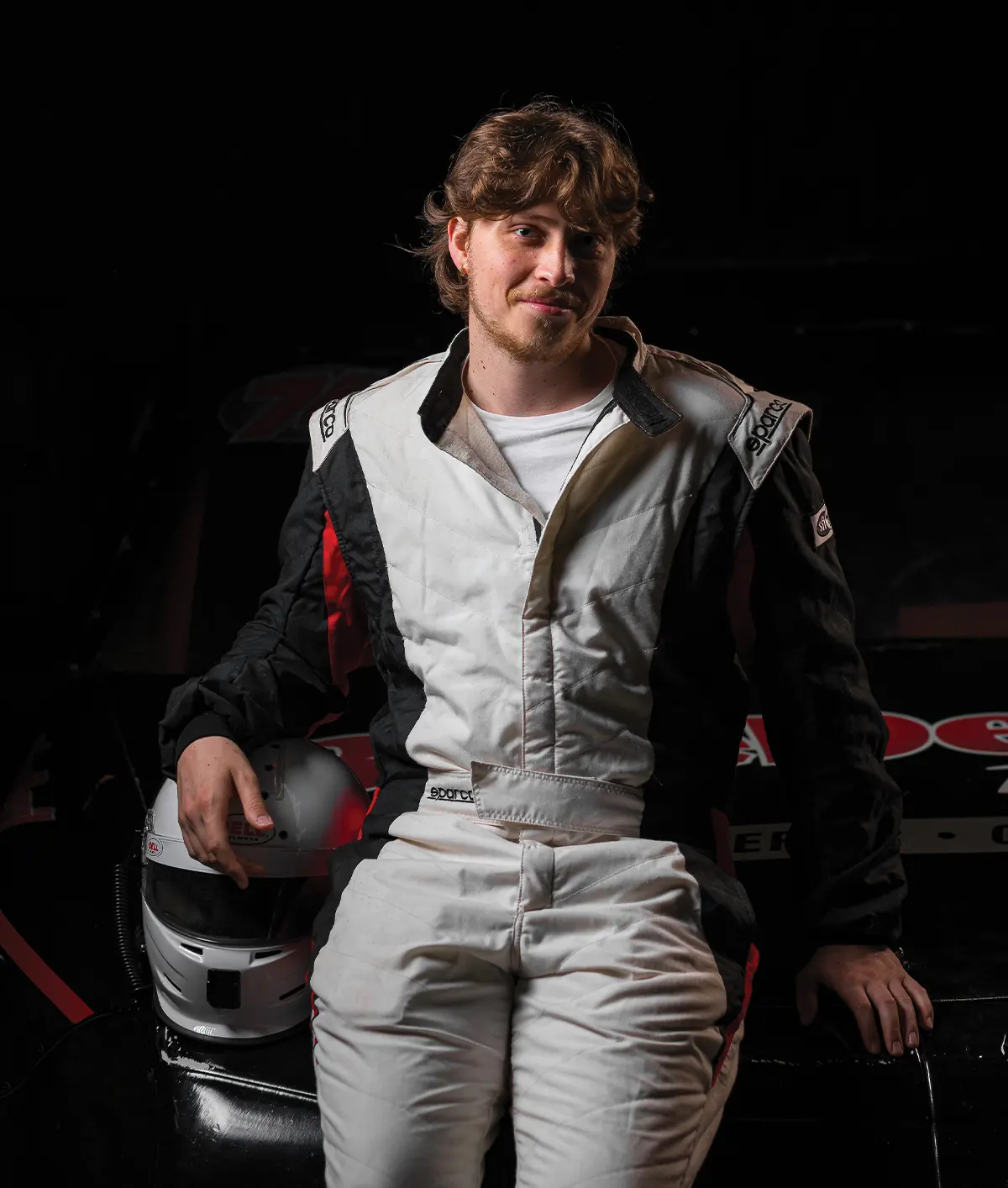
“Well, I didn’t crash, and I didn’t come in last,” says Butler, who has been in love with the racing scene since he visited a Porsche factory in Germany with his dad. “My dad is a Porsche fanatic, and I traveled to races with him all over the United States.”
Butler valued the bond he developed with his father, a former animal conservationist with the World Wildlife Fund. He particularly enjoyed collaborating on articles for regional Porsche Club magazines; his father wrote, and Butler took the photos.
While Butler’s father mostly raced Porsches in his spare time, he once raced in the Baja 1000 – which crosses the Baja California desert – on Bill Stroppe’s Ford Bronco team.
“Back when my father raced, people could buy seats and secure a place on a team for the racing season; now it’s unattainable without serious sponsorship or money,” says Butler. “Fortunately, we now have programs that make racing affordable and fun for a broader population.”
Of course, Butler’s mom is not thrilled to have another race car driver in the family.
“My mom was nervous when my dad raced, and now she’s nervous with me,” says the Washington, D.C., native, who got his license last year and now races with the Sports Car Club of America. “I tell her not to worry because with today’s safety requirements, it’s safer than it’s ever been.”
His senior year of high school, Butler got involved in Grassroots Motorsports, an opportunity for amateur racing drivers to hone their skills. After graduation, he took a gap year to continue racing and raise money for college since the scholarship he received to attend the public university of his choice did not cover all his forecasted expenses.
Butler liked the diversity of a liberal arts education, and – when it came time to make a decision – he landed on the College, where he started as a marine biology major but soon switched to anthropology with a studio art minor.
“I decided having a holistic view of the world and an understanding of what makes people different in a positive way would open my eyes to opportunities,” he explains.
One of those opportunities turned out to be real estate. At a Porsche driving event his sophomore year at CofC, Butler’s neighbor asked him to join his Washington, D.C., branch of the brokerage firm, Engel and Völkers. Intrigued, Butler obtained his real estate license and has thrived as a real estate agent ever since.
Using the skills and the anthropological lens he has developed at the College, Butler says he supports buyers and sellers by looking at them within their own context rather than comparing their situations to his own.
“I work to understand the people I’m interacting with,” he says of his sales approach, which he has used on milliondollar deals and multiunit investments “so that I can make sure they make smart, informed decisions.”
Clearly, Butler is on the fast track to success in more ways than one.
‘Simply Me’
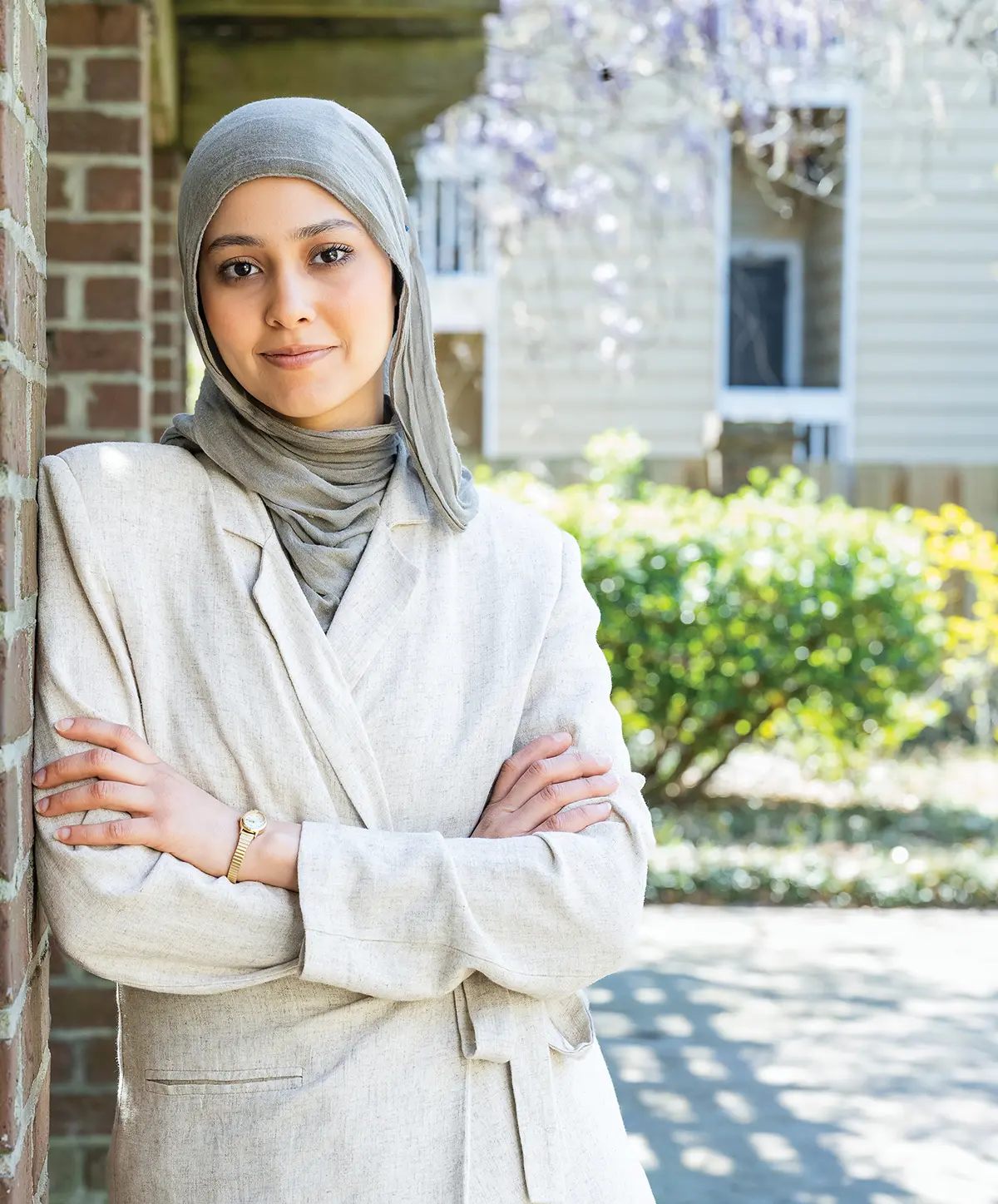
“I began wearing my hijab in the sixth grade,” she says. “It doesn’t just represent my faith – it embodies my culture and my identity. It allows me to stay true to myself and embrace my identity. The hijab speaks volumes about my journey in life, all that I’ve experienced and the future ahead of me. My hijab is simply me.”
Shalaby’s journey in life started in Alexandria, Egypt, where she grew up before moving to South Carolina when she was in high school to join her father, who’d been living and working in the Southeast since she was a child. Her siblings and mother eventually joined them in Charleston, and the family still has a home in Egypt and returns there frequently.
“In Egypt, people don’t look at women differently because we are a multifaith country,” she says. “It’s not like here, where I look different from the majority, which means I get more stares from strangers. It can be positive in some ways, but other times it can be negative and uncomfortable.”
The positive part of wearing something that makes her look different is that her classmates and professors recognize her and remember her name. That sense of being known and seen is one of the reasons Shalaby was interested in the College of Charleston. She wanted to be part of a community. It’s also what drove her to build a community for Arab students on campus.
“I wanted to raise awareness about Arab people and improve representation of our culture on campus,” she says.
With the help of Courtney Howard, a vice president at the College, she worked to create the first Arab American/Middle Eastern/North African Heritage Month on campus to showcase the culture of Arab students through music, food and dance.
“We want to show people that we’re just like everyone else,” says Shalaby, who also founded the Muslim Students Association in 2022 and serves as its executive director. In 2024, she served as the president of the Arabic Club, which fosters appreciation of Arabic language, culture and food and hosts events such as cooking nights. She is also the director of marketing at Phi Chi Theta and the president of the Photography Club.
“It’s about making a space where we can share our culture and beliefs with people from similar backgrounds or people who are interested to know more about this other side of the world,” she says. “It makes me feel that no matter how we are different from each other, we are all humans, and we need to respect and explore different cultures in life. It helped me build a community of friends at the College.”
After graduating with finance and prelaw degrees in May, Shalaby is taking a gap year that includes returning to Egypt to visit her family before applying to law school and starting a clothing business with modest styles.
“It’s hard to find them here,” she says. “I want to make clothes to fit anyone who is looking for something modest with the mix of East and West style.”
Full Throttle
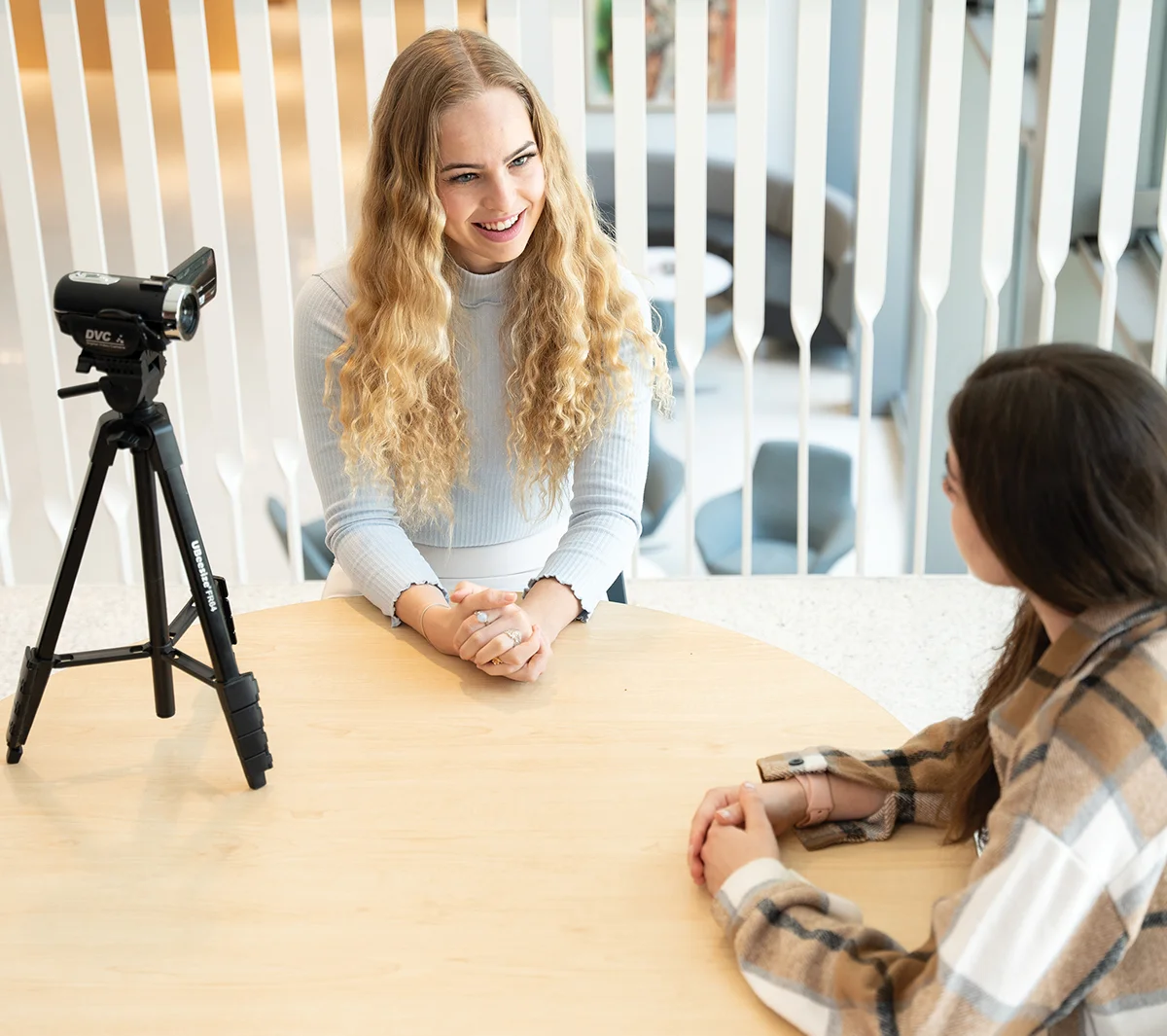
She has done so much so soon, one can’t help but wonder, Is she for real?
“She is the real deal,” says Christine Osborne, School of Business entrepreneur-in-residence, who has mentored Zehntner for more than two years. “She’s probably the most persistent, hardworking, relentless, passionate person I’ve met. When she sees needs, she fills them.”
Which is how the MeeLi (Meet Life) app came about, catching the attention of both the College’s administration and the local startup community.
With an investor and board of advisors, including Osborne, Zehnter hopes to launch the app this summer. The target audience (for now) is College of Charleston students with short videos highlighting student organizations, mental health, restaurants, or interesting students or alumni. The big difference from traditional social media is that MeeLi has no commenting or “like” features, trademarks of what Zehnter calls “soulcial media.” Another big differentiator is that a user can tell the algorithm what they do or don’t want to see – a feature Zehntner says will keep it from becoming instead an echo chamber.
“We’re trying to build a healthy social media, which is a huge task,” says Zehntner. “At the moment, there’s so much wrong with social media – the pressure to be perfect, the addiction, the negative mental health impacts, the comparisons. We want to go back to what social media was supposed to be: connecting people all over the world through authentic stories.”
When it comes to interviewing interesting students, she might want to turn the camera on herself. The daughter of professional dancers, Zehntner spent 14 years as a competitive gymnast in Germany and worked as a paramedic before making the bold decision during Covid to pursue her education in Charleston, home of her aunt and uncle, who once worked for BMW in Spartanburg, S.C.
While attending the College the first two years, Zehntner worked as an EMT with Charleston County on weekends. “One moment, you have a person dying, and the next, another person is giving birth in the very same place in your ambulance,” she says. “It provides a unique perspective on life.”
Her lifesaving skills came in handy on a recent flight from Munich to Charlotte, N.C., when she provided first aid to a passenger experiencing a medical emergency during landing. That incident reinforced her longtime dream of becoming a doctor, specifically a neurologist.
“Those are the moments that I do it for,” she says. “If something happens around me, I want to be there to help.”
After graduation, Zehntner hopes to stay in Charleston for a year or two to develop her app while preparing for medical school in the U.S. if she can extend her visa. Her goal is to work with Doctors Without Borders, combining her passions for medicine, travel and human connection – in between a dozen other things, no doubt.
“We need more Elaines in the world,” says Osborne.
Service With a Smile

“A friend in high school started a business selling random necessities,” says the rising junior majoring in marketing and minoring in economics. “He was a middleman for companies but didn’t have the tools to sell himself effectively. He asked for my help since I have a knack for being very persuasive.”
Manirakiza came to the U.S. with his family from Tanzania as an infant “to seek asylum from the unstable government in the area at the time and to gain a better life,” he says. They first lived in California before moving to Dillon County, S.C., when he was 5.
“The College was always on my radar after hearing about it from peers,” says Manirakiza. “When I participated in an overnight visit, I loved the community, the people I met and how they kept in touch after my visit.”
People like Lancie Affonso ’96 (M.S. ’08), senior instructor of management and marketing, who was also a first-generation student from Tanzania.
“Danieri showed a strong desire to make a positive impact at the College,” recalls Affonso. “As a Meeting Street Scholar, he is already paying it forward as a mentor and student ambassador in our School of Business.”
Manirakiza knew Charleston’s dynamic business scene would open numerous opportunities, and one proved transformative: interning as a sales assistant/delivery specialist with the Mercedes-Benz dealership of the Baker Motor Co. of Charleston.
“Working at Mercedes has been one of the best experiences,” says Manirakiza. “I’ve learned so much about myself as a person and marketer. I’ve learned that marketing is much deeper than people think.
“I also get to meet people from all walks of life and connect with them as individuals,” he adds. “It’s been a fantastic networking opportunity.”
In addition to his internship, Manirakiza took a personal-growth class on intentionality taught by Ben Navarro, the Charleston businessman and philanthropist.
“The class taught me so much, especially how it connects to my current role at Mercedes,” says Manirakiza. “Plus, (Mr.) Navarro is someone I consider a mentor. He has so much to offer, and I aspire to be like him one day.”
Navarro says admires how Manirakiza embodies the power of intentionality – proving that our past does not dictate our future. “Through the class, Dani discovered he holds the pen to his life’s narrative,” he says. “He did more than absorb the lessons; he applied them to his everyday life. By embracing challenge, taking ownership and applying the principles of intentionality daily, he has ignited a meaningful and lasting shift in his mindset – one that will propel him toward his fullest potential and the life he chooses to create.”
Manirakiza is deeply grateful for the financial aid he has received at CofC, including the Knox Global Financial Need Scholarship and the R. Keith and Melissa G. Sauls Undergraduate Scholarship.
“As a first-generation student from a low-income background, I couldn’t be more thankful for all the support I’ve received,” he says. “My scholarships have made it possible for me to attend CofC without any debt or loans. One day, I want to give back to this place that has given me the confidence to be who I am.”
Making a Splash
“My love had always been the ocean,” recalls Bryson. “I didn’t know how I could mix ocean organisms with a career. When I heard the job title ‘marine biologist,’ I knew it was exactly what I wanted to do.”
During her collegiate search, Bryson discovered the College was one of a few schools in South Carolina with a major in marine biology. It didn’t hurt that one of her idols, Jasmin Graham ’17, had also studied at CofC (see story).
And thanks to financial aid, starting with the Herb Kirsh Scholarship from her high school, Bryson had a full ride. A member of the Honors College, Bryson graduated with a 3.81 GPA and impressive internship experiences. She hopes to make an impact in ocean conservation.
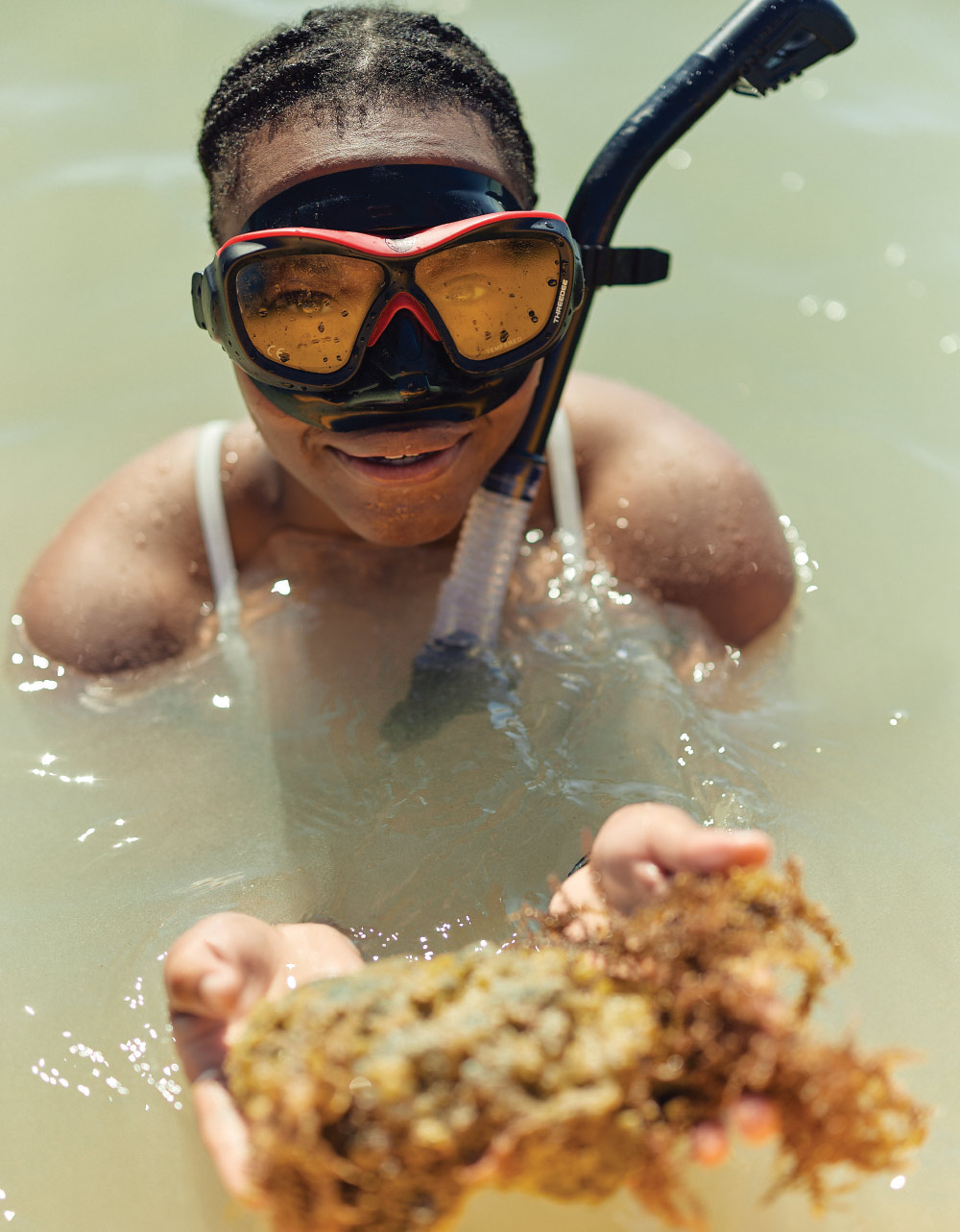
“It helped me gain a better understanding of why it’s so important to set regulations on certain fishing quotas in order to maintain a healthier ecosystem,” she says. “It showed how important it is for environmental conservation to take into account what weʼre taking out of the [water] and what we’re putting back into the it.”
Another impactful experience was a class trip over spring break to the Florida Keys with biology professor Chris Freeman and 10 other students. For their research project, Bryson and her partner dissected sponges they collected from the water to study the organisms that live inside them. They learned that the porosity of a sponge influences what organisms live inside of it (see story).
Bryson was actively involved in several campus organizations, too, such as TriBeta, the biological honor society, and the Biology Club. She also was a member of the Sustainable Ocean Alliance, where she and her peers discussed current events impacting oceans and organized initiatives like beach cleanups. She also volunteered with the Honors College’s Green Heart Project, teaching local students about urban gardening and healthy eating, and was a peer mentor through Mentoring Matters and SPECTRA (Speedy Consolidation and Transition), which provided guidance and support to first-generation students headed to college.
“I just love volunteering and helping people,” she says. “It’s just something I’ve always enjoyed doing and will probably continue doing.”
After taking a gap year to work as a nature tour guide for a boat company in Charleston, Bryson plans to earn a master’s degree in fisheries and aquatic sciences at the University of Florida.
“I’m looking forward to helping our oceans be cleaner and used more wisely,” she says. “My goal is to make people aware of issues surrounding our oceans and ocean conservation.”
TEAMWORK
Going for the Green

“It was great for them to meet, especially since they share many of the same qualities we look for in an Under Armour athlete,” says Jaggars. “Kieron embodies the core values of our brand. His character and maturity surpass that of the typical college athlete, and that can be seen in the way he approaches the game – truly impressive for someone at the amateur level.”
Make that former amateur. After the most successful career of a men’s golfer at the College, which included five wins and a tie for fourth in his PGA Tour debut at the Puerto Rico Open in March, van Wyk turned professional in May.
“Playing in the final group on Sunday in a PGA Tour event is just not done while you’re in college,” says men’s golf coach Mitch Krywulycz, noting van Wyk had to win a college event just to get a spot in the field. “He took that little snowball and turned it into an avalanche.”
With van Wyk’s family in South Africa, Krywulycz was there for the final round. “The stage was huge,” says Krywulycz, who played on two national championship teams at Augusta State. “To watch him operate in that world and handle the pressure was awesome.”
Although he didn’t win the event, the tie for fourth would have netted him about $250,000 had he not been an amateur. “It’s always been a dream of mine to be a professional golfer,” says van Wyk, a business administration major. “Having experienced that has only solidified my decision.”

But van Wyk’s favorite memory while at CofC has nothing to do with golf. It’s playing in the annual kickball game on the softball field at Patriots Point with the men’s and women’s golf teams.
“I’ve really enjoyed my time at the College and the relationships I’ve made,” he says.
Van Wyk has secured several sponsor exemptions this summer into PGA Tour and Korn Ferry Tour events, where good play could earn him tour privileges without having to go through qualifying this fall.
And who knows? There’s a good chance he could be back on the ground next year at Augusta – on the other side of the ropes.
Sport Spotlight

Reston, Va.
Year:
Graduate student (communication)
Accolades:
Named to the All-CAA First Team and a member of the all-tournament team in 2024; 2025 Division I baseball No. 52-ranked outfielder. Helped lead the University of Lynchburg to a Division III national title in 2023 and was a two-time Division III All-American.
Love of the sport:
I love being around the guys on the team and hanging out together. Being a part of a team that shares the same goals and comes together to achieve them. Making lifelong friendships.
Favorite MLB player:
New York Yankees first baseman Mark Teixeira. I did a school project on him when I was in middle school about the time the Yankees won the World Series. Huge fan of his.
Favorite moment as a CofC player:
Last year, senior day, Kevin Madden hit a grand slam home run to beat Northeastern to win our last home game of the season.
Favorite part of game to practice:
Hitting. Would take batting practice all day if they’d let me.
Least favorite:
Base running. It’s important, and you have to practice to be good at it, but I’m not a big fan.
Advice you’d give your freshman self:
Go out and enjoy yourself on the field every day. When you get to college, the game can turn from kind of a casual love for the game to being much more serious. Don’t let it get too serious. It’s still a kid’s game, and you should have fun with it, no matter what.
Walk-up song/why:
“Free Bird,” by Lynyrd Skynyrd. I think your walk-up song gets the crowd engaged, gets the fans engaged, and it gets me mentally focused.
If you didn’t play baseball, what sport would you play?
Basketball. I love watching and playing basketball.
Go-to doubleheader snack:
Fruit snacks. Maybe mix in a little Goldfish.
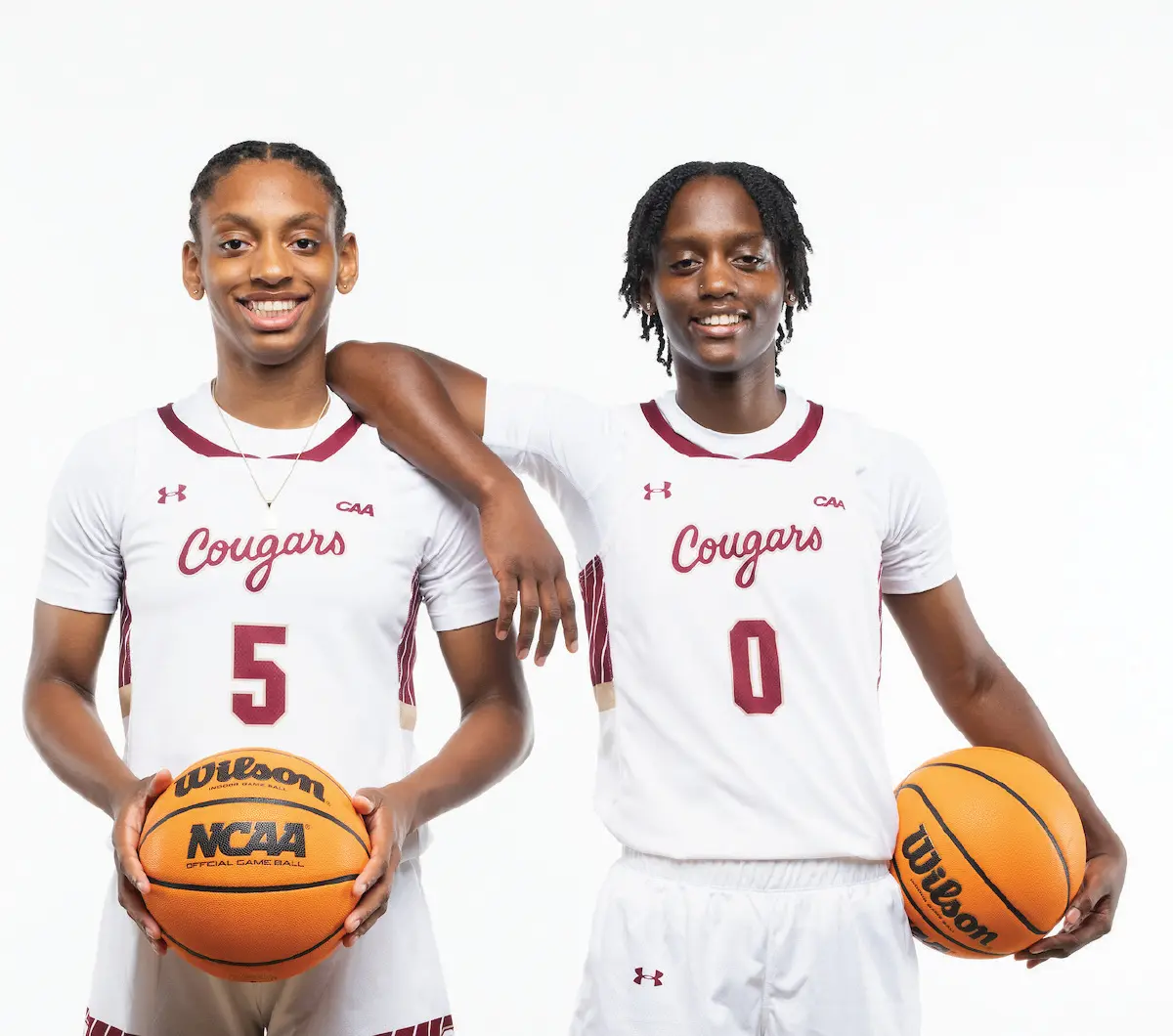
DOUBLE TAKE
THIERRY BARBOT WAS SITTING ON THE couch in his modest Long Island, N.Y., home watching a University of Kentucky basketball game on television with his 7-year-old daughter, Taylor, cuddled by his side.
The game had been a back-and-forth affair, and the second grader could see the intense interest in her father’s eyes as the final seconds ticked off the clock.
When the game was over, Taylor looked up at her dad and quietly asked, “Can I play that?”
Thierry paused for a moment; then a grin began to spread across his lips as the mental images of teaching his daughter the finer points of a game he had loved growing up began to flash through his subconscious.
Up to that point, Taylor and her twin sister, Taryn, had gone through the usual laundry list of youth participation sports – soccer, softball, tennis – and both had even been part of a local New York dance team.
Nothing seemed to click.
“There are not a lot of boys in my family, so I was trying to figure out what my girls liked to do, which wasn’t easy,” says Thierry with a laugh. “I tried to expose them to everything to see what they liked.”
A few days later, Taylor and Thierry headed to the neighborhood park to see just what his daughter could do on a basketball court.
A lot, it turned out. Taylor was a natural.
“She took a few shots, dribbled the ball around the court, and I think everything kind of fell into place for her,” recalls Thierry. “It didn’t happen overnight, but I could tell she was hooked. I couldn’t keep her away from the courts. She would dribble the basketball around the house all day, every day.”
After watching her sister and father bond over the game, Taryn had her interest piqued and decided to join the family on the concrete slabs.
“They both just love the game,” says Thierry, whose brother was a point guard for Division II Mercy University. “Taylor was a little bit ahead of her sister in the beginning. She really worked on her craft. Then Taryn got serious about it and took off from there. I think it’s something we’ve been able to share as a family.”
The Barbot sisters’ obsession with basketball eventually led them to the South Carolina Lowcountry and to CofC women’s basketball head coach Robin Harmony.
The rising juniors have been cornerstones in revitalizing the women’s basketball program over the past two seasons, which included back-to-back 20-win campaigns.
The Floral Park, N.Y., natives helped lead the Cougars to a historic season this past winter. The Cougars went 25-8, finishing second in the Coastal Athletic Association and earning a spot in the Women’s National Invitation Tournament, where they took down Howard University by 20 points in the opening round.
“Taylor and Taryn are such great kids and great teammates,” says Harmony. “They are the heartbeat of our program. They’re from New York, so they are tough kids; they work on their games and are in the gym every single day. They really are blue collar players.”
The 5-foot-9-inch Taylor is the quintessential floor general – a pass-first point guard who wants to get her teammates involved – and is a tenacious, on-the-ball defender.
Although Taylor took the court in 22 games as a freshman during the 2023–24 season, she spent the majority of her first year in the Cougars’ program playing behind All-CAA point guard Jenna Annecchiarico.
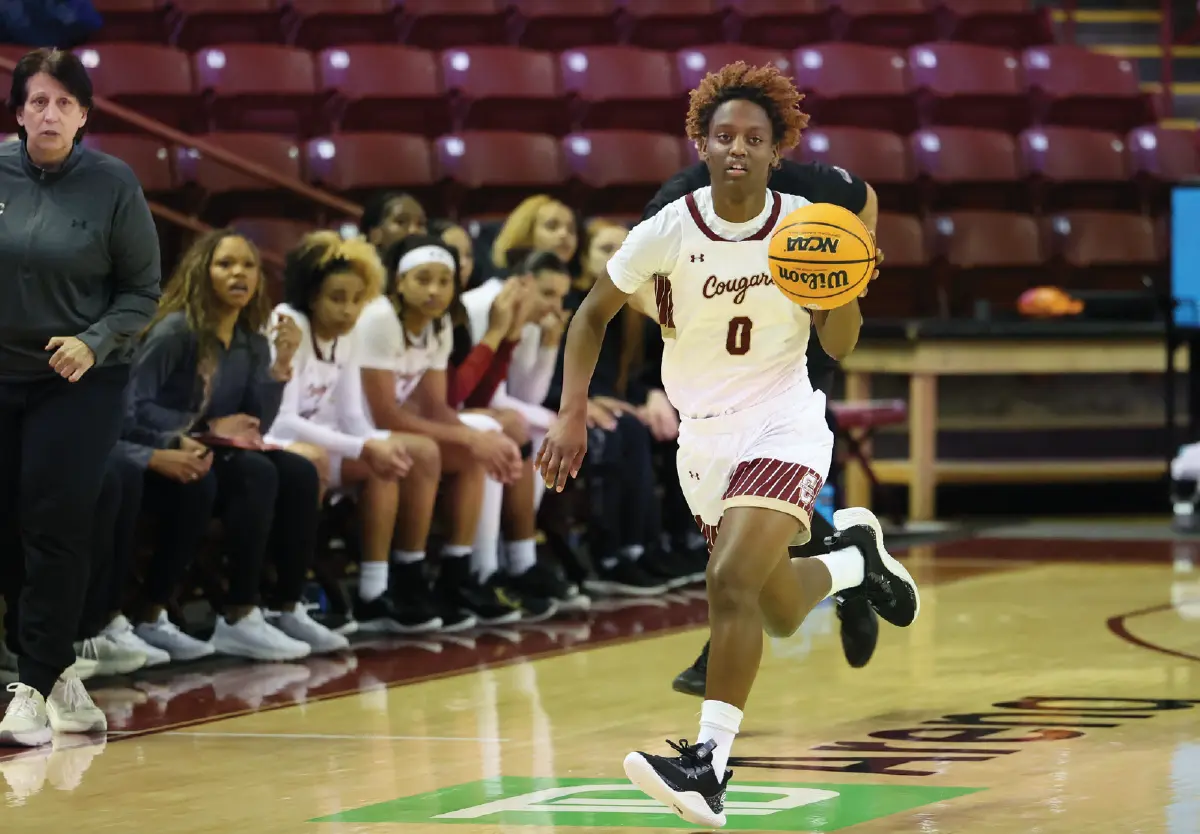
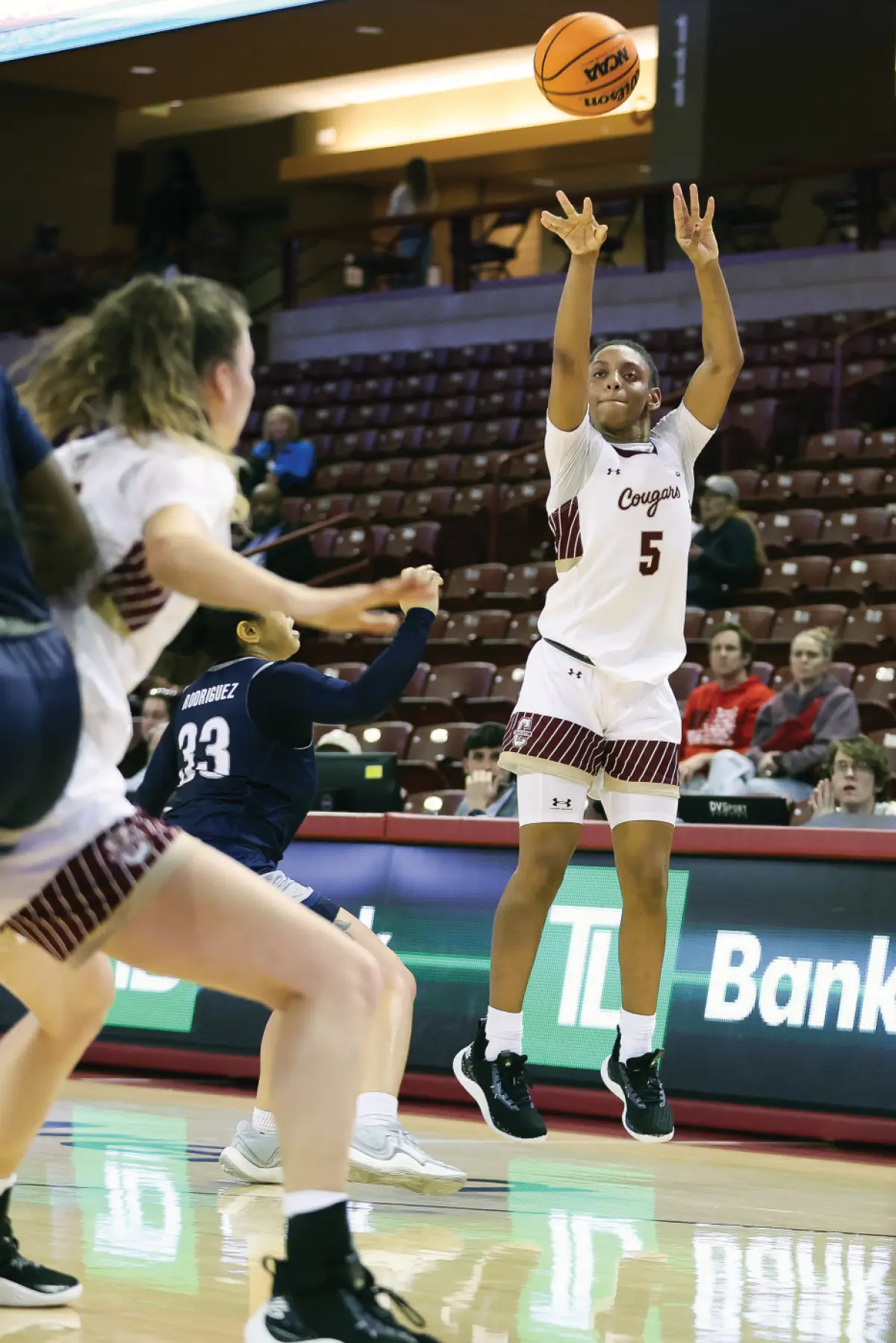
Taylor thrived in her expanded role. She wasn’t known as a 3-point threat coming out of high school but worked tirelessly in the gym to improve her shooting and has become more of an offensive threat.
“Taylor couldn’t throw it in the ocean as a freshman,” says Harmony. “She’s really put in the work to improve that part of her game. She can hit the 3 now, so teams have to come out and guard her. She’s starting to play like the player we thought she could be. She runs the team, sees the floor really well and has a high basketball IQ.”
The 5-foot-10-inch Taryn, who was named the school’s Female Athlete of the Year in April, has a prototypical scorer’s mentality. She is a downhill, aggressive driver who loves to take defenders off the dribble or shoot the open 3-point shot.
As a freshman, Taryn was second on the team in scoring, averaging 14.3 points a game as she earned CAA Rookie of the Year honors.
There was no sophomore slump this past season as Taryn led the team in scoring (16.6 points per game) and was named the CAA Player of the Year.
“Taryn has always been able to put the ball in the basket,” says Harmony. “She can score at all three levels.”
Off the court, the rising juniors couldn’t be more different. Taylor is a bundle of energy the instant her eyes open each day. Most mornings, she rises before the sun comes up and heads over to TD Arena or the practice gym to get up a few shots before classes begin.
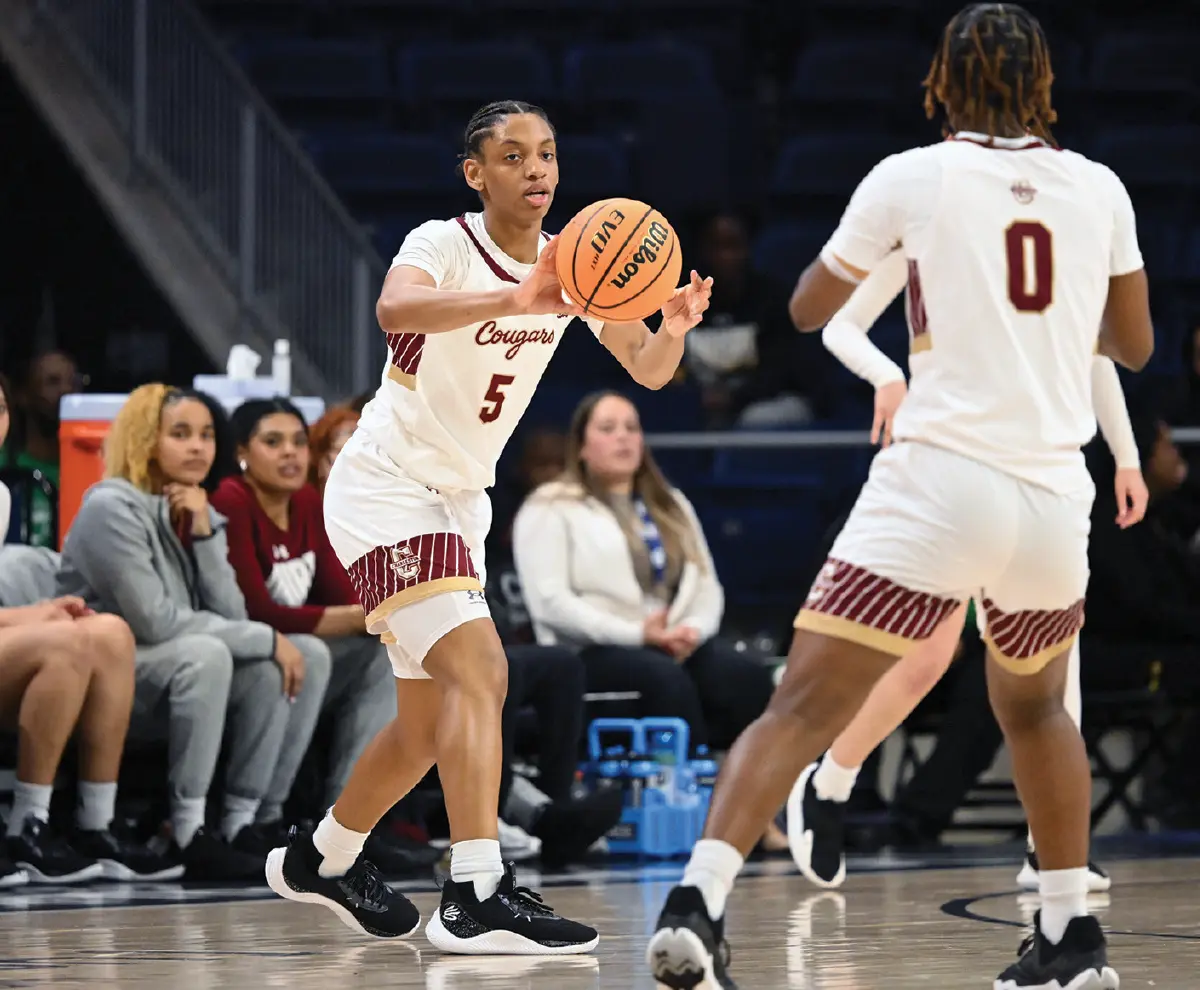
“We’re two totally different people,” says Taryn. “I’m more outgoing. I like to relax, and Taylor likes to go off and do her thing.”
While the Barbot sisters might be complete opposites off the court, when they’re on it, they are in perfect sync with each other and the rest of their teammates.
“We are going to do whatever we need to do to help the team win,” says Taylor.
So, who’s the best player? Depends on who’s asking.
“I win most of our one-on-one games,” says Taryn. “There’s a little bit of rivalry between us.”
Thierry remembers having to play referee on more than a few occasions in the driveway of their home when the sisters would play one-on-one.
“Things could get very heated between them,” he says. “There’s a little bit of a sibling rivalry, but that’s only because they are both so competitive. Iron sharpens iron, but when they came inside, they were back to being sisters and having each other’s back.”
The goal for the sisters moving forward is to lead the Cougars to the NCAA Tournament for the first time in program history.
“That’s the goal,” says Taylor. “That’s where we belong.”

Coming Home

Photography by Pablo Castagnola

October
1938,
Now, 83 years later, the Landsmanns are back home – at least in spirit – because of the efforts of College of Charleston Jewish studies major Leah Davenport ’25. On March 9, artist Gunter Demnig installed four Stolpersteine, or stumbling stones (brass plates), inscribed with the name, birth date and fate of each member of the Landsmann family at the entryway of 17 Hirtenstrasse. Davenport attended the ceremony, along with Chad Gibbs, a faculty member at the College; Natalie Peyton ’24, who had helped Davenport share the Landsmanns’ story; and relatives of the Landsmann family – R. Scott Hellman ’96 and his parents, Max and Ann Hellman.
As the ceremony began, Davenport was happy to see neighbors join them, including one who asked how he would know if someone Jewish had lived in his apartment, and two women, one of whose grandmother has a Stolpersteine in front of her former Berlin home.
As Scott and Max Hellman read the mourner’s kaddish, Davenport felt grateful that she could give them a connection to these relatives they only recently learned they had.
“I knew there were letters in Special Collections, but I didn’t know the family’s name,” says Scott Hellman, referring to the 1930s correspondence housed at the College’s Addlestone Library that ultimately led to the placing of the Stolpersteine. “With the research that Leah’s done, future generations of our family and South Carolina students will have a lasting impression of the plight of the Landsmanns.”
With the Stolpersteine installed, Davenport knows this family killed by the Nazis will have a place in history. With each Stolpersteine carrying a story of one person’s fate, the atrocities of the Holocaust go from abstract to personal and remind everyday pedestrians of the horrors the Nazis unleashed on the world.
“For more than 80 years, the Landsmanns were forgotten to history,” she says. “Now they can’t be forgotten.”
Cry for Help
When Scott’s grandmother helped clean out his Great-Great-Aunt Minnie Tewel Baum’s house in Camden, S.C., after she died in 1985, she discovered letters written in German that had been sent from Germany and Poland at the start of World War II. In 2011, she donated the letters to the Jewish Heritage Collection within Special Collections at the College of Charleston Libraries.
In 2022, Gibbs, assistant professor of Jewish studies, director of the Zucker/Goldberg Center for Holocaust Studies and co-director of the Perlmutter Fellows Program, learned about the letters between Minnie Baum and Malie Landsmann and wanted the stories they held to be shared. He asked Davenport to take the lead.
Funding from the S.S. Solomons Scholarship and the College of Charleston Foundation gave Davenport the flexibility and time to focus on the letters and circumstances surrounding the Landsmann family.
As Davenport read the translated collection of letters, she caught a glimpse of the Landsmann family’s desperation and the tremendous burden Baum assumed.
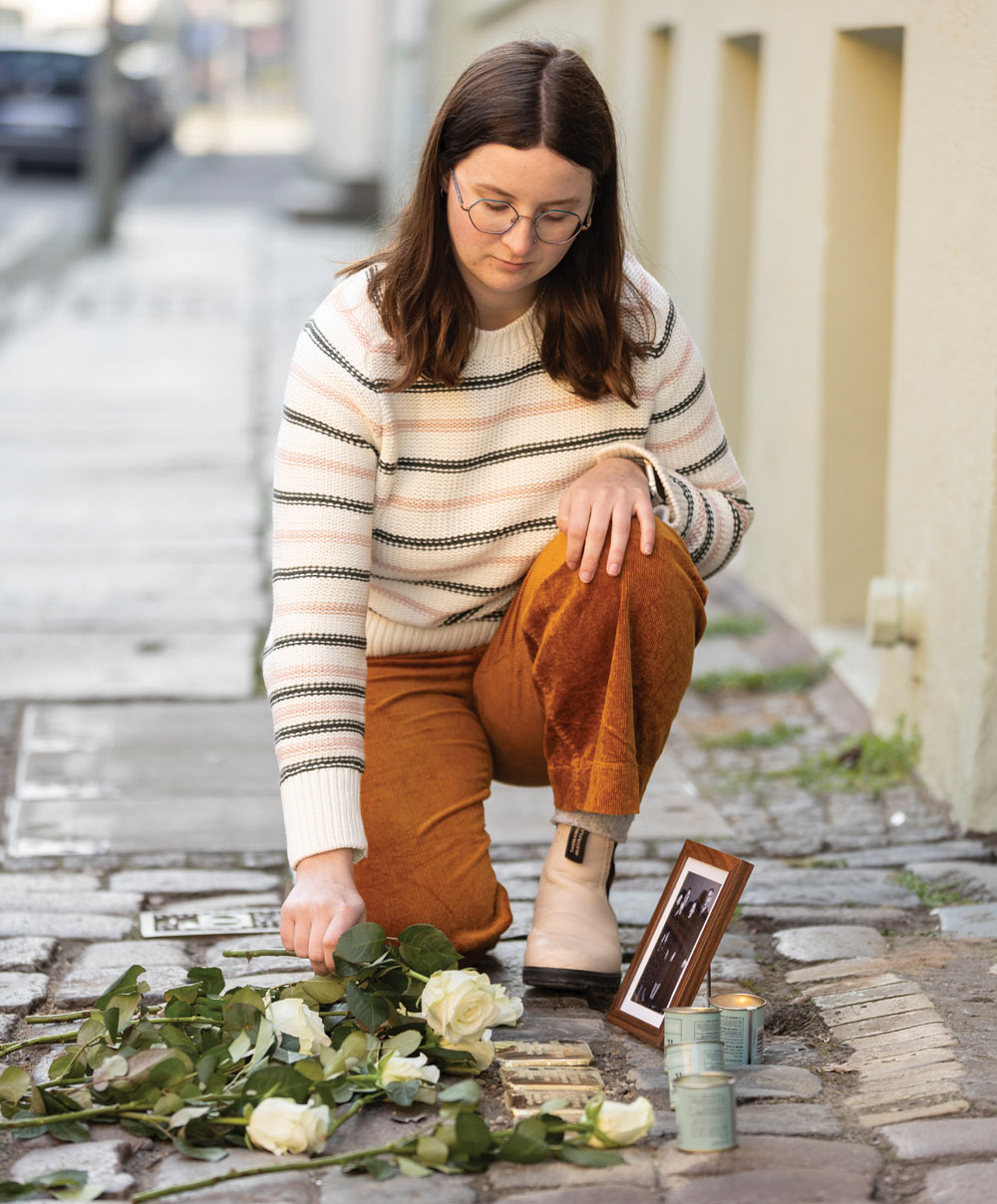
When Malie first wrote Baum in March 1938, more than half the Jews who lived in Germany had left since the Nazis took over the country in 1933. The outlook was grim for those who remained. They faced insurmountable paperwork and demands from the German and foreign governments for money they didn’t have, which prompted Malie to write to her cousin – someone she never met.
In the letter, Malie explained their relationship and how industrious her family was. She then told of how the German government was forcing Jews to migrate, but an affidavit was required.
Malie wrote again in November, sharing that her husband was involuntarily sent to Poland, while she and the children remained in Berlin. Chaim was swept up in the Polenaktion, where naturalized Jewish Germans who had been born in Poland were forcibly deported. This move built on the Nuremberg Race Laws of 1935, which stated that no Jew could be a German citizen.
“Now it depends only on you and the other cousins that we stay alive because I can only save my life as soon as I get the affidavit in my hands,” wrote Malie. “A delay in the processing of the affidavit can become my abyss, since without my husband I have no way of supporting my two poor children.
“Help, help, help we scream, and I expect this help from you by telegram before it is too late and before we are completely destroyed.”
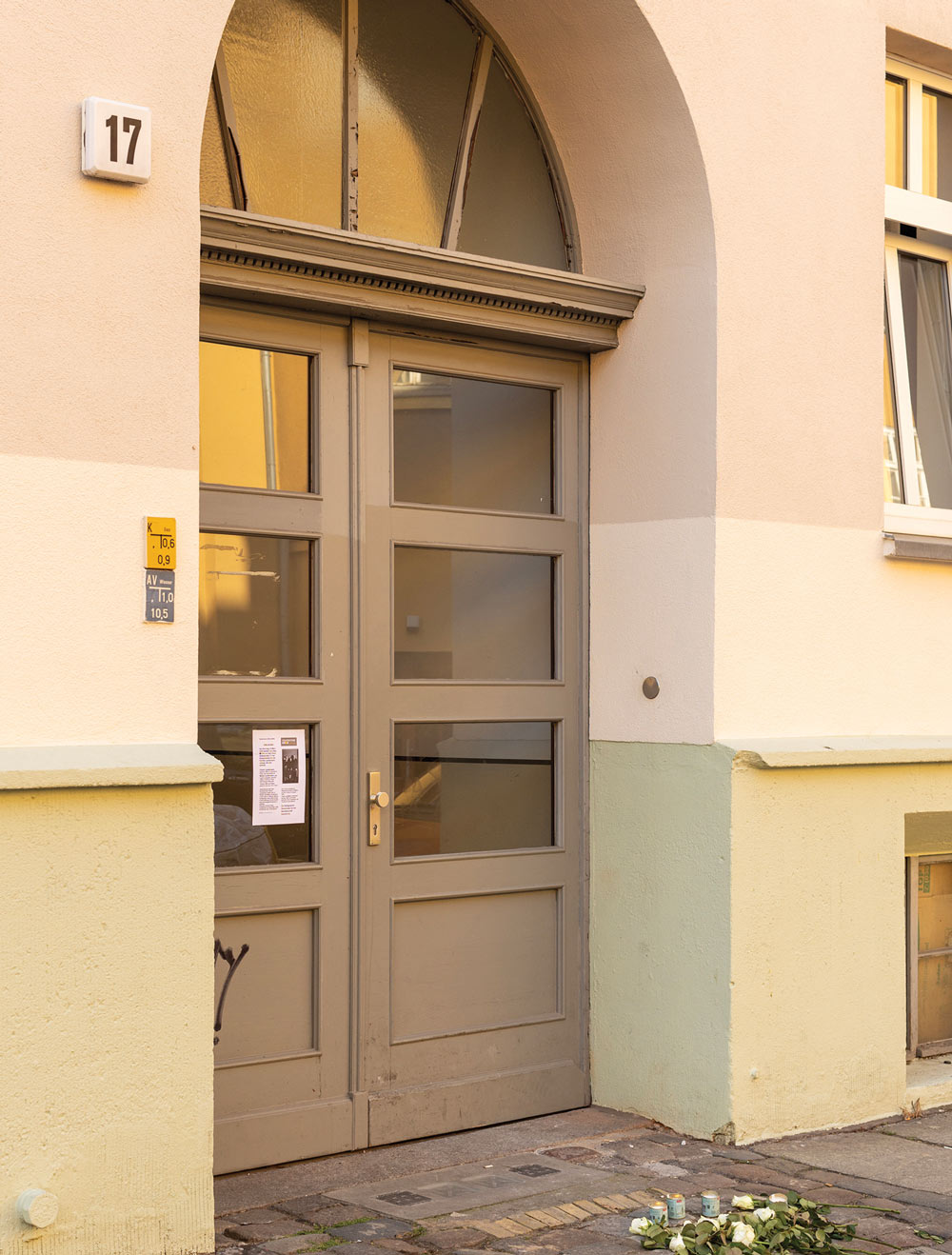


Finally in December, Malie received the affidavits only to learn that due to the U.S. quota system limiting the number of visas from each country, it would take up to three years for their turn to come — more than 300,000 people were waiting for their quota number to be called. Malie urged Baum to work on a special dispensation.
In January 1939, Malie shared the option of waiting in Cuba until they were granted entry into the U.S. Two months later, she wrote that if nothing happened soon, they would be forced to go to Poland, although her husband wrote to tell them not to come because of the harsh conditions.
“I still cling to the hope that you won’t abandon me, that you won’t forget me, because I really have no one at all in the world to help me except you,” wrote Malie.
The letters took a toll on Baum, who knew the clock was ticking as she continued to reach out to different agencies without luck.
In A History of Kershaw County, South Carolina, a neighbor recalled Baum’s distress after receiving the letters from Europe. He said that while clutching the letter, she would often walk up and down the street weeping and pulling at her hair.




“Our lives are in your hands,” she implored.
In June 1941, Malie admonished Baum for not writing and for not sending the packages.
“Dear Minnie, you don’t want to hear anything about us anymore, and you were our only hope,” she wrote.
These words must have pierced Baum’s heart. Clearly mail was not reaching Malie; she had no idea the lengths Baum had gone to get them out of Poland. Alas, the sea of bureaucracy from both the German and U.S. governments won out over Baum’s efforts. In 1942, Malie and Chaim were deported to Auschwitz and murdered. Although there is no record for Ida and Peppi, it is presumed their daughters were also killed there with their parents.
Picking Up the Thread
“I wish Malie knew that her family in the U.S. was doing everything they could to get them out of Poland,” she continues. “Both Malie and Minnie faced insurmountable systematic failures and barriers on both continents.”
No doubt Malie and Baum would be heartened to know all that Davenport has done to remember the Landsmanns and, by extension, the story of the Holocaust. She has shared the family’s story in an article for The Jewish Historical Society of South Carolina magazine, presented to groups, produced a podcast and collaborated with classmate Grace Shaffer ’23 to have the letters turned into a learning tool for South Carolina high school students.
Through the Samuel Freeman Trust – International Travel Scholarships, Davenport joined Gibbs for a study abroad program to Poland, the Netherlands and Germany. While on the trip, the pair visited the Landsmanns’ home in Berlin.

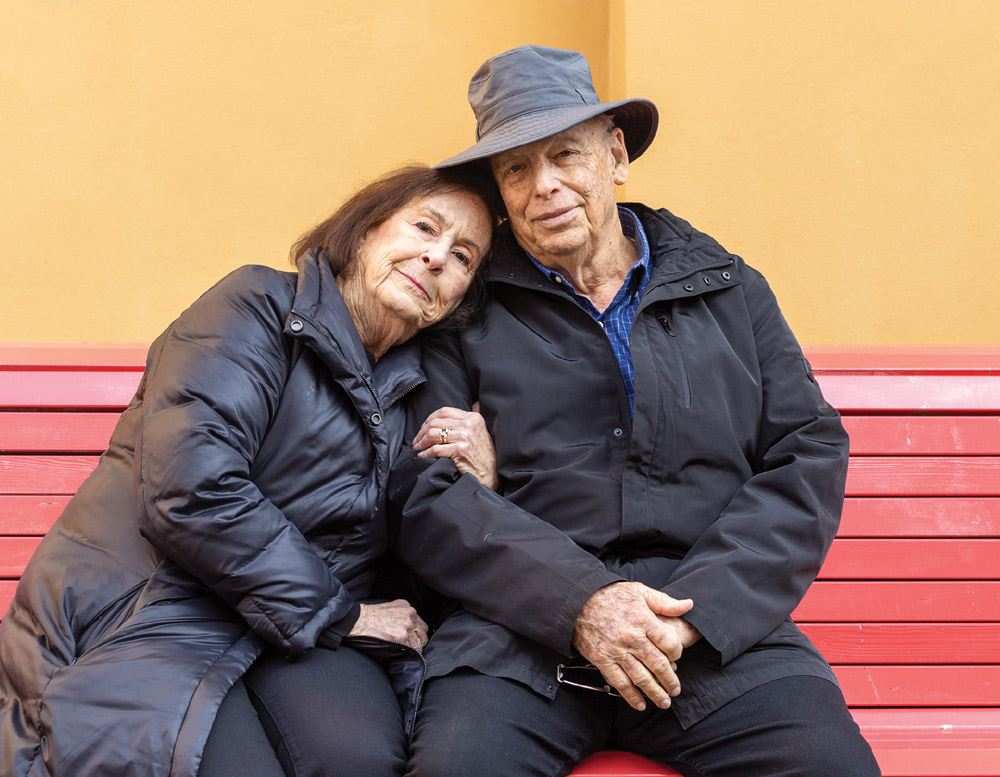
Throughout the trip, Davenport saw some of the more than 100,000 4-inch-by-4-inch brass Stolpersteine embedded along the streets of more than 1,900 municipalities across Europe.
“When we visited a Jewish neighborhood in Amsterdam, the sidewalks literally glittered with Stolpersteine,” she says, noting that the experience sparked a desire to have Stolpersteine placed in front of the Landsmanns’ home. “The Stolpersteine makes sure we remember the people who lived in these homes.”
Before delving into getting Stolpersteine for the Landsmann family, Davenport asked permission from the Hellman family. With their support, she researched and compiled the documentation required to have the Stolpersteine placed in front of 17 Hirtenstrasse, namely providing where they lived, their fate and what the Nazis did to them between 1938 and their murder.



The Stolpersteine, now the largest decentralized memorial in the world, serve as a reminder that the people killed at the hands of the Nazis were not faceless numbers but neighbors who lived full, rich lives. It was a way to bring the reality of what happened home.
“Leah deeply, deeply cares about community and people,” says Gibbs. “When she puts her talented mind to do something, she’s going to do it.”
Davenport’s dedication and research unearthed a fair amount of documentation on the Landsmann family and their fate. Unfortunately, she was not able to determine what exactly happened to the children, Ida and Peppi.
“We have survivor testimonies regarding the fates of Malie and Chaim, but absolutely nothing about Ida and Peppi,” she says. “It’s hard to imagine how two loved children could just disappear, though it’s very emblematic of the Holocaust as a whole.”





“Sometimes approval of Stolpersteine can take years, but because I am a university student, the team made the Landsmann Stolpersteine a priority,” she says. “Memorializing the Landsmann family felt like a responsibility. We can’t forget them, and we need to remember them as people, not victims.”
The Hellmans couldn’t be more appreciative and prouder of all Davenport and Gibbs have done.
“It is an incredible story that my own alma mater brought to the forefront,” says Scott Hellman, who serves as chair of the Jewish Studies Advisory Board. “Leah’s research allowed for the Stolpersteine to show where the Landsmanns lived, and Chad’s forethought to go through the letters in Special Collections has closed a remarkable chapter in my family’s life.”
Deep Dive




Unless you happen to be one of the lucky students in Chris Freeman’s Biology of Coral Reefs class at the College of Charleston, which emphasizes experiential learning with hundreds of internships, research with faculty projects, study abroad and volunteer opportunities available.
Twelve students from the class accompanied Freeman to the Florida Keys over spring break to see the species and processes that he’d taught them about in class: reef growth, algal-coral interactions, sponge physiology and fish predation pressure, among other topics.
“It was eye-opening to see everything we had been learning about in our lectures happening in person right in front of my eyes,” says Sam Brandt ’25, a marine biology major who’s been diving since he was 13. “It gave me an entirely new perspective on the way I look at coral reef ecosystems as a diver and a developing scientist.”
The first of their three dive days began at the Amoray Dive Center on the west side of Key Largo. The resort’s 45-foot catamaran departed about 9 a.m. and headed south through Blackwater Sound to a cut lined with multimillion-dollar homes and out into the Atlantic. Destination: Molasses Reef 6 miles southeast, one of the closest reefs to the warm, clear waters of the Gulf Stream. While the boat was underway, the six students with their scuba certification finished donning their wetsuits before gathering with the dive master for a safety briefing, while the other students using snorkels did similarly. After slipping their tanks and masks on, the divers took a giant step off the bow of the boat and then descended one by one down a mooring line to the only living coral barrier reef in the continental U.S.
Armed with GoPros to capture all the marine life to study later, the students cruised the ocean floor at a depth of about 30 feet. Yellowtail snapper, scrawled filefish and rainbow parrotfish swam through spires of elkhorn, gorgonian and lettuce corals. Forty minutes later they were back on the boat.
“That was so awesome,” says Lauren Pubillones ’25, who also majored in marine biology. “I love being in the water and seeing the beauty that not many people have the opportunity to view.”
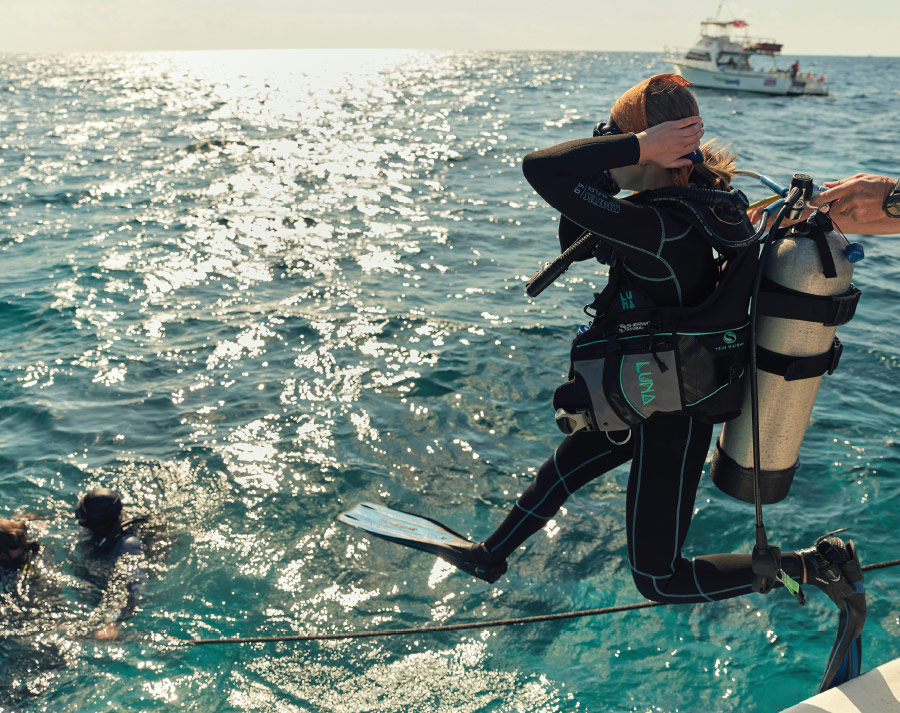
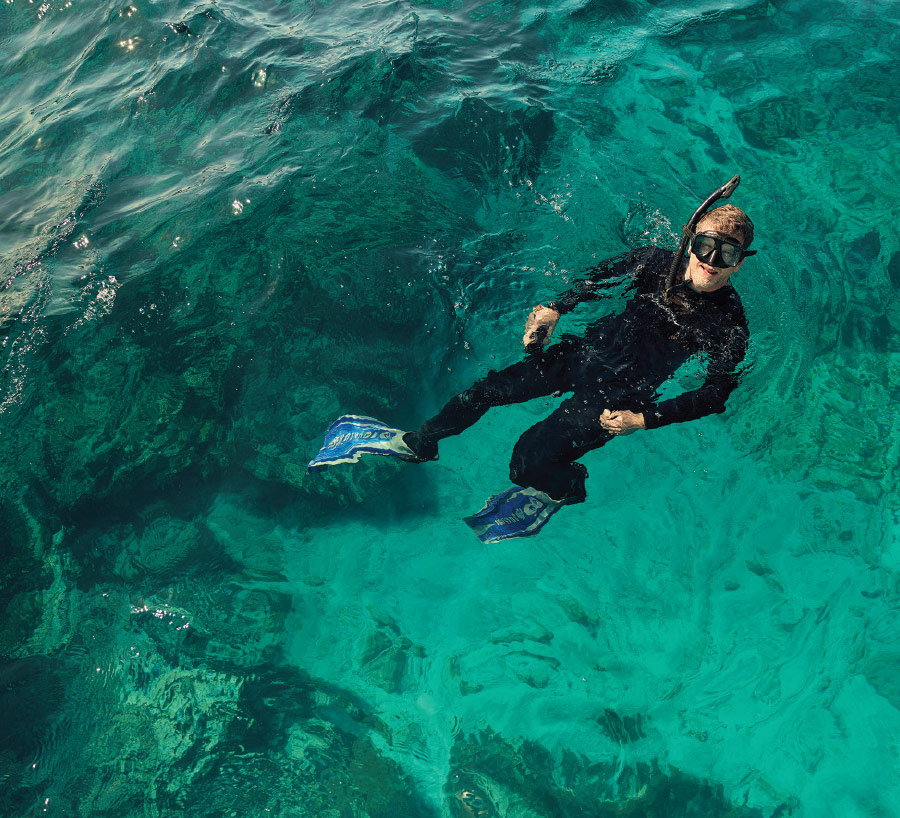
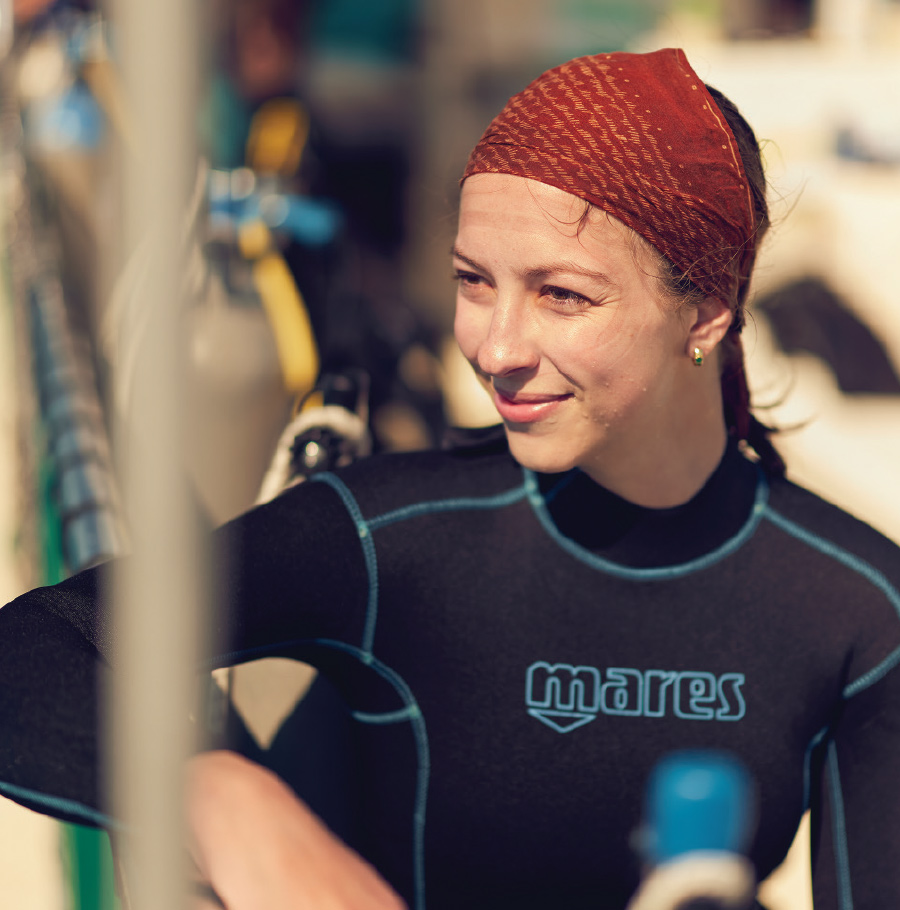
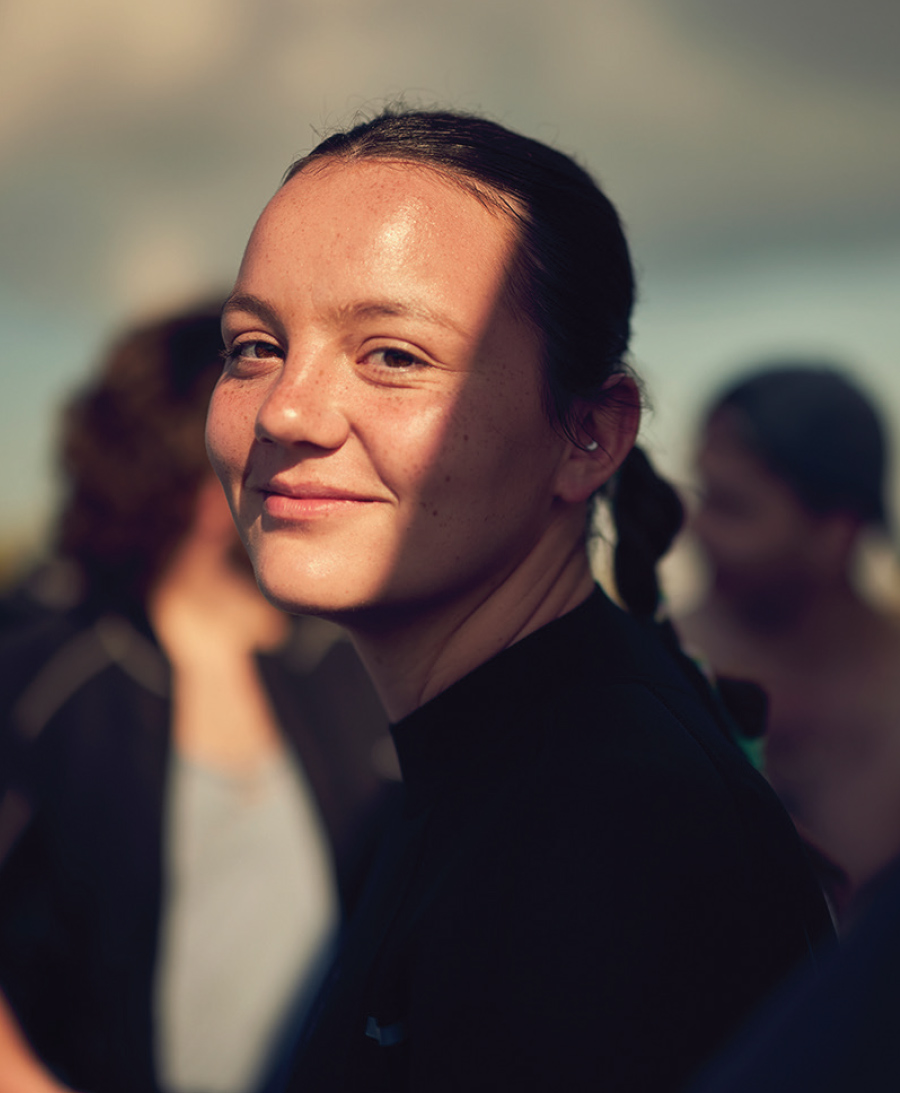
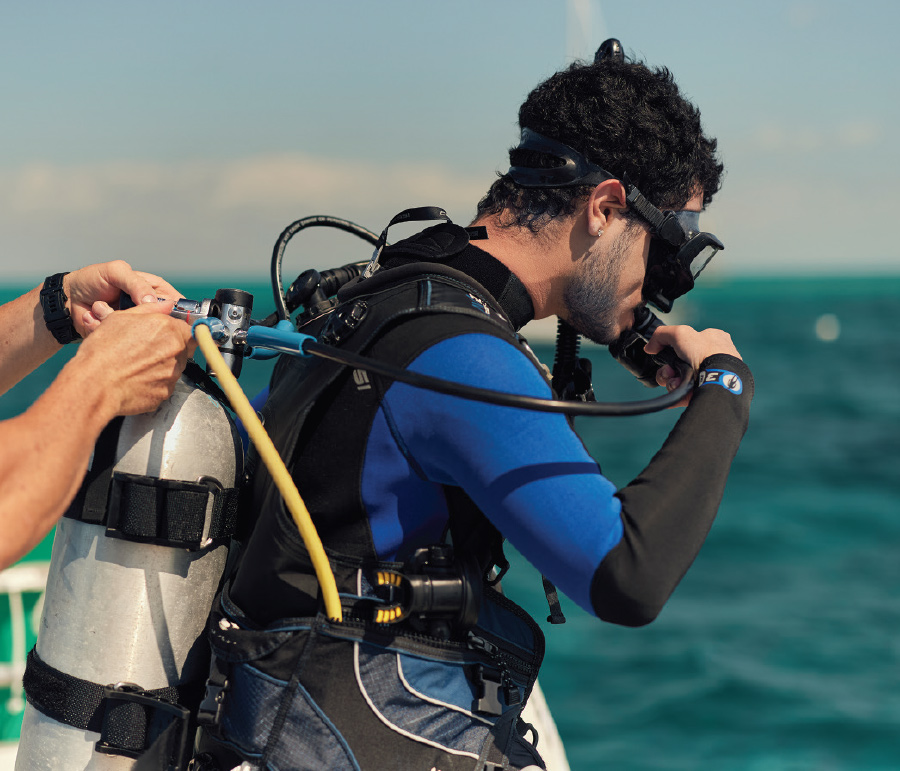
“It’s a good way to debrief because everybody sees something different,” says Freeman, a coral reef scientist who specializes in sponge-microbe symbioses and coral-sponge interactions. “Two people can come up from the same dive and have totally different experiences. I was looking specifically for the target organisms that I wanted to make sure that they understood – all the organisms that carry out important functions on coral reefs – and applying what they learn in class to a real-world scenario.”
Uncharted Waters

But it’s not just the beauty of the reef that is lost. These “rainforests of the sea” support about a third of all known marine life and provide $10 trillion in benefits like food, jobs and coastal protection, according to the ICRI.
“It definitely worries me for the sake of coral reefs and also for future generations,” says Freeman. “We’ve spent a lot of time in class talking about what, if anything, can be done. Students are very concerned about the environment, which is good. Understanding the ecology and biology of coral reefs, and how and why they’re changing, is important.”
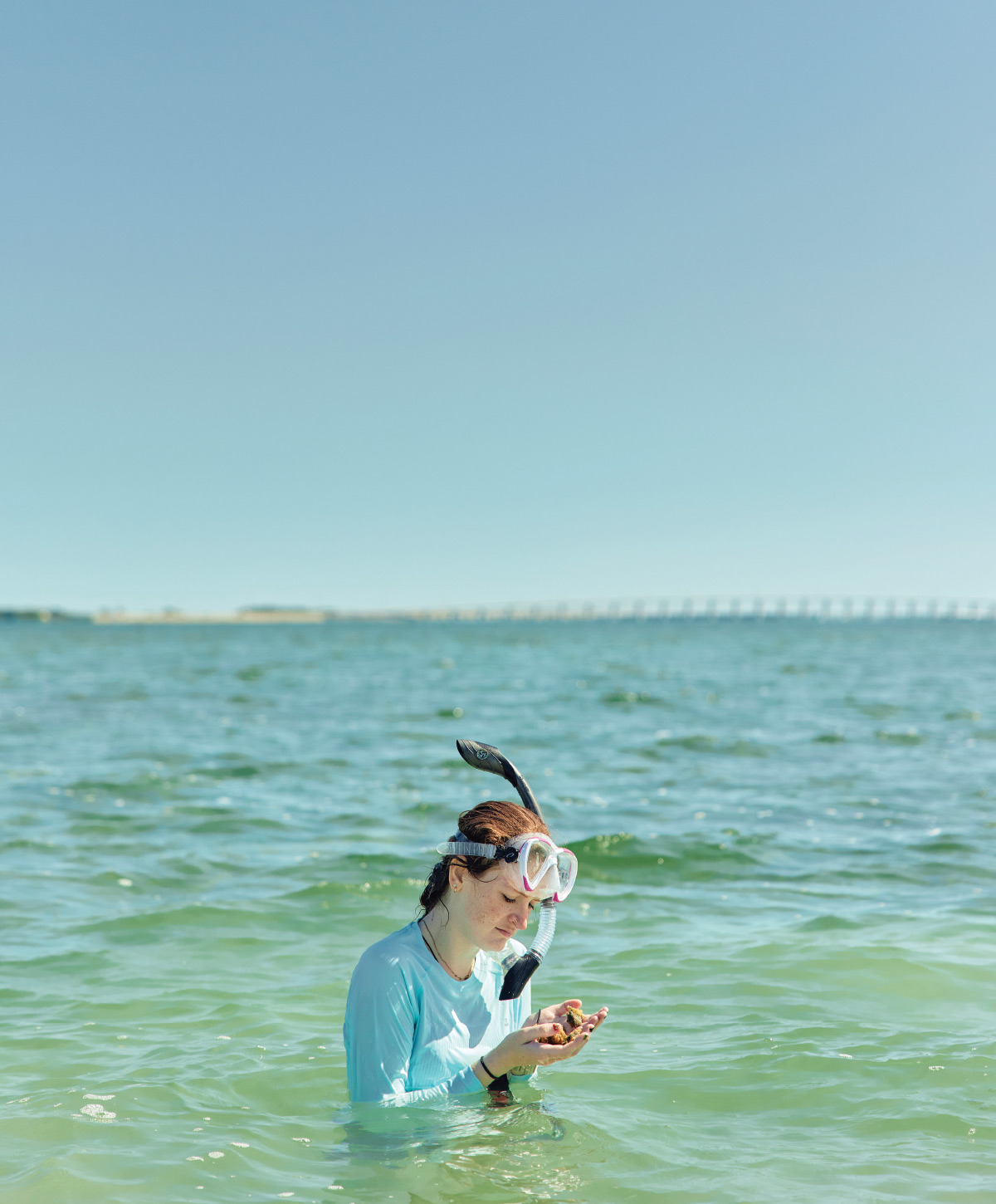
“Chris teaches a diversity of courses emphasizing student engagement in biology, especially by getting students into nature during class,” says Department of Biology Chair Eric McElroy, noting that one student called Biology of Coral Reefs the best class she had ever taken at the College in her evaluation. “His research on sponges engages undergraduate and graduate students and is routinely published in scientific journals. Chris is the total package – an exemplary teacher-scholar.”
Biology of Coral Reefs was the second class Dallas Bryson ’25 took with Freeman following General Ecology fall semester. “I love how he is always willing to help his students and his passion for the topics he is teaching,” she says. “It makes me want to learn even more.”
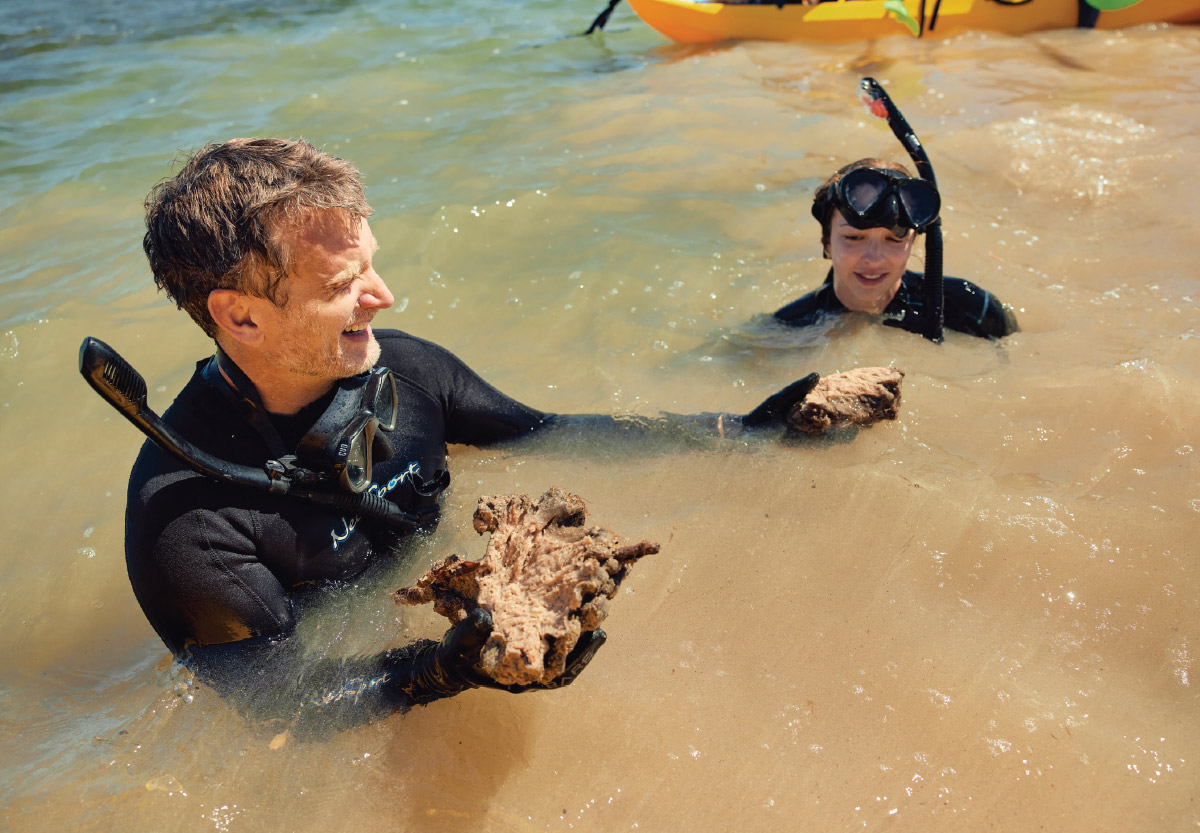
“His enthusiasm and dedication to the content is contagious and has made him someone my classmates and I look up to,” he says. “Dr. Freeman is a prime example of the kind of professors who are part of what makes the College’s marine biology program such an amazing part of our school.”
Guppy Stage

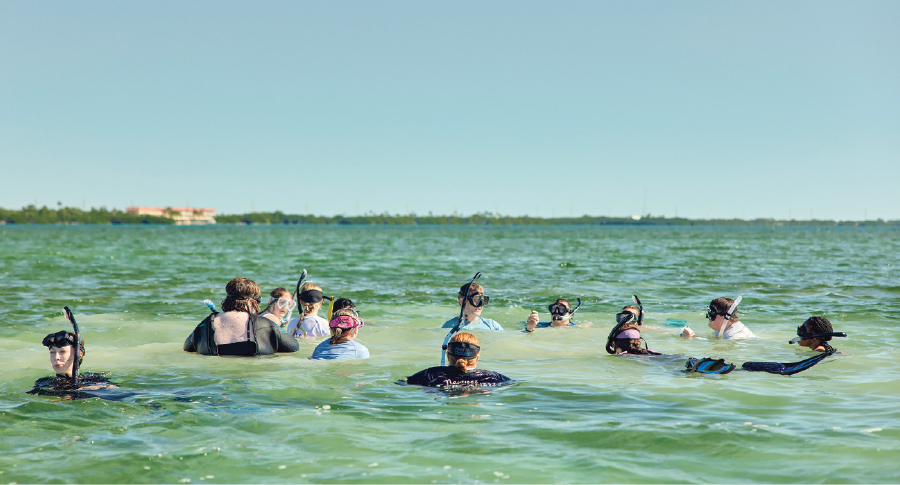
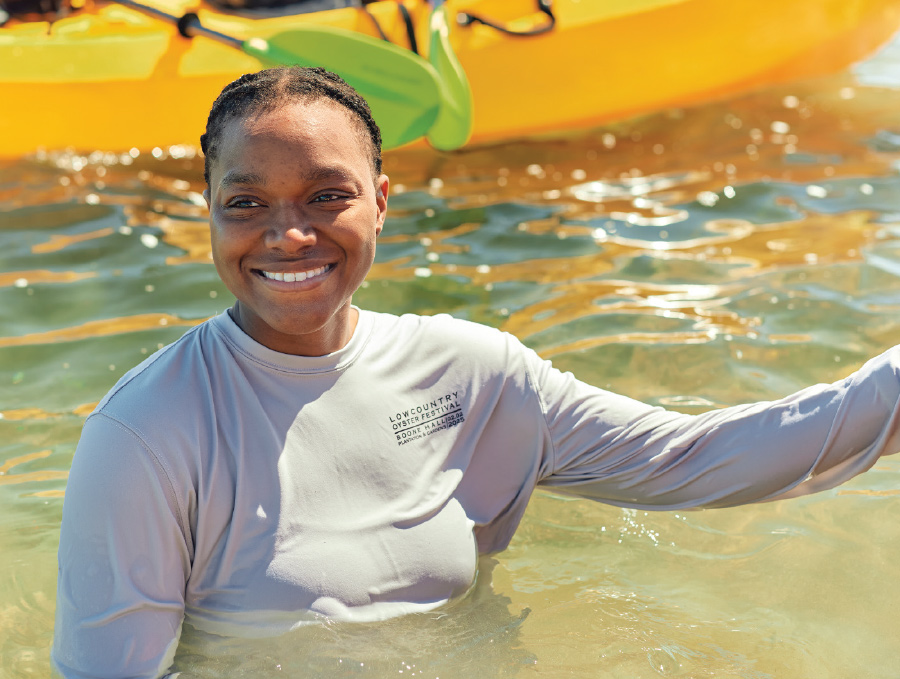
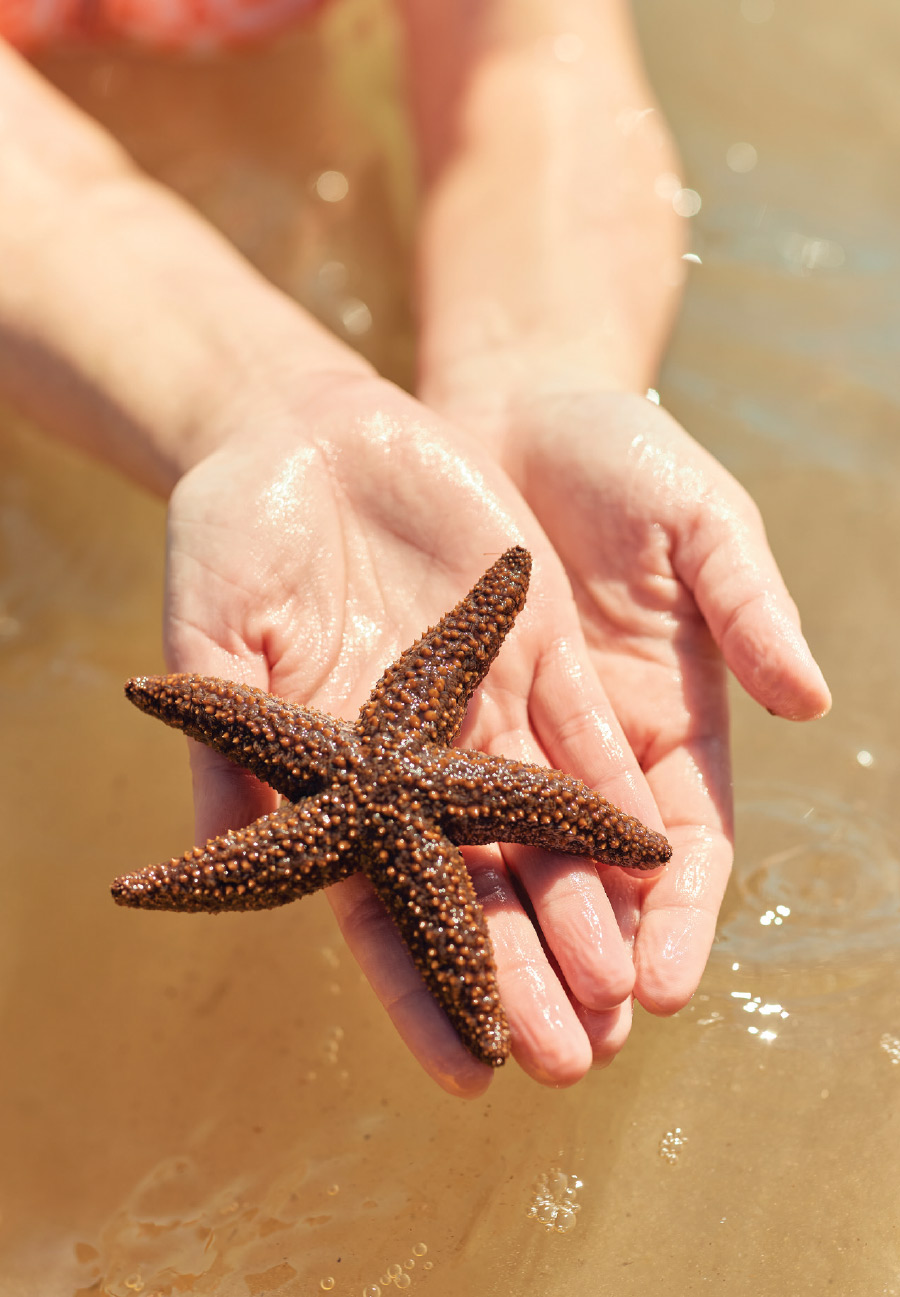
Freeman got his scuba certification when he was a freshman in high school (he’s been on more than 1,000 dives since) before heading off to Connecticut College to study marine science. The next pivotal point occurred when he spent part of his junior year at the renowned Marine Biological Laboratory in Woods Hole, Mass., on Cape Cod, where he first learned to love fieldwork studying a tiny fish called the mummichog.
“That whole summer, I was at this field station north of Boston out in the mud, in the water, doing exactly what I do with students now – getting out in the field and getting that experience,” he says.
After earning a master’s in biology at Georgia Southern University, he spent two years working among Seacamp (an experiential learning program in the Florida Keys on Big Pine Key); the National Park Service in Biscayne Bay, Florida; and a seagrass ecology lab in Miami before getting a doctorate at the University of Alabama at Birmingham. He spent the next five years in Fort Pierce, Fla., on a postdoctoral fellowship at the Smithsonian Marine Station, which specializes in marine biodiversity and the ecosystems of the Indian River Lagoon and the offshore waters of Florida’s east central coast. Summers were spent doing research in tropical reef paradises like Panama, the Bahamas and Belize.
His wife, Ashley, an accomplished food stylist, author and recipe developer and tester, wanted to be in a more culinary-centric city, so they moved to Charleston in December 2017. The couple lives on Johns Island, S.C., with their 10-year-old son, and Freeman couldn’t be happier about being here.
“The College is incredibly well-situated for ecology classes,” he says. “Charleston has a unique combination of forests, wetlands, intertidal areas, marshes, ocean and beaches. All these different ecosystems provide perfect opportunities to get students out into the field.”
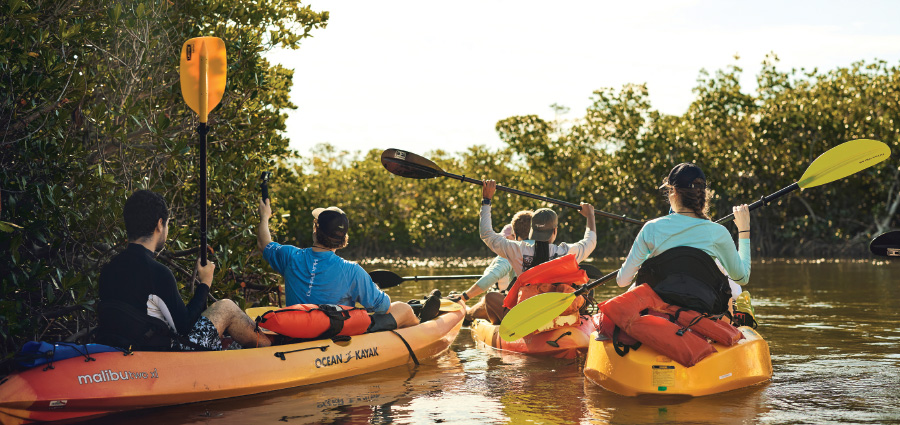
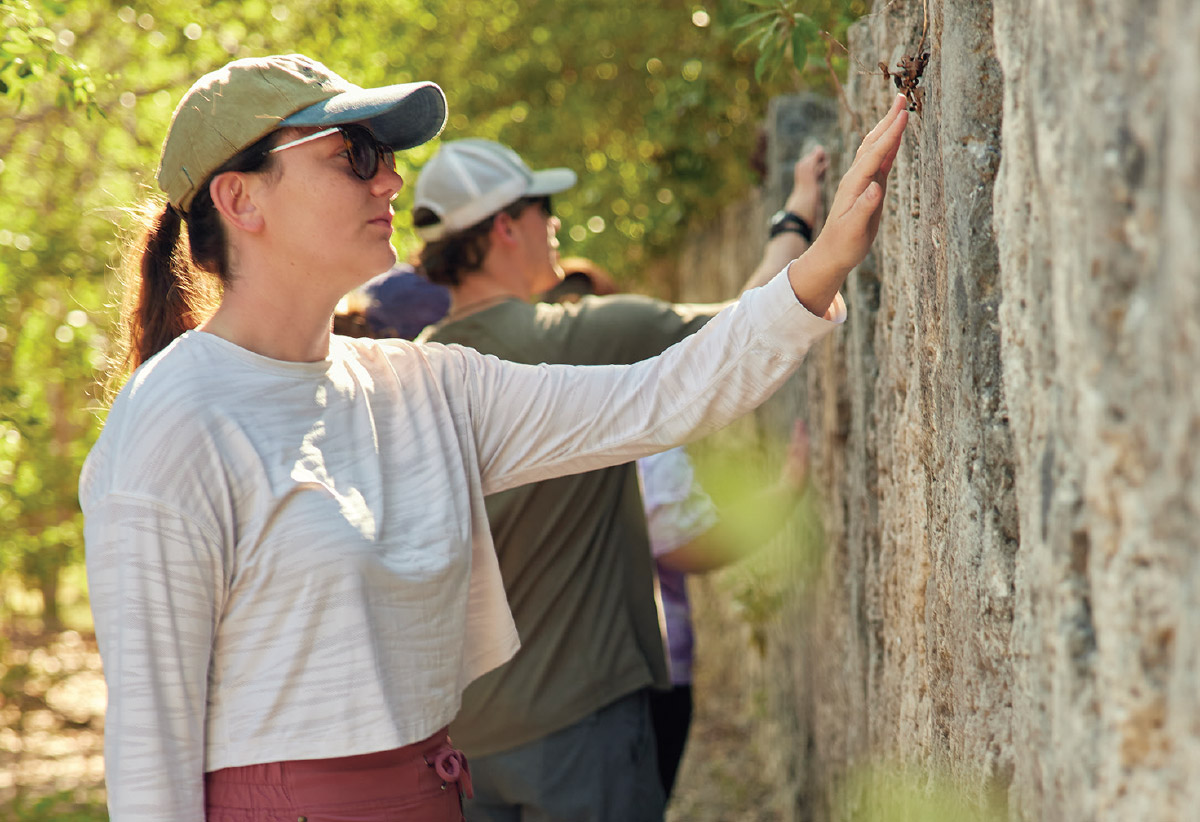
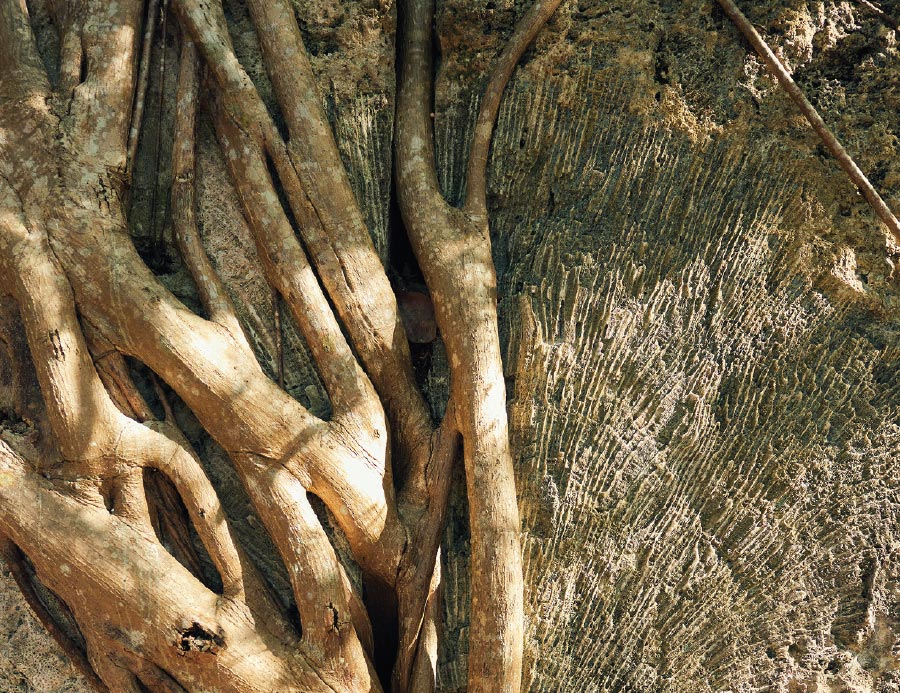
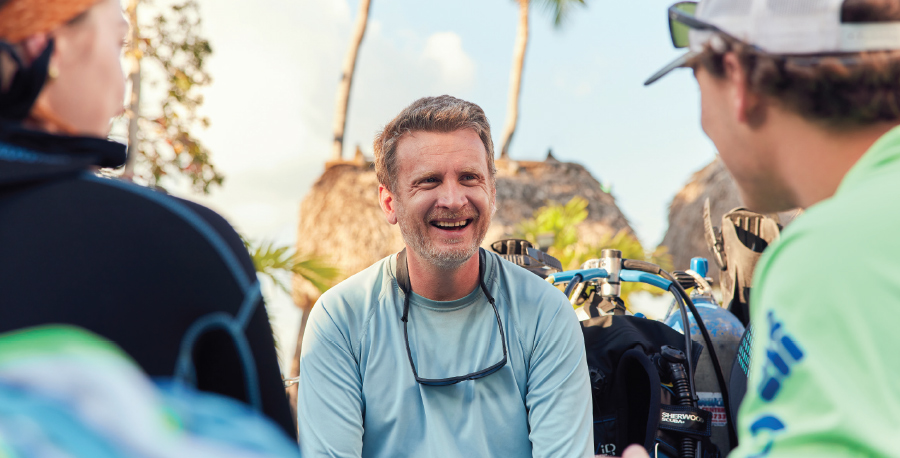

The class also kayaked through mangroves right off the dock at the field station to study the organisms growing on the prop roots. They even did a night kayak through the mangroves, which was both exciting and scary, given that crocodiles are known to live in the mangroves.
The study of coral reefs wasn’t limited to the ocean, either. Students had a Google Drive scavenger hunt at Windley Key Fossil Reef Geological State Park, where they had to find evidence of processes and organisms that they learned about in class and post a picture of them on the drive. They also visited two land-based coral nurseries associated with Mote Marine Laboratory to learn about coral restoration projects.
In addition, they did independent projects, such as measuring the predation pressure of fish that devoured bait balls made of squid hung off the dock, where they also enjoyed interacting with the manatees who came cruising by. Others, like Bryson, dissected sponges to see what organisms live inside them.
Freeman wishes he could have taken all 32 students in the class with him.
“These experiential learning opportunities are critical for students,” he says. “It’s hard to say, ‘I understand what an organism does on a reef,’ unless you’ve seen it actually carrying out this function. And for some of those organisms, it’s just so easy to observe. You can see and hear parrotfish eating algae and coral, and, with a little dye, you can visualize sponge pumping and understand their pivotal role as filter feeders.
“I try to bring that experiential component to all my classes,” he adds. “It’s hard to make those connections otherwise. Passing out coral skeletons and dead sponges in class just isn’t the same.”
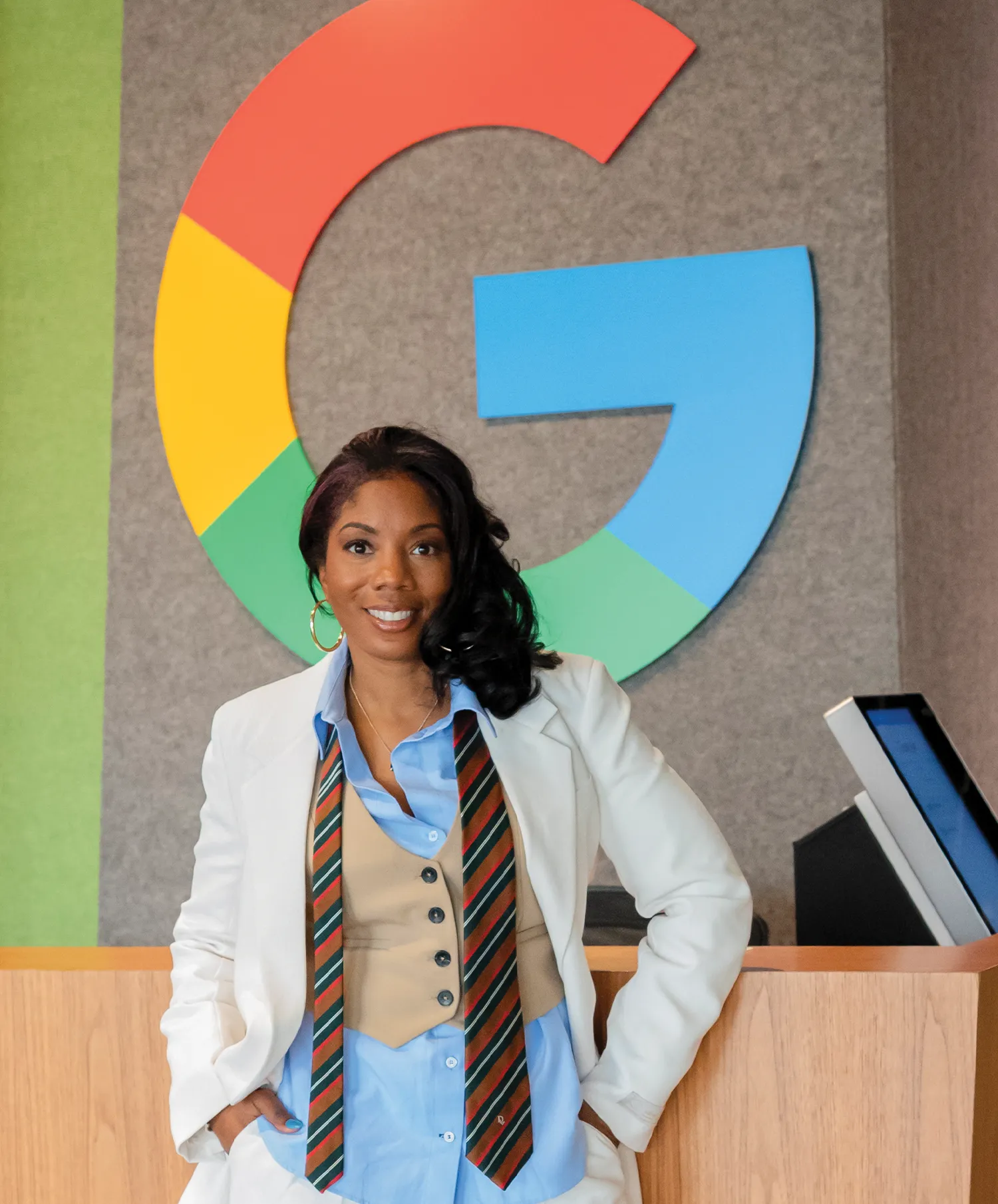
The head of global marketing efforts for developer communities at Google, Rachelle Olden ’04 is using technology, community and inclusivity to create space for something better.
Global Impact


by Alicia Lutz
All her life, Rachelle Olden ’04 has been bringing communities together so that all voices are heard,
all perspectives are included. Now an advocate for building technology that reflects and serves everyone, Olden has made some significant moves in the industry. And it’s been quite the ride.
Going Places
Olden dragged her younger sister into the newsstand at the Columbia, S.C., airport. They were on their way to the AfroTech conference in Austin, Texas – Olden for work, her sister for fun. But the highlight of the trip for both sisters was flipping through Essence magazine and finding Rachelle’s face smiling among the pages.
“To be recognized by a magazine I grew up reading – that my mother and aunties read – was deeply meaningful,” says Olden, a senior global marketing manager at Google, who was selected for the magazine’s 2023 Power 40 list of the most influential Black professionals shaping business and culture. “To be recognized for my work and my contribution in the tech space in Essence magazine was a moment of pure joy.”
Indeed, ever since her days growing up in Brooklyn, N.Y., and Columbia, S.C., Olden had dreamt of being in the publication.

What other company is a verb – and is used by billions of people every day? And what workplace has a music room, game room, nap room, gym, doctor’s office, massage studio, hair salon, jellyfish meditation lounge and free food on every floor?
“One of the special things about working at Google is definitely the offices,” laughs Olden, who is based in Seattle. “It’s a huge privilege to work for a global company that is really impacting how we live.”
Olden joined Google in 2022 to lead the multinational tech corporation’s Tech Equity Collective – an initiative she shaped to accelerate advancement in tech – and now leads global marketing efforts for developer communities.
“There are approximately 30 million developers in the world, and it is my job to bring them into our communities,” she says, adding that she is currently building an AI skills program for next-generation developers. “My work is about building community, amplifying impact and making sure people from all backgrounds and perspectives feel equipped and inspired to lead in tech.”
Another great thing about working for Google is the company’s emphasis on work-life balance, something that Olden appreciates. It gives her time to serve on the Seattle City Council Community Involvement Commission, which helps the Seattle community be more civically engaged; instruct yoga for unhoused families; be involved in the city’s arts scene; spend time with her Maltipoo, Snowii; enjoy scenic hikes; visit family in South Carolina regularly; and just appreciate the thriving city of Seattle.
“I love the life I’ve built here,” says Olden, who lives in Seattle’s Belltown neighborhood. “I’ve built a pretty good community for myself.”
She’s built a pretty good community for others as well: In 2021, she started AfroCamp, a retreat for adults to reconnect, laugh, rest and build meaningful community.
“I wanted to create a space that was joyful, healing and inviting,” says Olden, adding that in its first year, AfroCamp had 150 campers. “Imagine adults playing tug-of-war and doing arts and crafts and singing camp songs – it’s meant to be cheesy, but it’s also about intentionally giving people the opportunity to connect with each other and truly be seen. It’s a place where everyone is included.”
And Olden is all about inclusivity. She was named a 2025 global leader with the Abundance Women’s Ascend Program, which recognizes women leaders making significant contributions in technology and emphasizes the importance of diverse voices in shaping the future of technology.
“I think it’s important to see everyone in technology because technology impacts every facet of our lives, whether it’s the phone in your hand or the streaming service you use or the car that you drive,” says Olden. “All of us are interacting with technology, and for technology to be effective and to have impact, everyone needs to be part of building it, shaping it, not just using it. I think it’s instrumental that you’re bringing different lived experiences and voices together so that you can build something that actually works for everyone.”
She points to health studies where there’s a whole population left out: Those health studies can’t have real impact if they exclude an entire demographic.
“You can’t say you’re solving a problem for the world, but you’re only solving it for 50% or 25% of the world, right? You’re not really solving a problem,” says Olden, who was recently honored as one of Puget Sound Business Journal ’s 40 Under 40. “When entire communities are left out of the design, development or deployment of new technologies, the impact can be harmful. If you’re going to build technology for the world, you need to have people from the world at the table building that technology. Inclusion isn’t charity; it’s strategy.”
Finding the Space
Coming to the College of Charleston was a strategic move for Olden. And – despite regularly getting parking boots on her Nissan Altima during those days – she never stopped moving once she got there.
“I saw the College as a place where I could shape my identity, grow as a leader and build something meaningful,” says the first-generation student, who started college at age 16. “The College of Charleston was a place that I felt like I could be myself, that I could become a leader, that I could have all of the experiences that I wanted.”
That experience started with the SPECTRA (Speedy Consolidation and Transition) program, a summer bridge initiative designed to prepare students for college life.

Olden knows the value of belonging, of connecting, of community. As the oldest of five siblings, she also knew how to hold space for others while trusting her own voice as a leader. She grew up in a modest single-parent home where love, resourcefulness and resilience were fundamental.
“We didn’t have a lot, but I had everything I needed to believe in myself,” says Olden, adding that her upbringing taught her to advocate, collaborate and see beyond her immediate circumstances. “That foundation taught me how to be audacious, stay grounded and dream without limits.”
Her parents, grandparents, aunts and uncle were key in providing a supportive community.
“They gave me room to be the most unique version of myself,” she says. “They encouraged deep thinking, curiosity and confidence.” It shaped how she walked through her years at the College, too – motivating her to seek out every possible opportunity to learn, lead and connect. She worked at the Avery Research Center for African American History and Culture and in the Department of Hispanic Studies; interned with Spoleto Festival USA twice; wrote for the George Street Observer; hosted a radio show; and served as president of the Public Relations Student Society of America, vice president of the Black Student Union, a student government senator and senior class president.
“I maximized every experience that I could,” says the communication and Spanish double major. “A lot of who I am today started at the College. I built a character of service to others.”
Part of that public service was with Aya Hwe M’, the women’s empowerment organization she founded on campus.
“With Aya Hwe M’, we created a space that brought together women from campus and the surrounding Charleston community,” she says, noting that the group worked closely with the Florence Crittenton Programs of South Carolina, a support services agency with a mission of providing hope, safety and opportunity for disadvantaged pregnant young women and parenting mothers. “I noticed the contrast between our daily lives on campus and the lives of women just a few blocks away. We were in this bubble – focused on classes and campus life – while others were navigating very different challenges. I wanted to build bridges. I felt that it is my role to make space, speak up, advocate, challenge the status quo and expose others to opportunities to pursue their wildest dreams and contribute to their communities as well.”
That’s exactly what she did when she joined the Peace Corps upon graduation.
She’d first learned about the Peace Corps while she was studying abroad in Santiago, Chile – something that she was encouraged to do by her supervisor in the Hispanic studies department, the late Marti Norfleet.
“She was more than a mentor,” Olden recalls of the administrative assistant. “She was a bright light in my journey.”
As the impetus for Olden’s study abroad in Chile, Norfleet had a direct impact on that journey: During that trip, she met a Peace Corps volunteer.
“I remember running to an internet café after meeting him and googling the Peace Corps, and immediately I was like, ‘I’m doing this after school,’” she says. “I like to say that it was all interconnected. If I didn’t get the work-study in the Department of Hispanic Studies, then I wouldn’t have been encouraged to go boldly overseas, and then I wouldn’t have met the person who actually served in the Peace Corps, and then I wouldn’t have applied to the Peace Corps later.”
Olden’s Peace Corps service from 2004 to 2006 was in the Dominican Republic, where she worked with a youth development organization. After her two years there and an internship at the Clinton Foundation in New York City, she took a position with the UN World Food Programme in Liberia, supporting its ministry of education in launching parent-teacher associations for two years. From there, she spent a year in El Salvador and a year in Costa Rica leading local-level advocacy programs with World Vision International.
“Those years abroad were formative,” says Olden. “They deepened my understanding of systemic barriers, but also showed me the power of local leadership and collective action.”
These early experiences taught her how to move between different communities, advocate for others and lead with clarity and compassion. They also solidified a love for travel that would take her to 55 countries – and counting.
When she returned to the States from Costa Rica, Olden knew it was time to start thinking about going back to school.
“I wanted a degree that was going to be able to cross over into any industry,” says Olden, who was debating whether to study public administration or business. “It’s easier to take a business degree into public administration or policy than the other way around, so I decided that I was going to have more bang for my buck and more diversity of options by going to business school.”
She knew her next move.
Steering in the Right Direction
“I had already quit my job because I just knew I was going to business school,” says Olden, who had completed Management Leadership for Tomorrow, a program with a 99% success rate of getting high-potential professionals into top MBA programs. “It was humbling.”
With no job, no school and no plan, Olden chose to spend a month in the coastal town of Hua Hin. But 30 minutes into the bus ride, she started second-guessing the decision. She got off the bus, hailed a taxi back to the airport and waited 12 hours for the next flight home.
“I just sat there asking myself, ‘What do I do now?’”
Eventually, she canceled her flight again, got back on the bus to Hua Hin and stayed for the next nine months, studying for and retaking the GMAT, taking online calculus and accounting courses, volunteering at an elephant sanctuary, reading and reflecting.
“It ended up being one of the most grounding and important seasons of my life,” she says. “I learned that failure wasn’t the end – it was the beginning of a new path.”
And when it was time to start that new path back home, she reapplied to Duke University’s Fuqua School of Business and was accepted on a full scholarship. Then she reached out to Sheryl Sandberg, former COO of Facebook, and landed a role at Sandberg’s nonprofit supporting women’s ambitions, LeanIn.org, to fill the time before business school began.
Working for Sandberg, a successful woman in the tech field, encouraged the appeal of taking that route as well.
“I wanted to work in an industry that is making an impact on the way we live our lives and interact with our lives, and so technology just made sense,” says Olden. “It didn’t hurt that it was a fast-growing, high-paying industry.”
After earning her MBA at Duke in 2018, she headed to Seattle to work at Microsoft – first as a product marketing manager and then as a global industry partnerships and engagements manager – before joining Google in 2022 to lead its Tech Equity Collective and increase Black innovation in the tech industry.
“If we’re going to build good technology, I want to make sure that people understand what it is, how to use it and how to build with it to impact their lives,” says Olden. “I wanted to sit at that intersection in product marketing, where I get to work with those who are building it and those who benefit from it. I want to be a part of that story, a part of that narrative.”
Now, of course, she’s not just a part of that narrative – she’s taken a leading role that impacts where, exactly, the story goes.
“I’ve never been afraid to take the scenic route,” says Olden. “Every setback has taught me something. Every pivot has created space for something better.”
Creating spaces for something better is exactly what she wants to do.
“I want to build bold programs, stories and communities that help people transform their potential into power,” says Olden, who also advises tech and policy leaders on inclusive design and frequently speaks at conferences. “Whether it’s through tech, storytelling or shared experiences, I’m here to do work that matters.”
Impact
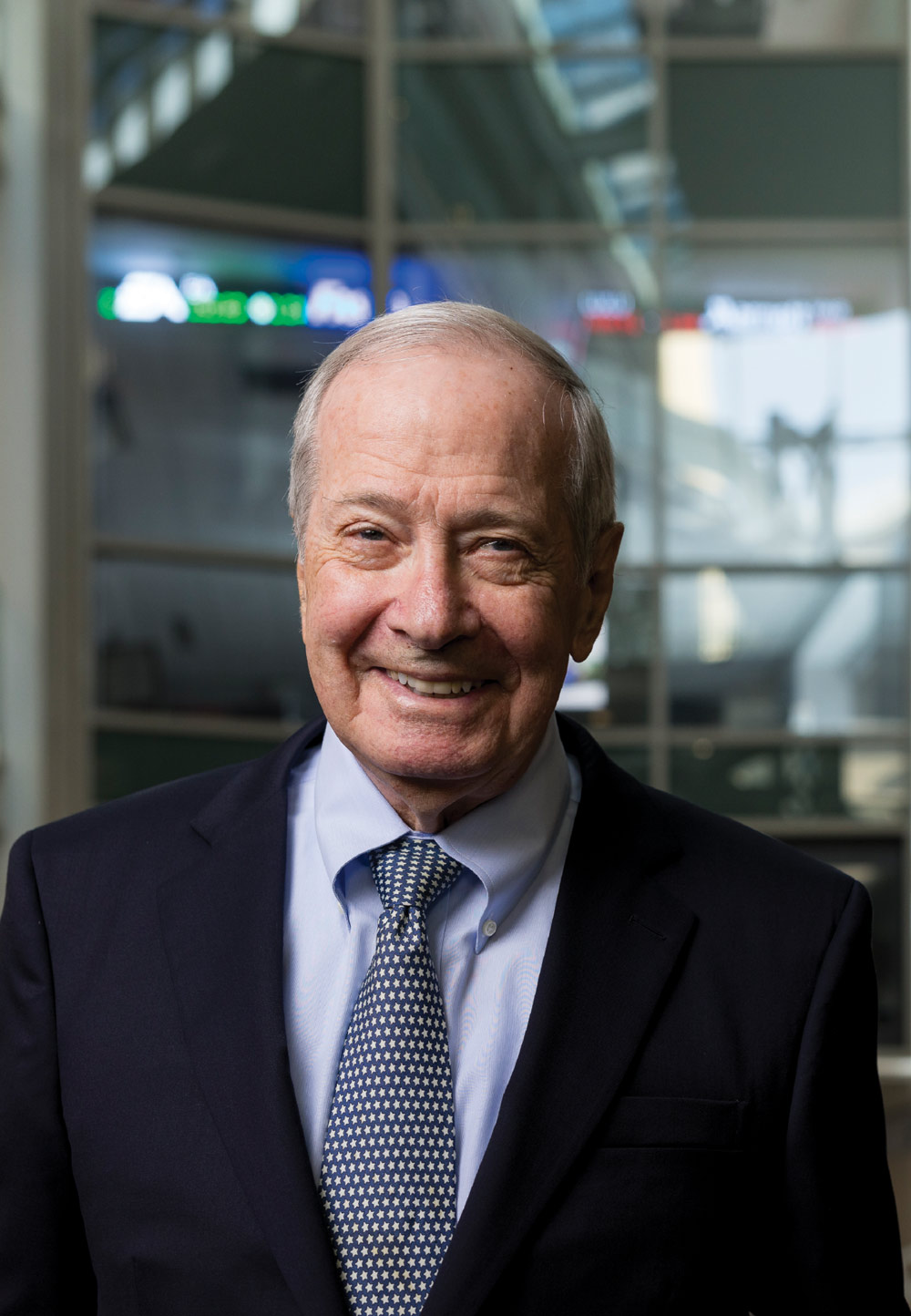
Driving Force
“I have always believed that the School of Business should be at the center of the Charleston business community,” says Finn, who first got involved with the school when it opened its doors in 1984. “It’s a great school with great faculty and remarkable students. It should be the go-to place for internships and a resource for businesses.”
To make his vision a reality, Finn became one of the initial members of the School of Business Board of Governors, and he continues to serve on the board today. He understands the value of having experts to help grow the involvement of the business community. As the chairman and CEO of AstenJohnson for more than 20 years and with an extensive C-suite network, he was just the person to do it.
“I couldn’t have asked for a better partner,” says Howard Rudd, the founding dean of the School of Business. “Bill used his global connections to support me and the faculty. He always asked the right questions and provided the resources to make things happen. Thanks to Bill and other members of the Board of Governors, the School of Business has a Student Success Center, a vibrant MBA program and now an Executive MBA program. These are a great resources both for our students and the business community.”
For Finn, his return on involvement has been exponential. He has seen the evolution of the College as a whole, watched graduates go on to leadership roles in their communities and has had friends from around the country ask about having their kids attend the College based on what he has shared. In addition, through Finn’s leadership, AstenJohnson continues to hire CofC graduates; he has also hosted economic development–related classes at AstenJohnson headquarters as well as in Europe.
Finn’s reason for everything he does at the College is the students, and he found an opportunity to have long-lasting relationships with students thanks to a proposal by Carrie Messal, now associate dean of the School of Business, to get seniors involved with the business community. A gift from Susan and Peter Schottland made the concept a reality, and the Schottland Scholars were formed in 2011.
Messal’s proposal aimed for students to be comfortable when interacting with business leadership; however, she hit a dead end when contacting companies. Instead of reaching corporate leaders, she was steered toward HR and recruiting events.
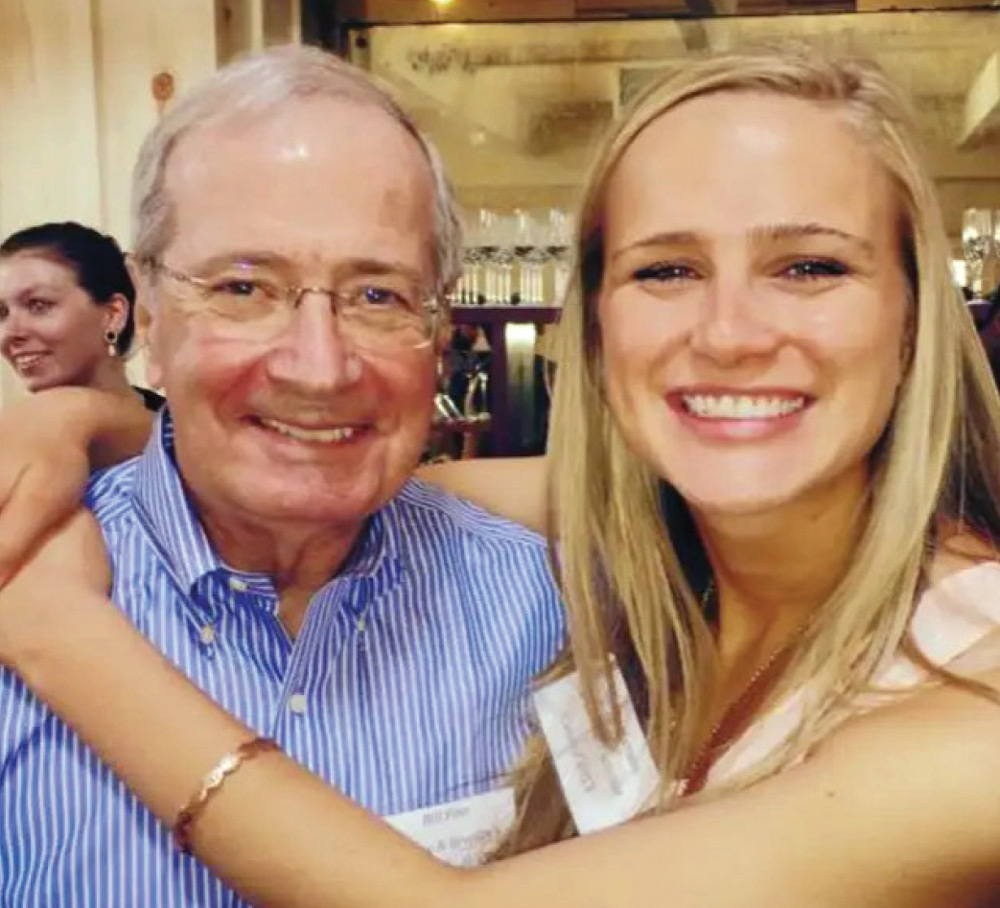

Finn set to work assigning students mentors based on their needs.
“I could see how the program was impacting the students,” says Finn, whose career with AstenJohnson began through an internship. “They were graduating with confidence because of their experience as a Schottland Scholar.”
Now an integral part of the fabric of the School of Business, Finn remains involved with the Schottland Scholars program as a volunteer and a donor. Over the past 15 years, his institutional knowledge and network have proven invaluable to the three directors.
Finn maintains relationships with Schottland Scholars alumni. Most recently he and the Schottlands met with New York City alumni, who all have a great appreciation for the fact that they are where they are today because of the program.
“Bill was formidable during the initial interview with legitimate hard-hitting questions,” recalls Lauren Tonkovich ’13. After being accepted, she quickly learned that Finn’s seriousness was because of how much he cared.
“Everything Bill does is out of a generosity of spirit,” says Tonkovich, controller at cereal manufacturer Magic Spoon. “As I’ve gotten older and struggle with work/life balance, the time and attention he gave me means so much more.”
At the New York dinner, she was pleased to see Finn supporting the new cohort of students with the same zest he had when coaching her.
Finn continues to share his connections and opportunities with Tonkovich, and she attributes much of her career success to his guidance. He plays such a key role in her life that she invited him to her wedding in 2022.
“I didn’t really match the profile on paper, and the interview was very intimidating, but Bill decided to take a risk,” says Hansen, who owns Venture in Consulting, a leadership and sales training company. “He trusted his instinct and let me in. For that reason, we have a special relationship. We have stayed in touch for more than 10 years and haven’t skipped a beat.
“Bill sees that our success will have a ripple effect in communities,” she adds. “He wants everyone to be connected and part of the community, and he wants us prepared for the real world. He gave me the ability to network by emphasizing the importance of true, good networking. It has served me well in the real world.”
Finn believes in the Schottland Scholars program so much that he formed the Finn Scholar program at his alma mater, Thomas Jefferson University.
Back at the College, Finn recently created the William A. “Bill” and Prudence Finn Endowed Scholarship for the School of Business – one more way he supports student success.
“I am eternally grateful for the scholarships I received while in college,” says Finn. “I have a great appreciation for the people who didn’t know me and still provided the funding for scholarships. It’s because of them and the students that I give back.”
Meanwhile, Finn continues to look at how to improve the School of Business.
“The business world is changing quickly, and continuing education is becoming more and more critical,” says Finn. “The time horizon on skill sets is becoming shorter and shorter. We will see an incredible change with AI, and the School of Business can play a major role in that change. I see helping people develop the skills to be more relevant as key to the school’s future success.”
The School of Business is very fortunate to have an inspirational, passionate leader like Finn, who has built bridges for the College that span the world.
“I am so grateful to celebrate Bill,” says Messal. “He has had a tremendous impact on the School of Business for the last 25 years. I can’t imagine the School of Business without the force of Bill Finn. He is the infinite mentor. Who could be more VIP than Bill?”

Service Above Self
“I was one of the department’s first hires,” says Kaiser. “Bill Bischoff, the newly appointed chair, took me under his wing and became my mentor. He inspired me to meet others where they are and support in any way I can.”
In addition to having created new courses, Kaiser shows another form of support through the Charles Kaiser Award for Outstanding Psychology Students. Established in 2018, the award has gone to seven senior psychology students who have uplifted the community.
Katie Cole, a psychology major and neuroscience and chemistry double minor in the Honors College, is the 2025 recipient. She used the award to fund her Costa Rica spring break trip to study the sociology and psychology behind the country.
“I always wondered if I would get to travel given my demanding coursework and extracurriculars, but amazingly this opportunity crossed my path,” says Cole, “and, thanks to the Kaiser Award, I was able to experience this once-in-a-lifetime trip.”
Cole, who wants to become a neurologist and research Parkinson’s disease, was struck by how many people with Parkinson’s have a long wait to see a neurologist. She chose her field to help ensure timely care for Parkinson’s patients, and her community involvement as a camp counselor for students with severe neurological disabilities solidified her path.
Cole’s dedication to improving the community is exactly why Kaiser created the award.
Kaiser’s motto is “service above self,” which comes from his decade with the Charleston Rotary Club.
“As a Rotarian, Charles volunteered his expertise and time to serve the community, and as one of the founding members of the Retired Faculty and Staff Council, he supported the connections among retired colleagues,” says Sue Sommer-Kresse, former dean of admissions, among numerous other roles at the College. “Through action, he demonstrates loyalty to the College, his students, the community and to his colleagues and friends.”
Kaiser credits where he is in life to people who put others before themselves: “It’s my calling to support others with what I have. Helping others is the key to making the world a better place, which is why philanthropy is so important.”
Kaiser has also earned great respect from the Department of Psychology.
“Charles is a positive force whose passion for psychological science, his students and his colleagues is both obvious and contagious,” says Cindi May, professor of psychology.
Adds Garrett Milliken, chair of psychology: “As a leader and the longest-serving member of the psychology department, Charles has fostered a genuine sense of collegiality and care that defines the spirit of cooperation we share today. He also played a crucial role in psychology becoming the College’s most popular major.”
Kaiser’s commitment to bettering the community and nurturing the growth of others is a legacy that will live on for years to come. His influence continues to shape of the College.
“On a personal level, Charles is kind, generous, sincere and deeply caring – qualities we should all aspire to emulate,” says Milliken. “We are truly grateful for him.”

Game On
Donor challenges incentivized giving by unlocking gifts.
- Mark Buono ’81 and Judy Buono ’22 (M.Ed.) gave a $50,000 gift at the 1,000-donor milestone.
- The Zucker Family Challenge awarded $100,000 when the number of donors reached 1,500.
- Laurie Minges ’83, president of the Alumni Association, supported the Alumni Greek Life Scholarship with a matching gift once donations reached $5,000.
- Edward Tuccio ’91 provided a match and a challenge for alumni who graduated within the last 10 years: $5,000 matched the donor’s designation, and $10,000 was unlocked when 150 recent graduates made a gift.
- Johnnie ’92 and Michelle Baxley’s matching gift of $2,500 to encourage faculty and staff giving was met within 30 minutes.
- In honor of the decade Johnnie graduated, the Baxleys supported the ’90s Happy Hour Power Hour with a gift of $3,000 when 100 ’90s alumni donated.
The Baxleys also supported the inaugural student scavenger hunt for 10 plush Clyde the Cougar toys. Students who found a hidden Clyde could direct $250 to the area of their choice.
Justin McLain ’98 funded a friendly competition among schools and units for the second year with the winning teams receiving gifts to their excellence funds for outstanding CofC Day results. The School of the Arts received $30,000 for the largest number of donors and most dollars raised: 189 and $65,235, respectively. The School of Languages, Cultures, and World Affairs received $15,000 for the highest percentage of alumni participation: 3.28%. CofC Libraries received honorable mention and was awarded $5,000.
This year, schools and units enlisted creative ways to engage their donors. Playing on the “Level Up Your Impact“ theme, LCWA tapped as its spokeswoman the globetrotting criminal mastermind from the popular 1990s video game Where in the World Is Carmen Sandiego? Megan Oldak, LCWA communication and marketing coordinator, created the social media game “Where in the World is Dean Arias Sandiego?” The students who found Dean Aimee Arias, who was dressed like Carmen Sandiego, won CofC swag.
“It really was a team effort,” says Oldak, noting that LCWA increased its donors by 12% and grew its social media followers. “It was nice to see how many people were willing to join in on the fun. We’re excited about the next CofC Day.”
“CofC Day continues to serve as a fun way to engage with the College and give back,” says Dan Frezza, chief advancement officer. “We are so grateful for the philanthropic spirit of our alumni, parents, students, faculty, staff and friends. Our day of giving makes it possible for the College to continue to provide students with an excellent liberal arts and sciences education.”

Honors Bound
“We are honored to be able to support the College of Charleston, an exemplary partner in our vibrant local community,” say Lawrence and Lucy Guffey, “and to provide more young leaders with the opportunity to benefit from the rigor and richness of its outstanding honors program.”
The Charleston Fellows have a long history of leadership and success. In the past decade, nearly 50 nationally competitive awards have been granted to Charleston Fellows, including 11 Goldwater Scholarships, eight Fulbright Awards, four Rotary Ambassadorial Global Grants and four Hollings Scholarships from the National Oceanic and Atmospheric Administration.
Charleston Fellows tend to be leaders not only on campus, but also in the local community. The program’s student-led executive board regularly coordinates community engagement projects, including an ongoing partnership with the local Ronald McDonald House, where members cook meals for the 40 or so guests each month. Recent projects include Cougar Votes, a voting advocacy program, and a local chapter of the Backpack Project, which supports those experiencing homelessness.
“The Honors College is incredibly fortunate that the vision of the Guffeys includes investing in future leaders through our top scholars program, the Charleston Fellows,” says Beth Meyer-Bernstein, dean of the Honors College. “Life-changing scholarships like the Guffey Family Foundation Scholarship are making the College of Charleston a destination for the country’s most impressive young minds. They’re coming to a world-class city and experiencing a world-class education. And, thanks to people like the Guffeys, they’ll receive the personalized guidance and resources needed to develop into innovative and empathetic leaders of tomorrow.”
ALUMNI NOTEBOOK
-
GOLD HIGHLIGHTED ALUMNI ARE RECENT DONORS TO THE COLLEGE
-
1960
Capt. John Condon (Ret.) served 30 years in the U.S. Navy as an aviator and flight officer, among other roles. From 1985 to 1988, he was commander of the Guantanamo Bay Naval Base. He resides in Palmyra, Va.
-
1975
Patty Drew Drews and Marc Drews ’76 retired after education careers of more than 30 years. Mr. Drews is now director of experiences and education at EdVenture. The couple resides in Columbia, S.C.
-
1978
Larry Gale and his wife, Margaret, published A Holy City Christmas: Charleston Holiday Tales in October. They reside in Charleston.
- Hidefumi Katsuura recently published a mathematics textbook, Introduction to Analysis: Theorems and Examples. A professor emeritus at San José State University, he resides in Berkeley, Calif., with his wife, Frances.
-
1981
Carol Parker Hieronymus has joined the Chattanooga Area Food Bank board of directors. She is a retired financial services executive who resides in Hixson, Tenn., with her husband, John.
-
1982
Ron Cooper is a senior professor of philosophy and humanities at the College of Central Florida. His poem “Speaking of Love” was recently published in Bronze Bird Review. He and his wife, Sandra, also published an anthology, Wild Wind: Songs and Stories Inspired by the Songs of Robert Earl Keen. They reside in Ocala, Fla.
-
1985
Shirley Koven Bachman is a managing director for commercialization and market access at Avalere. She and her husband, David, reside in Wildwood, Mo.
-
1986
Bill Haskin began his term on the College of Charleston Foundation board of directors in July 2024. He works in sales at Patriot Timber Products and resides in Sullivan’s Island, S.C., with his wife, Elizabeth.
-
1987
Chanele Henry Jackson was named chair of the board of directors for Fearless Brown Girls Inc. in October. She resides in Fort Mill, S.C.
-
1988
Richard Maclean, a founding partner of Frontier Growth, began his term on the College of Charleston Foundation board of directors in July 2024. He and his wife, Holly, reside in Charlotte, N.C.
- Stanley Davis is an administrator at the Sheriff Al Cannon Detention Center in North Charleston and resides in Moncks Corner, S.C.
-
1989
Pete Krug is a senior information technology manager for Vanguard. He and his wife, Tammie, reside in Charlotte, N.C.
- Mark Stenhouse has been appointed a board observer and adviser to Abivax. He resides in Sullivan’s Island, S.C., with his wife, Jeri.
-
1990
Anna Hutto joined Episcopal Relief & Development as its chief external relations officer last September. She earned her master’s in divinity from Emory University and resides in Atlanta.
- Elizabeth Lybrand was named director of financial services at Dorchester School District 2 in Summerville, S.C., after being its comptroller for nearly 30 years. She and her husband, John, reside in Summerville.
- Tony Lessington is a technical engineer at CACI International in North Charleston. He and his wife, Deborah, married in January. The couple resides in Moncks Corner, S.C.
-
1991
Edwin McCain is a recording artist and singer/songwriter who resides in Greenville, S.C. In September, he was made an honorary deputy with the Charleston County Sheriff’s Office.
- Edward Tuccio, a retired chief operating officer of real estate development companies, began his term on the Charleston College Foundation board of directors in July 2024. He and his wife, Kimberly, reside in Ridgefield, Conn., with their son.
-
1992
Steve Agazzi is the golf course superintendent at the Charleston Municipal Golf Course. He and his wife, Jennifer, reside in Charleston.
- George Whitehurst is a lead associate and senior proposal manager at Booz Allen Hamilton. He earned his master’s in mass communication from the University of Georgia and resides in Fredericksburg, Va., with his wife, Dawn.
- Catherine Paige Riley is a director of mass spectrometry research and analytics at BioAnalysis. She resides in Philadelphia with her husband, Charles.
- Kimberly Pyszka is an associate professor of anthropology and chair of the sociology, anthropology and social work department at Auburn University at Montgomery, Ala.
-
1993
Carl Blackstone, the president and CEO of the Greater Columbia Chamber of Commerce, began his term on the College of Charleston Foundation board of directors in July. He and his wife, Mary Heckard Blackstone ’96, reside in Columbia, S.C., with their children.
- Erica Henderson Brown began her term on the College of Charleston Foundation board of directors in July 2024. She has worked in marketing and communications in Canada and the United States, and is a member of CofC’s Student Affairs Board of Advocates. She and her husband, Christopher, reside in Birmingham, Mich., with their children.
- Andie Paradis Freeman is a content and social media manager for the North Carolina Arts Council. She and her husband, McGeath, reside in Raleigh, N.C.
- Jennifer Streaks is a senior personal finance reporter for Business Insider. She earned an MBA from Johns Hopkins University and a law degree from Howard University. She resides in Brooklyn, N.Y.
- Suzanne Lowry is a volleyball referee. In December, she was the first referee for the NCAA Division I Women’s Volleyball Championship match between Penn State and Louisville. She and her husband, Keith Murlless, reside in Lyman, S.C.
- Summer Sparkman Johnson (see Jim Johnson ’97)
-
1994
Jonathan Hayes, an attorney and managing partner at Goldstein Hayes and Lina, began his term on the College of Charleston Foundation board of directors in July 2024. He and his wife, Tara, reside in Atlanta.
- Daniel Powell is a computer security specialist at Integrated Finance & Accounting. He earned his master’s in information technology management from Webster University and resides in Mt. Pleasant with his wife, Melanie.
-
1995
Alyssa Rakovich Fiumano is an accredited investment fiduciary and a senior vice president and senior relationship strategist at PNC Private Bank in Sarasota, Fla. She married Paul Fiumano in 2023. The couple resides in Bradenton, Fla.
- Patrick Ford is vice president and international marketing director for Ford’s Produce, whose gourmet foods division was recently named North American Marketer of the Year by the North American Agricultural Marketing Officials. He and his wife, Elizabeth, reside in Raleigh, N.C., with their three children.
- Jonathan Gray and his indie rock band Jump, Little Children, were inducted into the Lowcountry Music Hall of Fame on Oct. 6, 2024. He has played double bass for the band since 1995.
- Kara Shadwick Museler was named to the 2024 Forbes Top Women Advisors Best-in-State list. She is a senior vice president of wealth management with the Hilton Group of UBS and resides in Jamestown, R.I., with her husband, Chris.
- Marty Stockdale is an after-sales specialist with the ALMACO Group. He and his wife, Christine, reside in Coral Springs, Fla.
- Chris White is a vice chairman and Southeast region lead at Savills North America. He completed a Harvard Graduate School of Design Executive Education program in 2024. He and his wife, Jennifer, reside in Atlanta.
-
1996
Mary Heckard Blackstone (see Carl Blackstone ’93)
- Liza Browning Cobbs has enrolled in the MBA program at Fitchburg State University with plans to graduate in 2026. She is a police operations support technician for the U.S. Army and resides in Wiesbaden, Germany.
-
1997
Art Fisher is the U.S. ambassador to Austria and president of Fisher Realty, his family’s real estate firm, which was founded in 1977.
- DaNine Jenkins Fleming (M.Ed.) was named a 2024 What Women Bring healthcare honoree by the YWCA Greater Charleston. An associate chief officer for inclusive excellence and a tenured professor at the Medical University of South Carolina, she resides in Summerville, S.C., with husband Travis.
- Jim Johnson was named a 2024 South Carolina State Star by South Carolina Small Business Development Centers. He has been a senior business consultant with SC SBDC since 2015. He and wife Summer Sparkman Johnson ’93, reside in Orangeburg, S.C.
- Henry Leventis is a partner in the law firm Holland & Knight’s health care regulatory and enforcement practice. He and his wife, Kelly, reside in Nashville, Tenn., with their children.
- Kevin Price is the global head of enterprise asset management at IFS. He and his wife, Valerie Harper Price, reside in Fountain Inn, S.C., with their children.
- Mike Sheahan is a senior director of business development at Softility. He resides in Smyrna, Ga.
- Techa Smalls-Brown is an adjunct professor at the College and the director of the School of Education’s Sisters of Septima program. She earned a master’s in curriculum and instruction from Concordia University in 2020 and is pursuing a doctorate from Antioch University. She resides in North Charleston with her husband, Michael.
-
1998
Kimbi Marenakos is a national board-certified family nurse practitioner, a behavioral health specialist and the owner of The Wellness Loft. She earned her doctorate in nursing practice from MUSC. She resides in Charleston with her son.
- Kerry Nale Spitze is a senior director of corporate partnerships at Bowling Green State University. She resides in Perrysburg, Ohio.
- Lori Williams Swan was named to the Charleston Regional Business Journal’s 2024 Women of Influence list. She is a senior vice president and senior commercial relationship manager at United Community Bank and resides in Hanahan, S.C., with her husband, Chadwick, and their daughter.
-
1999
Stephanie Alexander published her first novel, Mean Low Water, last August. She is a family law attorney at Theos Law Firm and resides in Daniel Island, S.C., with her husband, Jeffrey.
- Rochelle Rogers Altman, joined the College’s faculty as a visiting instructor in the Department of Health and Human Performance last August. She and her husband, Jonathan, reside in Sullivan’s Island, S.C., with their children.
- Heather Trantham Davidson is a director of medical affairs strategy at Boehringer Ingelheim. She and her husband, Brian Davidson, reside in Charleston with their three sons.
- Chip Robinson (M.S. ’04) is the lead pastor at King’s Cross Church. He earned his master’s in divinity from Southeastern Baptist Theological Seminary in 2016 and resides in Mt. Pleasant with his wife, Kristen.
-
2000
Marvell Adams is CEO at Caregiver Action Network. He earned his master’s in health administration from the University of North Carolina at Chapel Hill and resides in Baltimore with his wife, Karoline, and their children.
- David Cabrera is chief of staff at the Van Andel Institute and president of the Association of Independent Research Institutes. He resides in Wyoming, Mich., with his two daughters.
- Ryan Clark is a managing director of Pyxl’s new Charleston office. He and his wife, Katherine Parker Clark ’03, reside in Charleston.
- Jamie Guyan is a vice president at Planned Furniture Promotions. He and his wife, Deniece, reside in Mt. Pleasant with their two daughters.
- Kimberly Conrad Saari owns Quarry Cove Retreat, a lakefront resort in East Tennessee. She and her husband, Benjamin, reside in Mooresburg, Tenn.
- Amy Trodglen Southerland (M.P.A. ’17) is a director of livability and tourism for the city of Charleston. She and her husband, David, reside in Summerville, S.C.
-
2001
Tonya Cockcroft is a clinical pharmacist prescriber at Pihanga Health. She earned her postgraduate certificate in clinical pharmacy in prescribing from the University of Auckland in 2019 and resides in Whitianga, New Zealand.
- Amanda Bunting Comen’s business Social ABCs was a finalist for Best Public Relations Firm in Charleston Regional Business Journal’s annual reader rankings for the second consecutive year. The firm was also named a Shining Social Media Professional finalist in Charleston Women Magazine’s inaugural She Shines Awards. She and her husband, Kyle Kyle Comen ʼ02 (M.A. ʼ10), reside in Charleston with their son.
- Cary Ann Hearst and her husband, Michael Trent – the musical duo Shovels & Rope – were inducted into the Lowcountry Music Hall of Fame on Oct. 6. The couple resides in Johns Island, S.C.
- Blake Youmans is the CEO of Dynamic Stem Cell Therapy. He lives in Las Vegas with his wife and child.
-
2002
Liz Berry is a State Farm insurance agent and owner of Landmark Landscape Services. She earned the chartered financial consultant designation in 2024 and resides in Simpsonville, S.C., with her husband, Steven.
- Kyle Comen (M.A. ’10) (see Amanda Bunting Comen ’01)
- Jessica Shuler is the executive director of financial services for the Charleston County School District and resides in St. George, S.C.
- Brandon Hair is vice president of operations at Retirement Living Associates. He earned his master’s in health administration from MUSC and resides in Raleigh, N.C., with his wife, Julie Freeman Hair ’05.
- Victoria Hartsock joined the patent law firm FIG. 1 as an intellectual property paralegal in September 2024. She resides in Spokane, Wash.
- Edward Leonard is the founder and music director of the Chamber Orchestra of Pittsburgh. He has a master’s in orchestral conducting from Carnegie Mellon University.
- Stephanie Owens Price was inducted into the Brookland-Cayce High School Athletics Hall of Fame in November. She played softball at the College and resides in Gilbert, S.C.
- Heather Murphy Woolwine (M.A. ’11) is director of communications for the town of Hilton Head Island, S.C.
-
2003
Laura Ball is director of music at Holy Spirit Catholic Church in Johns Island, S.C. She earned a master’s from Goddard College. She married Colin Skinner in 2023, and the couple resides in Charleston.
- Brandi Hester Barnhill is a brand ambassador at EllieMD. She and her husband, Hamp, reside in Lexington, S.C.
- Joseph Brown III is an associate dentist at Godley Station Dental. He resides in Hardeeville, S.C., with his two sons.
- Katherine Parker Clark (see Ryan Clark ’00)
- Christina Demos Wynn is a partner at the law firm Duggan Wynn, practicing estate planning and probate. She and her husband, Baron, reside in Mt. Pleasant with their daughter.
-
2004
Lori Atkinson is a director of development at Charleston Collegiate School. She resides in Johns Island, S.C.
- Tanja Betzler-Guerra is a chief human resources officer at Alpha Omega Integration. She and her husband, Dennis, reside in Ashburn, Va., with their two daughters.
- Adrienne Helms received an Advancing Compliance and Ethics Award from the University of New Mexico in November. She is UNM’s Clery program coordinator. She earned her master’s in urban and regional planning from Virginia Tech and resides in Albuquerque, N.M.
- Charles Odom is an enforcement project and environmental health manager for the S.C. Department of Environmental Services. He earned a master’s in public administration from Walden University in 2023 and a graduate certificate in herbal medicine from the American College of Healthcare Sciences in 2024. He lives in Columbia, S.C.
- Chris Rivers is a dentist at Rivers & West Family Dentistry. He earned his dentistry degree from MUSC and resides in Mt. Pleasant with his wife and three children.
- Dave Trausneck is a senior manager of public relations and external communications at Aidoc. He married Amanda Trausneck in November. The couple resides in Baltimore.
- Jim Tunnessen is the chief information officer and chief artificial intelligence officer for the National Endowment for the Arts in Washington, D.C. He and his wife, Stacie, reside in Potomac Falls, Va., with their two sons.
-
2005
Gaëlle Blanvillain (M.S.) joined the College’s faculty as a visiting assistant professor in the Department of Biology in August. She earned her doctorate in biological sciences from Virginia Tech in 2024 and resides in Charleston.
- Meghan Brinson is a full-time lecturer of law at the University of Illinois at Urbana-Champaign. She earned her law degree from the University of North Carolina at Chapel Hill in 2022 and resides in Champaign, Ill., with her husband, Tony Ghiotto, and their two sons.
- Emily Ferraro Broome (see Joshua Broome ’06)
- Derek Estep was elected district attorney of Washington County, Texas. He and his wife, Lauren, reside in Brenham, Texas.
- Julie Freeman Hair (see Brandon Hair ’02)
- Sarah Neely Lanier is a district court judge with the North Carolina Administrative Office of the Courts who was recently elected to the NC District Court Judges Association board of governors. She and her husband reside in Asheboro, N.C., with their son.
- Brandon Norwood (see Jessica Forman Norwood ’07)
-
2006
Anderson Bowes is a principal client partner at Dayforce. He married Taylor Ford ’15 in 2024. The couple resides in Chester Springs, Pa.
- Joshua Broome is a real estate agent with the Cassina Real Estate Group. He and his wife, emily ferraro broome ʼ05, reside in Charleston.
- Annaleigh Porter is a Cayuga Nation Tribal Court judge. She resides in Syracuse, N.Y.
- Erin Yates is the owner and founder of Lounge With Us, an in-person and online lifestyle boutique. She resides in Charleston.
-
2007
Sarah Exell began her term as a fellow on the College of Charleston Foundation board of directors in July 2024. She is a certified financial planner and wealth management adviser with Merrill Lynch Wealth Management. She also serves on the Student Affairs Board of Advocates at the College and resides in Johns Island, S.C., with her husband, Eric Boettcher.
- Ryan Law Johnson is a nurse practitioner and recently opened her own mental health practice, Law of Tranquility, in Summerville, S.C. She earned her doctorate in nursing practice from MUSC in 2022 and resides in Summerville with her spouse and daughter.
- Kristen Lanier was named to the Charleston Regional Business Journal’s 2024 Women of Influence list. She is a client development manager at Terracon and resides in Moncks Corner, S.C.
- Bristow Marchant is a journalist for The State newspaper in Lexington, S.C., where he covers local government, schools and the community.
- Jessica Forman Norwood is a strategic consultant at RevShoppe. She and her husband, Brandon Norwood ’05, reside in Franklinton, N.C., with their children.
- David Stasiukaitis (see Amy Mixson Stasiukaitis ’11)
-
2008
Whitney Hinds Coble is a startup relations adviser for Orrick, Herrington & Sutcliffe law firm and resides in Columbia, S.C.
- Elizabeth Hetherington is a teaching professor at Scripps Institution of Oceanography at the University of California, San Diego. She earned her doctorate in biological science in 2018 and resides in San Diego.
- Jermaine Johnson, a member of the South Carolina House of Representatives, released a documentary about his life’s journey, I Got Myself a Yard. He and his wife, Evan McDonald Johnson ’11, reside in Columbia, S.C., with their children.
- Melissa Cohen Kegan is executive vice president of operations at Dentsu. She and her husband, Stuart, announce the birth of a daughter in January. The family of three resides in Richmond, Va.
- Kathryn Pedings-Behling (M.S. ’12) is an instructor in the College’s Department of Mathematics. She is pursuing her doctorate in educational practice and innovation with a concentration in science, technology, engineering and mathematics education from the University of South Carolina. She resides in Charleston with her husband, Ted, and their three children.
- Mike Seager is an attorney with Nelson Mullins Riley & Scarborough in Los Angeles. He earned his law degree from Southwestern Law School in 2023 and resides in Studio City, Calif., with his wife, Nahal, with their two daughters.
-
2009
Jeanmarie Tankersley Ethridge is a litigation partner at Clawson & Staubes and resides in Greenville, S.C., with her husband, Trip, and their daughter.
- Jeff Evans is director of government affairs and policy at the Institute for Portfolio Alternatives and resides in Arlington, Va.
- Michael Johnson (M.A.T.) is the choir director for the Kershaw County School District. He earned his master’s in educational administration from Grand Canyon University in 2023 and resides in Camden, S.C.
- Jessica Fuller Manley is a senior vice president of sales at iHeartMedia and resides in Arden, N.C., with her husband, Weston.
- Kurtis Miller (M.A.) is an assistant dean in the humanities division at Tusculum University. He earned his doctorate in communication from Purdue University and resides in Greeneville, Tenn.
- Anne Thorsen is the head of service delivery at Hackensack Meridian Health and resides in Savannah, Ga.
- Jake Winquist is a principal for strategy and management consulting at RSM US. He also is an adjunct professor at the University of San Diego Knauss School of Business and resides in Poway, Calif., with his wife, Grace.
-
2010
Jamilia Brevard is a seventh-grade special education teacher at A.R. Rucker Middle School. She was named the school’s 2024 Teacher of the Year and resides in Heath Springs, S.C.
- Rose Christ was named to City & State New York’s inaugural Arts & Cultural Power 100 list. She is the managing director and New York practice co-chair of Cozen O’Connor Public Strategies and resides in Elmsford, N.Y., with her wife, Heather, and their son.
- Laura Cook is a pediatric psychologist at Nationwide Children’s Hospital. She earned her doctorate in clinical psychology from the University of Southern Mississippi in 2015 and resides in Westerville, Ohio.
- Quinn English (see Alexandra Moor English ’11)
- Caroline Eubanks has published her second book, A Boozy History of Atlanta: People, Places & Drinks that Made a City. She resides in Marietta, Ga.
- Barnwell Fishburne is an attorney and the owner of Fishburne Law Office and resides in Charleston with his wife, Alexis McHarg Fishburne ’16.
- Maggie Hendricks is the director of advancement for the Boys and Girls Clubs of Southern Maine. She acquired a professional certificate in fundraising leadership from Indiana University and resides in South Portland, Maine.
- Jay Jordan is a safety consultant at Life and Safety Consultants. He and his wife, Ashley, married in 2023. The couple resides in Greenville, S.C.
- Porsha Malin is a senior scrum master at Wells Fargo and resides in Charlotte, N.C.
- GP McLeer received the Excellence in Community Outreach award at the 2024 Transportation Association of South Carolina annual conference. He is the mayor of Fountain Inn, S.C.; executive director of the Upstate Mobility Alliance; and cofounder of Pecan Public Relations. He and his wife, Taylor, reside in Fountain Inn with their daughter.
- Bretticca Moody joined the American Federation of Teachers as its assistant director for higher education. She is pursuing her doctorate in leadership studies from North Carolina A&T University and resides in Washington, D.C.
- Lauren Redpath is a trait-testing scientist with Pairwise who developed the world’s first seedless blackberry. She earned a doctorate in horticultural science from NC State in 2021 and resides in Holly Springs, N.C.
- Sam Tano published her first novel, In the Valley, A Shadow, in 2024. She and her wife, Kelly, reside in Cranston, R.I.
-
2011
Alexandra Moor English is the chief advancement officer of the American College of the Building Arts. She and her husband, Quinn English ’10, reside in Charleston with their daughter.
- Steven Holshouser is a vice president of business development at Proteros. He and wife Sarah announced the birth of their daughter in March 2024 and live in Swampscott, Mass.
- Evan McDonald Johnson (see Jermaine Johnson ʼ08)
- Kenzie Rosen-Stone is the artistic director at the Arts Hub. She and her husband, Taylor Pratt-Thomas, reside in Lafayette, Colo., with their two daughters.
- Amy Mixson Stasiukaitis was named to Charleston Regional Business Journal’s 2024 Women of Influence list. She is the chief of staff for Low Country Case & Millwork and resides in Summerville, S.C., with her husband, David Stasiukaitis ’07.
- Brooke Warden is the owner and founder of the Pink Cactus restaurant in Charleston, where she resides.
-
2012
Alyssa Aitken Banholzer is an account executive for corporate gifts at Quince who married Chris Banholzer ’13 in 2021. They announced the birth of their son in 2022 and reside in Marstons Mills, Mass.
- Heather Bybee is a visual merchandiser at Bloomingdale’s and resides in New York City.
- Abigail Darlington was named to Charleston Regional Business Journal’s 2024 Women of Influence list. She joined the STEM Next Opportunity Fund as its director of communications in August and resides in Charleston.
- Emily Gallo is the chief of staff at the South Carolina State Museum. She was included in Columbia Business Monthly’s Best and Brightest Columbia list for 2024 and resides in Columbia, S.C.
- Jordan Homan is a senior software engineer at unstructured.io. and resides in Charleston.
- S.O. Jeffcoat is the arts education director at the South Carolina Civil Rights Museum in Orangeburg, S.C. She earned a doctorate in information science with a focus on digital engagement in arts nonprofits from the University at Albany in September and resides in Columbia, S.C., with her husband, Adebayo, and their daughter.
- Brittany Morra Quinn is a sustainability specialist for the state of North Carolina. She and her husband, Daniel, reside in Williamsburg, Va.
- Winema Sanders is a work-life and financial educator at Joint Base Charleston and resides in Goose Creek, S.C., with her son.
- Claire Shields Sugg and her husband, Adam, opened Synergy HomeCare of Kinston, N.C., in 2024 and reside in La Grange, N.C.
- Huey Waldon (see Tatiana Hoover Waldon ’15)
- Elyse Chubb Welch was named to Charleston Regional Business Journal’s 2024 Women of Influence list. She is a partner at Carolina Retail Experts and resides in Mt. Pleasant with her husband, Justin.
- Huey Waldon (see Tatiana Hoover Waldon ’15)
-
2013
Jeff Aschieris earned his MBA from the University of Southern California in May 2024 and is a vice president and client adviser at Whittier Trust Co. He and his wife, Madeline, announce the birth of their first child in September 2024. The family resides in Costa Mesa, Calif.
- Chris Banholzer (see Alyssa Aitken Banholzer ’12)
- Richard Duncan is the neighborhood program director at Stanford University and resides in San Francisco.
- Sarah Hall Grady (see Seamus Grady ’17)
- Julie King is an evaluation support consultant for the Inter-American Development Bank and resides in Chevy Chase, Md.
- Marion Lake opened a private practice, Another Chance Psychotherapy & Consultation Services, and resides in Charlotte, N.C.
- Susan Luna-Hazlewood (M.P.A.) became a fellow on the Collegeʼs Foundation Board of Directors in July 2024. The director of the Crawford Alumni Center at Tennessee Technological University, she resides in Cookeville, Tenn., with her husband, Michael.
- Ethan Marrow is a senior automation specialist at Merck and resides in Durham, N.C.
- Bennett May is an associate at Foster Garvey in the firm’s business and corporate finance practice. He earned his law degree from the University of Florida in 2024 and resides in Portland, Ore.
- Dyanne Vaught is an economist for the U.S. Department of the Treasury. She married her husband, Justin, in 2023 and earned doctorates in economics and public policy in 2024 from the University of Michigan. The couple resides in Washington, D.C.
-
2014
Brian Ackerman is a federal police officer for the Department of Defense and resides in Honolulu.
- Justin Aranda is a senior events marketing strategist at Obviouslee, covering professional tennis and golf events. He resides in West Hollywood, Calif.
- Maddi Edwards Bednar is the associate director for early engagement at Princeton University’s Center for Career Development. She and her husband, Parker Bednar, reside in Milltown, N.J., with their daughter.
- John Curtis is a systems security engineer in the College’s information technology department who earned a law degree from the Charleston School of Law in 2024. He resides in Charleston.
- Sam Dahabi is a wedding photographer in Kihei, Hawaii.
- Marke DeCristoforo is a lobbyist for the Conservation Voters of South Carolina. He married Sam Najarian ’18 in October. The couple resides in Charleston.
- Catherine Gunnells is an industry adviser at Vanderbilt University in Nashville, Tenn.
- Albert Nardone (see Tori Williams Nardone ’15)
- Kady Preston began her term as a fellow on the College of Charleston Foundation board of directors in July. She earned a master’s in public school building leadership from Teachers College, Columbia University and resides in Charleston.
-
2015
Gage Baxter is managing director of the Fisher Center for the Performing Arts at Belmont University, where he earned a master’s in strategic communications and leadership. He resides in Nashville, Tenn.
- Kyle Bostick is a senior geoscientist at Fugroc. He earned a doctorate in geology and organic biogeochemistry from the University of Florida and resides in Houston with his wife, Kelly.
- Kristin Brig-Ortiz (M.A. ’17) is a lecturer in the public health and society program at Washington University. She earned a doctorate in the history of medicine, science and technology from Johns Hopkins University in 2024, and resides in St. Louis with her husband, Anthony.
- Tanner Clay is the director of business development at the Charleston Battery. He and his wife, Irene, announced the birth of a daughter in 2024. The couple resides in Charleston with their two children.
- Melissa Jacobs Connell is a financial aid officer at Trident Technical College. She and her husband, Sean, reside in North Charleston.
- Colbie Errico is an associate director of nonpersonal promotion and consumer marketing at AstraZeneca and resides in Washington, D.C.
- Lydia Ford is a project coordinator with the ICNA Relief Shifa Clinic and resides in Charleston.
- Taylor Ford (see Anderson Bowes ’06)
- Victoria Ward Gaul is a senior director in the project management office at Zuri Group. She and her husband, Patrick, reside in Charleston.
- Justin Herp (M.S.A. ’16) is a senior manager in the national tax practice at Elliott Davis. He resides in Charleston and serves on the Alumni Association board of directors and the Honors College advisory board.
- George Kotsiras (see Chelsea Diedrich Kotsiras ’20)
- Madison Tarleton is a career coach at the University of Tampa and an assistant coach at Tampa Bay Aquatics. She earned a doctorate in religious studies in 2023 from the University of Denver and resides in Clearwater, Fla.
- Victoria Thompson became a fellow on the Collegeʼs Foundation Board of Directors in July 2024. She is an education strategist with CDW, an adjunct professor at Lake-Sumter State College and an instructional designer at EduSpark, and resides in Winter Garden, Fla., with her spouse, Kourtney.
- Tori Williams Nardone is a marketing coordinator for the Women’s Rights & Empowerment Network. She and her husband, Albert Nardone ’14, reside in Mt. Pleasant with their son.
- Claire Wagner is a director of brands and properties at Wasserman in New York City.
- Tatiana Hoover Waldon is a physician assistant with Articularis Healthcare Group. She earned her master’s in physician assistant studies from USC in 2024 and resides in Charleston with her husband, Huey Waldon ’12.
-
2016
Natasha Senken Angermaier is a registered nurse at New York-Presbyterian Hospital. She earned her master’s in nursing from St. John Fisher University in 2024 and resides in Oakdale, N.Y.
- Charlie Bacon (MBA) is an assistant vice president at SouthStar Capital in Mt. Pleasant.
- Austin Bello is a solutions engineer at Bandwidth Inc. and lives in Raleigh, N.C.
- Nicole Anderson Brinkmann is a property manager with Aspen Square Management. She and her husband, Daniel Brinkmann, announce the birth of a son in 2023. The family resides in Bluffton, S.C.
- Hayley Barton Farrago is a director of marketing and communications for the Farnsworth Art Museum. She and her husband, Luke, reside in Rockland, Maine.
- Alexis McHarg Fishburne (see Barnwell Fishburne ’10)
- Max Getler is a fire support officer in the U.S. Marine Corps. He is pursuing an MBA in sustainable enterprise from the University of Washington and resides in Seattle.
- Hannah Gosney is an assistant director of alumni events and programs at Columbia University.
- Wyman King is a corporate controller at BioAge Labs and resides in Greensboro, N.C., with his wife, Olivia.
- Viraj Naik is a media resources specialist for the Black Heritage Trail at Clemson University and resides in Seneca, S.C.
- Leo Pate III is a senior director and central region lead at NetSPI. He and his wife, Kayla Rose Pate ’16, reside in Simpsonville, S.C., with their son.
- Joseph Quisol is a bilingual artificial intelligence tutor at xAI who also owns Quisol, a design, media and education consultation company. He earned his master’s in arts in education from the Harvard Graduate School of Education in 2018 and resides in Charlotte, N.C.
- Jonathan Rypkema is an artist and craftsman whose works have been featured at the Gibbes Museum of Art and MUSC. He resides in Charleston.
- Ben Schwartz is a prospect developer at the International Institute of New England. He earned a master’s from American University in 2022 and resides in Medford, Mass.
- Ryan Spraker is a senior associate attorney at Husch Blackwell and serves on the Alumni Association Board of Directors. He and his wife, Nickole, reside in Arlington, Va.
- Olivia Thacker Tompkins is a manager of customer success at Nutanix. She married Brett Tompkins in 2022, and the couple resides in Cary, N.C.
- Carissa Jenkins Wright (M.S. ’17) is a manager at Moody & O’Neal CPAs. She and her husband, Antonio, reside in Fort Huachuca, Ariz.
-
2017
Joe Boscia is studying at USC School of Medicine. He earned his master’s in chemistry from Villanova University in 2020 and resides in Spartanburg, S.C.
- Erik Clark (MBA ’19) is an assistant vice president and wealth management associate at Neuberger Berman and resides in New York City.
- Collin Davidson is an attorney at Horton & Associates. He earned his law degree from the Charleston School of Law in 2022 and resides in Bluffton, S.C.
- Sierra Debrow is a community planning specialist at the Jewish Federation of Greater Kansas City. She earned her master’s in social work from Washington University in 2021 and resides in Overland Park, Kan.
- Kathleen Fahey is an international marketing specialist for the U.S. Department of Agriculture. She earned her master’s from the University of Wyoming in 2023 and resides in Washington, D.C.
- Mike Gelber is a senior vice president at Impiricus and resides in Summit, N.J.
- Seamus Grady is a football, baseball and softball product lead at FloSports. He and his wife, Sarah Hall Grady ’13, reside in Jonestown, Texas.
- Katie Hancock is a budget and policy analyst at Policy Matters. She obtained her master’s in social work from the University of Denver in 2023 and married Tyler Sandifer in October. The couple resides in Lakewood, Colo.
- Will Hardison is an administrative project manager for the Network for Public Health Law and resides in Orangeburg, S.C.
- Nola Henry was named head coach of Rose Basketball Club in November. She previously was an assistant coach for the Los Angeles Sparks of the WNBA.
- Payton Hulsey was named assistant men’s basketball coach at Keiser University.
- Eliza Kassebaum is an assistant county attorney in Ford County, Kan. She married Austin Hrencher in September. The couple resides in Dodge City, Kan.
- Ceara Irons McCord is an international tax attorney at PwC. She and her husband, Hunter, announced the birth of a daughter in September. The family resides in Neptune, N.J.
- Clyde Moser (M.A.T. ’23) is a teacher at Wando High School. He was named Rookie Teacher of the Year for 2023-24 and also teaches performing arts at the Musical Theatre Center in Mt. Pleasant.
- Clay Phillips is the chief operating officer of BCC-USA. He resides in Narberth, Pa.
- Rachel Canady Santos is a director of marketing at Winkler Group. She and her husband, Pedro, reside in Ladson, S.C.
- Margaret Stypa owns Carolina Creative Marketing and has been president of the Charleston chapter of the American Marketing Association since 2023.
- Zachary Zona is an assistant director of residences at Four Seasons Hotels and Resorts and resides in Franklin Lakes, N.J.
-
2018
Kelsey Butcher (M.A. ’20) is a manager of video partnerships at Initiative and resides in New York City.
- Megan Landau Byrd is a software engineering manager at the Walt Disney Co. and resides in Seattle.
- Kayla Clary is a senior institutional investment operations specialist at Wells Fargo and resides in Charlotte, N.C.
- Mary Peyton Zilch Clepper is an athletic trainer at Prisma Health. She and her husband, Cody, announced the birth of a daughter in 2023. The family resides in Sumter, S.C.
- Lorenz Esposito is the founder and CEO of SearchX, a search engine optimization provider. He resides in Charleston.
- Clare Tompkins Estes (MBA ’23) is a compliance officer at JonesTrading. She earned her law degree from Georgia State University in 2022 and resides in Charleston with her husband, Justin.
- Dawson Acorn Gillespie is a regional training manager at the French luxury brand Celine. He resides in Miami with his husband, Garrett Gillespie.
- Aleah James is an assistant director of admissions and recruitment at George Washington University and resides in Sumter, S.C.
- Nico Kuehn is the head of regional business excellence and sustainability for Siemens and resides in Berlin, Germany.
- Jaquan Leonard is a curriculum developer and program manager at Amazon Web Services and resides in Silver Spring, Md.
- Presley Leopard is the director of communications and community engagement at Grand Strand Medical Center. She earned an MBA from Coastal Carolina University in December and resides in Conway, S.C.
- Jessie Riley Litton is a postpartum nurse with Norton Healthcare in Louisville, Ky. She and her husband, Jacob, married in 2022 and reside in Louisville.
- Anna Malone is a lead special education teacher for the Berkeley County School District. She earned her master’s in educational administration and leadership from Columbia College in 2023 and resides in North Charleston.
- Brianna Mawra is an international cooperation intern at the Dutch Cycling Embassy in Utrecht, the Netherlands. She earned her master’s in urban and regional planning from the University of Amsterdam in 2024.
- Kristina Moss is a first-grade teacher for the Wake County (N.C.) Public Schools. A two-time USA Karate national champion, she resides in Raleigh, N.C.
- Sam Najarian (see Marke DeCristoforo ’14)
- Cashlin O’Connor graduated from North Greenville University with her master’s in physician assistant studies in December and resides in Greer, S.C.
- Melanie Ropp is a senior account director with the Goat Agency and resides in Johns Island, S.C.
- Kara Smoak was named to The Nashville Briefing’s list of 30 Under 30 for 2024. She is a senior marketing manager at Messina Touring Group and resides in Austin, Texas.
- Amanda Thomas (M.S. ’19) is a tax manager at Moody & O’Neal CPAs. She and her husband, Anthony Lato ’20, reside in Stamford, Conn.
-
2019
Ragan Richardson Bishop is the South Carolina Telehealth Alliance manager for MUSC. She earned her master’s in health administration from MUSC in 2023 and married Braxton Bishop in 2024. The couple resides in Columbia, S.C.
- Sammy Bledsoe is a C-17 pilot in the Air Force Reserve and resides in Charleston.
- Jade Brady is pursuing a physical therapist assistant degree from Pima Medical Institute and resides in Tempe, Ariz.
- Cassidy Caulk founded Kindred Label, a luxury brand of foldable footwear based in Charleston.
- Tanner Chassman is head coach of Charlotte FC’s U15 team and resides in Charlotte, N.C.
- Cameron Cunningham is a territory sales representative for Atec Spine and resides in Charleston.
- Kaleb Dill is an advertising strategist for Cox Automotive. He married Savannah Robbins in September. The couple resides in Greenville, S.C.
- Ellen Dobson is an acute care physical therapist with LewisGale Regional Health System. She earned her doctorate from Emory & Henry University in 2024 and resides in Roanoke, Va.
- Maggie Eppley is a physical therapist at Carolina Physical Therapy and Sports Medicine. She earned her doctorate from Hawaii Pacific University in 2024 and resides in Sumter, S.C.
- Sean Rikard Faulkner (see LeighAnn Faulkner ’21)
- Haylee Caddell Fiddie is a psychiatric nurse practitioner at Bridges Psychiatry. She earned a doctorate in nursing practice in psychiatric mental health from MUSC in 2024 and resides in North Charleston with her husband, Joshua.
- Lauren Furey launched the food show Now We’re Cookin’ on South Carolina Educational Television in October.
- Mikkel Hannah-Harding is an evening meteorologist at WRDW-TV and WAGT-TV in Augusta, Ga.
- Olivia Liska is an associate at Kirkland & Ellis. She earned her law degree from Indiana University in 2022 and resides in Chicago.
- Grayson McClellan is a specialty software engineer at PNC and resides in Charleston.
- Thomas Middleton is a procurement specialist at Gulfstream Aerospace and resides in Savannah, Ga.
- James Mohr is a vice president, lead engineer and application architect at Jeffries in New York City.
- McKenzie Provost is a partner engagement manager at Explore Asheville (N.C.) Convention & Visitors Bureau. She married Sara Russell in 2022. The couple resides in Asheville.
- Leanna Richburg is an administrative coordinator for USC School of Education. She is pursuing her master’s in higher education and student affairs from USC.
- Catherine Shanley is a district sales manager for the Boston Beer Co. She earned her MBA from the University of New Hampshire in 2023 and resides in Hampton, N.H.
- Grayson Stiglbauer was honored with the Director’s Choice Award in November for his work as a systems engineer at Cisco. He earned a master’s in business analytics from the University of Illinois Chicago in 2020 and resides in Cary, N.C., with his wife, Kacey Clayton-Stiglbauer.
- Tyler Troy is a senior associate in card product management at Capital One and resides in Washington, D.C.
-
2020
Jared Ball is a forensic chemist with the North Carolina Department of Justice.
- Ashleigh Bisset is studying at the Long Island University College of Veterinary Medicine and resides in Boyds, Md.
- Bobby Carey is a supervisor of brand strategy and planning at the advertising agency PHD and resides in New York City.
- Madison Chowdhury joined Accenture as a senior analyst in July and resides in Austin, Texas.
- Riley Crook is the director of middle school at Cooper School and resides in Summerville, S.C., with her daughter.
- Sam Gooding is an asset manager for Affordable Upstate. He married Anna Frederick Gooding in 2023. The couple resides in Greenville, S.C.
- Sarah Holcomb is an emergency room technician at Spartanburg Medical Center and resides in Gaffney, S.C.
- Stephanie Hustad is an associate veterinarian at Quakertown Veterinary Clinic in Quakertown, Pa. She earned her veterinary degree from the University of California Davis in 2024 and resides in Sellersville, Pa.
- Bailey Jackson is an associate at Robinson Gray. She earned her law degree from USC in 2024 and resides in Columbia, S.C.
- Tripp Keeffe is a law clerk for the U.S. District Court for the Middle District of Georgia. He earned his law degree from the University of Georgia in 2023 and resides in Columbus, Ga., with his wife, Olivia Rothstein Keeffe.
- Mary Geer Kirkland has joined Nelson Mullins Riley & Scarborough’s Charleston office. She earned a law degree and an MBA from USC in 2024 and resides in Charleston.
- Chelsea Diedrich Kotsiras (M.P.A.) is the director of grant writing and administration at the Charleston Metro Chamber of Commerce. She married George Kotsiras ’15 in 2024, and the couple resides in Charleston.
- Bailey Feder Marzitelli is a physical therapist at MVP Physio Dr. She earned her doctorate from the University of Florida in 2023 and resides in Byron, Ga., with her husband, Jaron.
- Arianna Messier is a senior account manager at Motivated Marketing and resides in Bedford, Va.
- madison Crow Springs is a teacher of English for speakers of other languages for adults in the Charleston County School District and an adjunct professor of Spanish at the College of Charleston. She earned her master’s in Latin American, Caribbean, and Latinx Studies from Vanderbilt University in 2023 and married Noah Springs in 2024. The couple resides in Charleston.
- Sam Tobio is a supply chain analyst at Boeing South Carolina. He is also in the Executive MBA program at the College.
- Lauren Wildermuth is a senior marketing executive at Hilton Grand Vacations and resides in Charleston.
-
2021
Janneke Morin Clever is a machine learning engineer at Modus Operandi. She and her husband, Crobert clever, reside in Johns Island, S.C.
- Carlie Fass is a neurosurgery scrub technician at the hospital UAB St. Vincent’s. She earned a master’s in public health epidemiology in 2024 from the University of Alabama at Birmingham.
- LeighAnn Faulkner is an advanced emergency medical technician with Piedmont Medical Center EMS. She and husband Sean Rikard Faulkner ’19 reside in Rock Hill, S.C.
- Sarah Franklin is a registered dietitian at USC. She earned a master’s in nutrition from the University of New England in 2024 and resides in Johns Island, S.C.
- Marc Hunter earned his law degree from the University of Mississippi in December and resides in Oxford, Miss.
- Madison Davis James is a health program manager with Trident United Way. She earned her master’s in public health in applied epidemiology from the University of North Carolina at Chapel Hill in August and resides in Charleston with her husband, Dylan.
- Shykeria King joined MUSC Health as a program coordinator for volunteer services in August. She is pursuing a master’s in health administration from Michigan State University and resides in Charleston.
- Emily Mullner is a physician assistant for Wellstar Medical Group. She earned her master’s in physician assistant studies from Augusta University in 2024 and resides in North Augusta, S.C.
- Grace Peyton is the director of marketing for Village Caregiving and resides in Hurricane, W.Va.
- Jeremy Pires is a program coordinator at MUSC Hollings Cancer Center. He earned his master’s in public health from MUSC in 2023.
- Gabi Rubino (MBA ’22) is an influencer marketing manager at Augie Studio and resides in Charleston.
- Jeremy Turner is an associate attorney at Centerstone. He earned his law degree from Lincoln Memorial University in 2024 and resides in Brentwood, Tenn.
- Dylan Viscardi is an exercise physiologist at Performance Optimal Health and resides in Norwalk, Conn.
- Jalisa Williams is pursuing her master’s in public health from Augusta University and resides in Columbia, S.C.
-
2022
Christina Auth (M.P.A.) is the assistant director of process improvement for the city of Charleston.
- Aeon Bailey joined The Journal Scene as a reporter in December and resides in Summerville, S.C.
- Morgan Brown-Walker began her studies at the Duke University School of Medicine in June 2024.
- Daniel Clavier is an operations manager at the Hyatt House hotel in Nashville, Tenn.
- Donya Farzam is pursuing a dental degree from MUSC and resides in Charleston.
- Kalie Henderson is a marketing coordinator at Polly’s Fine Jewelry. She earned her master’s in communication from Syracuse University in September and resides in Charleston.
- Woodley James is an associate editor at Thomson Reuters in New York City. She passed the New York bar exam in October after earning her law degree from the University of Illinois Chicago.
- McKenna King is pursuing her master’s in physician assistant studies at Presbyterian College. She earned her master’s in bioengineering from Clemson University in 2023 and resides in Greenville, S.C.
- Chandler Martell is a sales development representative at Arly and resides in Charleston.
- Lilly McGonegal is a neurosurgical physician assistant at Southern Oregon Neurosurgery Associates. She earned her master’s in physician assistant studies from Elon University in December.
- Madalyn Mungo is pursuing her master’s in biomedical science from North Greenville University and resides in Leesville, S.C.
- Lily Nowakowski is a physician assistant with the Gynecologic Oncology surgical team at UofL Physicians Group. She earned her master’s in physician assistant studies from MUSC in 2024 and resides in Louisville, Ky.
- Kennedy Seigler is a registered behavioral technician with Crescent Child Development Services. She is pursuing her master’s in applied behavior analysis from Ball State University and resides in Charleston.
- Morgan Simmonds is a patient care technician at MUSC and resides in Mt. Pleasant.
- Jaydee Wood is a membership coordinator for the Mt. Pleasant Chamber of Commerce and resides in Summerville, S.C.
- Hailey Yasinski (M.P.A. ’23) is an arts industry coordinator for the South Carolina Arts Commission and resides in Charleston.
-
2023
Sarina Arora is a finance administrator for Beemok Hospitality Collection and resides in Charleston.
- Carli Baker is a tax associate at Elliott Davis. She earned her master’s in accounting from Clemson University in 2024 and resides in Charleston.
- Lillian Bennett is pursuing her master’s in nutrition from Nova Southeastern University and resides in Delray Beach, Fla.
- Lauren Bihm is a property caretaker for Vacasa and resides in Mt. Pleasant.
- Izzy Byers is a recreational programming and community outreach director for the Holy City Dance Center and resides in Charleston.
- Barbara Condron is a user experience designer at Booz Allen Hamilton and resides in Ladson, S.C.
- Clay Corkern is a financial planner at Prudential and resides in Bluffton, S.C.
- Alexandria Corkery is a children’s library assistant at Waccamaw Neck Branch Library in Pawleys Island, S.C.
- Mary Page Crouch (M.S. ’24) is an audit associate at Elliott Davis in Charleston.
- Bryce Dawkins is an associate for CBRE in its Saddle Brook, N.J., office and resides in Ridgewood, N.J.
- Chase Friedfertig is a DCX Salesforce consultant at Capgemini and resides in Nashville, Tenn.
- Thomas Griffin is a software engineer at Booz Allen Hamilton and resides in Charlotte, N.C.
- Aliece Hurley is a history teacher at Achievement First in Brooklyn, N.Y.
- Kangkang Kovacs (M.F.A.) is an adjunct faculty member in the College’s English department. Her debut novel, Nothing to My Name, will be published in 2026. She resides in Mt. Pleasant.
- Ryan Larson (MBA) is a financial adviser for Northwestern Mutual and resides in St. Paul, Minn.
- Graham Mitchell is an associate with Coldwell Banker Commercial Atlantic and resides in Charleston.
- Elizabeth Sanchez is a coordinator for MUSC’s Environmental Influences on Child Health Outcomes program. She earned a master’s in public health from MUSC in December and resides in Charleston.
- Thomas Scola is a security analyst at Santee Cooper. He is pursuing an MBA with a concentration in cybersecurity management from USC Aiken and resides in Charleston.
- Caroline Seabrook earned a master’s in intelligence and security studies from the Citadel in May and resides in Mt. Pleasant.
- Brittany Jones Smalls is a project analyst at MUSC and resides in North Charleston.
- Ryland Talmadge is an environmental educator with the Barrier Island Environmental Education Program in Seabrook, S.C.
- Avery Unger is an executive assistant to the president and CEO at Explore Charleston.
- Timara Vereen is pursuing a master’s in biology from San Francisco State University.
-
2024
Chantal Abdou (M.Ed.) is a first-grade teacher for Port Huron Schools and resides in Port Huron, Mich.
- Aly Alter is a tax associate at CohnReznick and resides in Sykesville, Md.
- Violet Bachorik is pursuing a pharmacy doctorate at MUSC and resides in Warwick, N.Y.
- Jed Barg is a campaign success analyst at Katz Media Group and resides in Suffern, N.Y.
- Payton Caldwell (M.A.) is a sports reporter for the Times West Virginian.
- Allison Carter is a training content developer for the South Carolina Department of Public Health and resides in Tega Cay, S.C.
- Yuli Colson is enrolled in the College’s master’s program in accountancy and resides in Summerville, S.C.
- Lucy Dantz is an arts administration apprentice at the Trinity Repertory Company in Providence, R.I.
- Brooke Geddes is an agent services coordinator at Keller Williams Realty and resides in Charleston.
- Gavin Hammersley is a data engineer at MUSC and resides in Charleston.
- Jack Hornsby is a staff scientist at Schnabel Engineering in Columbia, S.C.
- Zach Kramer is a financial analyst for Douglas Development in Washington, D.C., and resides in Gaithersburg, Md.
- John Michael is a real estate adviser with MacKenzie Commercial Real Estate Services and resides in Bel Air, Md.
- Evangeline Morrison is a customer operations analyst at Tegus and resides in Chicago.
- Brooke Naidu is the digital marketing manager for the Charleston RiverDogs and resides in Charleston.
- Reagan Neilson is a client operations coordinator at HFA/Rumblefish and resides in Ridgewood, N.J.
- Kaitlyn Runzel is pursuing her master’s in public health from the University of Alabama and resides in Charleston.
- Jenna Stern is an assurance associate at Forvis Mazars and resides in Glen Allen, Va.
- Tanner Trites is an associate financial adviser with Walker and Associates and resides in Lake Wylie, S.C.
- Jordan Wehunt is a marketing coordinator at WP Rawl. She resides in Chapin, S.C.
- Lexi Willbrand is a development assistant for membership at the Wolf Trap Foundation for the Performing Arts in Vienna, Va., and resides in Washington, D.C.
PASSAGES
-
May 27, 2024; Mount Pleasant, S.C.
Dec. 22, 2024; Gainesville, Fla.
Jan. 9, 2025; Greenville, S.C.
Oct. 20, 2024; Asheboro, N.C.
Nov. 12, 2024; Daniel Island, S.C.
Dec. 1, 2024; Greenville, S.C.
April 2, 2025; Hilton Head Island, S.C.
Jan. 4, 2025; Greenville, S.C.
Nov. 6, 2024; Charleston, S.C.
Feb. 17, 2025; Charleston, S.C.
Feb. 23, 2025; Myrtle Beach, S.C.
Oct. 15, 2024; Largo, Fla.
Feb. 8, 2025; Charleston, S.C.
March 13, 2025; Charlotte, N.C.
Jan. 3, 2025; Park City, Utah
Feb. 4, 2025; Ninety Six, S.C.
Jan. 24, 2025; Charleston, S.C.
March 19, 2025; Decatur, Ga.
Feb. 11, 2025; Moncks Corner, S.C.
Dec. 6, 2024; Beaufort, S.C.
Nov. 23, 2024; Charleston, S.C.
Feb. 17, 2025; Raleigh, N.C.
Feb. 12, 2025; Fort Mill, S.C.
Jan. 30, 2025; Jolly Hill, S.C.
July 14, 2024; Columbus, N.C.
June 6, 2024; Santee, S.C.
Nov. 13, 2024; Mount Pleasant, S.C.
Dec. 24, 2024; Toledo, Ohio
Aug. 11, 2024; Charleston, S.C.
Dec. 4, 2024; Johns Island, S.C.
Jan. 7, 2025; Lawrenceville, Ga.
Feb. 19, 2025; Sandy Springs, Ga.
Nov. 19, 2024; Charleston, S.C.
March 12, 2025; Fort Mill, S.C.
Nov. 5, 2024; Fort Myers, Fla.
Feb. 28, 2025; Charleston, S.C.
Nov. 2, 2024; Charlotte, N.C.
March 18, 2025; Daniel Island, S.C.
Nov. 3, 2024; Greenwood, S.C.
Feb. 8, 2025; Charleston, S.C.
Feb. 11, 2025; Charleston, S.C.
Dec. 6, 2024; Summerville, S.C.
Feb. 18, 2025; Charleston, S.C.
Dec. 27, 2024; Mount Pleasant, S.C.
Aug. 28, 2024; Summerville, S.C.
July 21, 2024; Hanahan, S.C.
Feb. 21, 2025; Myrtle Beach, S.C.
Jan. 31, 2025; Charleston, S.C.
Former Faculty
Jan. 3, 2025; Mount Pleasant, S.C.
Former Faculty
Dec. 12, 2024; Cary, N.C.
Former Faculty
Feb. 13, 2025; Shanghai, China
Former Faculty
Nov. 1, 2024; Charleston, S.C.
Former Staff
Dec. 2, 2023; Summerville, S.C.
Former Staff
Oct. 27, 2024; Charleston, S.C.
Former Staff
Nov. 5, 2024; Charleston, S.C.
Former Staff
Aug. 21, 2024; Charleston, S.C.
Former Staff
July 19, 2024; Havelock, N.C.
Former Staff
Jan. 15, 2025; Columbia, S.C.
Student
May 2, 2025; Johns Island, S.C.
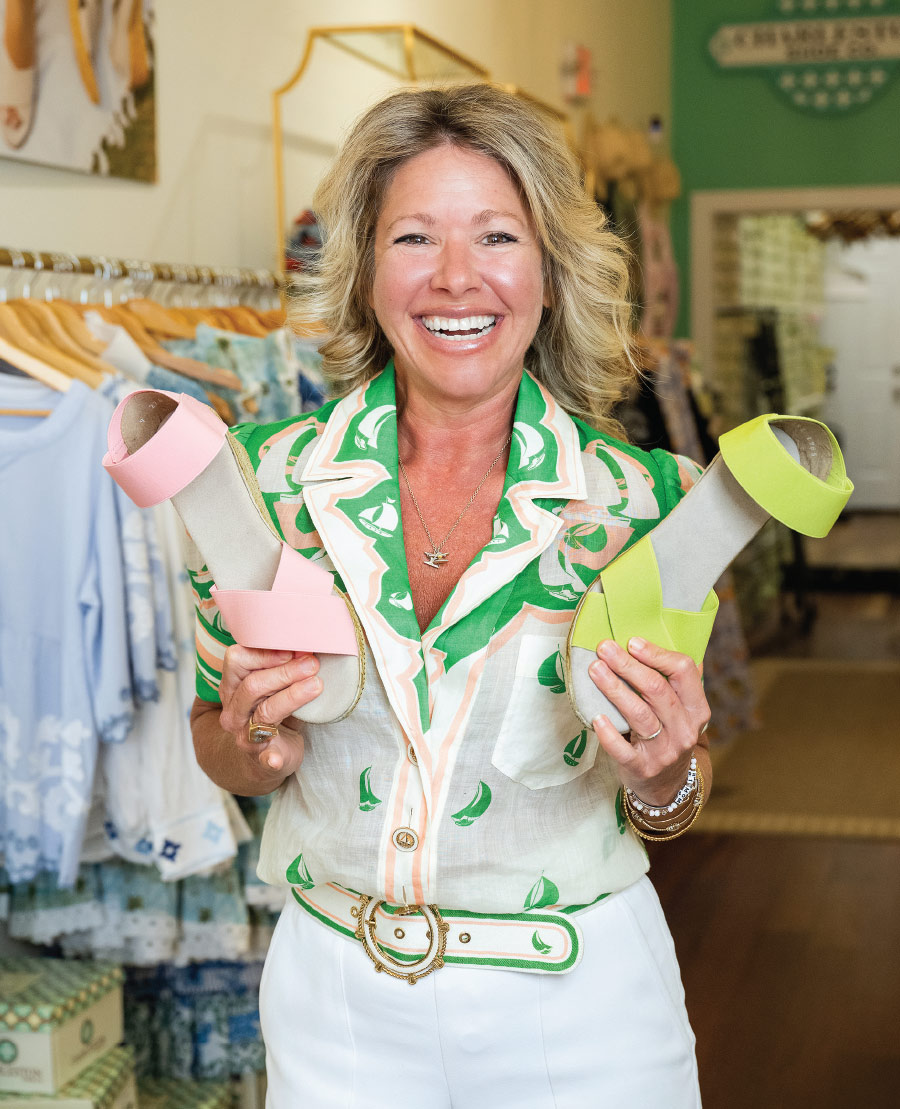
Sole Proprietor
“We bought a pair of shoes, and every time we went back, we bought more,” she remembers. “And then, my friends and family would say, ‘Oh, bring me a pair.’”
Before Powell knew it, she had both feet in the shoe biz. She’d fill suitcases full of shoes in San Miguel and lug them to furniture markets with her mom all over the East Coast and South, selling them on the side. The momentum carried her through her years as a studio art major at the College. By the time Powell graduated, she had 300 wholesale accounts. But after a decade, during which the entrepreneur from the Florida Keys had moved to San Miguel to try to make a full-time go of it, she decided to pack it in.
“I hadn’t made a dime,” she says.
It was time to reassess. Powell took a breath, had a baby and decided to go back to school – this time to Savannah College of Art and Design to study shoe design. But she couldn’t shake the entrepreneurial bug.
“I wanted to do something for myself like my parents had, and I didn’t want to work for either of them,” she says.
She opened a store in Savannah, Ga., selling her own designs, and three months later, she moved the whole operation to Charleston. By 2019, Charleston Shoe Co. had 32 stores. Retail, it turns out, was her niche.
Looking back on her time at the College, Powell says having a liberal arts education set her up for success. “It taught me so many facets of business, arts and communications, allowing me to juggle all the challenges that I face today,” she says, recalling art professors Frank Cossa, Cliff Peacock and Michael Tyzack as her biggest inspirations. “They pushed me to be bold, which made my confidence soar and take big leaps like creating this business.”
Today, Powell lives on Isle of Palms with her 17-year-old daughter. With its headquarters and warehouse on Upper Meeting Street, Charleston Shoe Co. produces 10,000 pairs of shoes a week, made by a team of 80 cobblers in a factory run by the adult children of the original cobbler in Mexico. In addition to an online and wholesale business, she now has 26 stores nationwide, including in California and St. Thomas, Virgin Islands, with three more slated to open this year. During Covid, she started the nonprofit Shoe Joy, which to date has provided $5 million worth of free shoes around the world through partner Soles4Souls. And, coming full circle, she regularly speaks to classes in the College’s entrepreneurship program.
For Powell, one of the most satisfying aspects of running a successful business is nurturing her employees, many of whom have graduated from the College. Four of them have been with her from the beginning, starting when they were freshmen, and now each runs a division of the company.
“They’re passionate about everything they do,” says Powell, “because they feel like they’ve essentially helped me grow this business, which they have.”
The Book Doctor
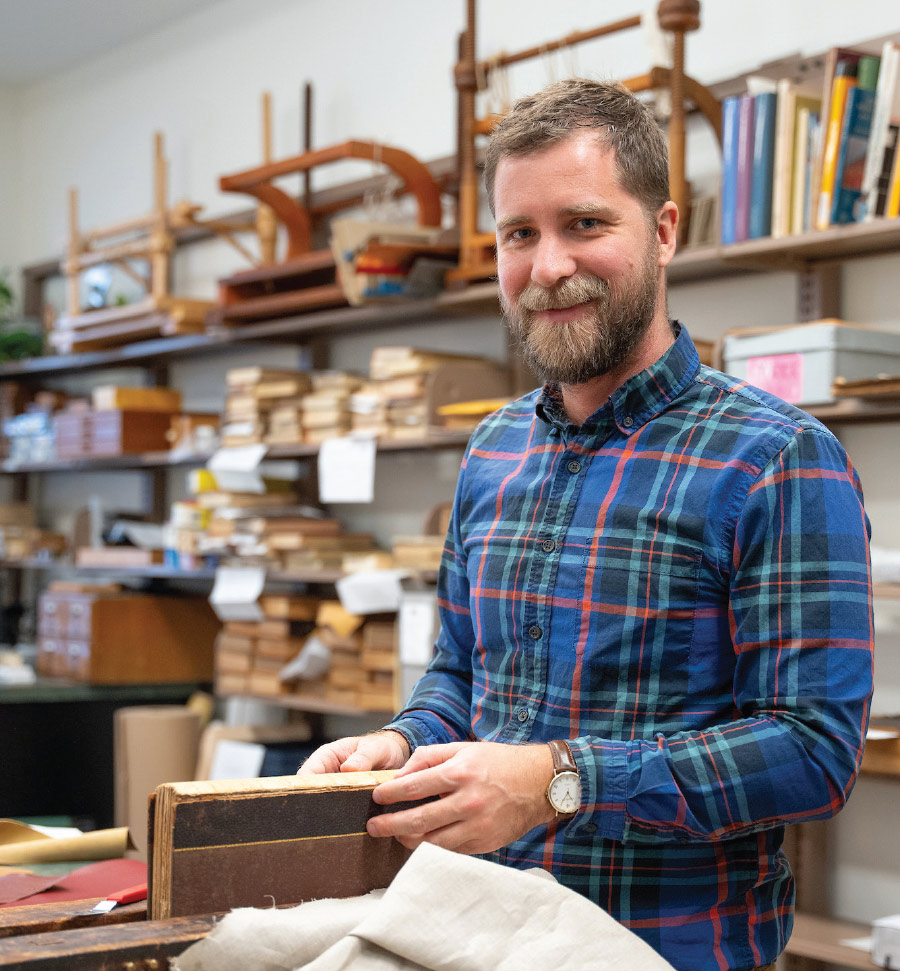
“I love that when I go home at the end of the day, I haven’t been staring at a computer screen,” says Davis. “It’s challenging, creative and always different. I feel like I’m providing a good service to the community through an organization that does the same.”
The bindery, named after a socialite who practiced bookbinding as a hobby, is where Davis combines art, science and history to repair and preserve precious volumes. His current projects include everything from family Bibles to rare institutional collections, with some restorations taking over a year.
One of his most challenging projects is a 1693 Huguenot Bible containing irreplaceable family history written inside its covers. After 19 months of painstaking work, Davis has reinforced the spine, reattached the boards and even re-created the original decorative thread colors he discovered hidden within – all while preserving the book’s essential historical elements.
“It’s a super important book with high historical value,” says Davis. “I really wanted to make sure I did it right.”
An art history major, Davis discovered conservation during a study abroad program in Florence, Italy – the birthplace of modern conservation. After graduation, he worked in publishing before a visit to the Dead Sea Scrolls laboratory in Israel sparked his interest in book and paper conservation.
This led him to specialized training at West Dean College in the U.K. He returned to Charleston and spent six years as a conservation technician at the Library Society before taking over as bindery director in 2020.
“Without the expertise of a conservator such as James in house, we would be at a complete disservice to our collections in terms of proper care and preservation,” says Executive Director Laura Pelzer, noting the advantage to the community as well. “The ability for a family to preserve a Bible or document that has been passed through generations is invaluable.”
Davis demonstrates the difference between modern machine-made books and traditional hand-binding. While mass-produced books rely on glue to hold individual pages together, hand-bound books feature an intricate structure of folded sections sewn around cords that support the spine. A single hand-bound volume can take eight hours or more to create.
His conservation work requires equal patience. A typical family Bible restoration can cost as much as $2,000 and involve hours of careful repair work. The process includes assessing damage, reinforcing torn pages with special conservation tissue, resewing sections and reconstructing the spine – all while maintaining as much of the original material as possible.
Reyling on word of mouth, Davis maintains a monthslong waiting list of projects. He hopes to expand the bindery’s work with institutional collections while continuing to serve individual clients who understand the value of preserving irreplaceable historical volumes.
“People understand their value,” he says, “and they want to preserve them for the future.”
Towering Achievement
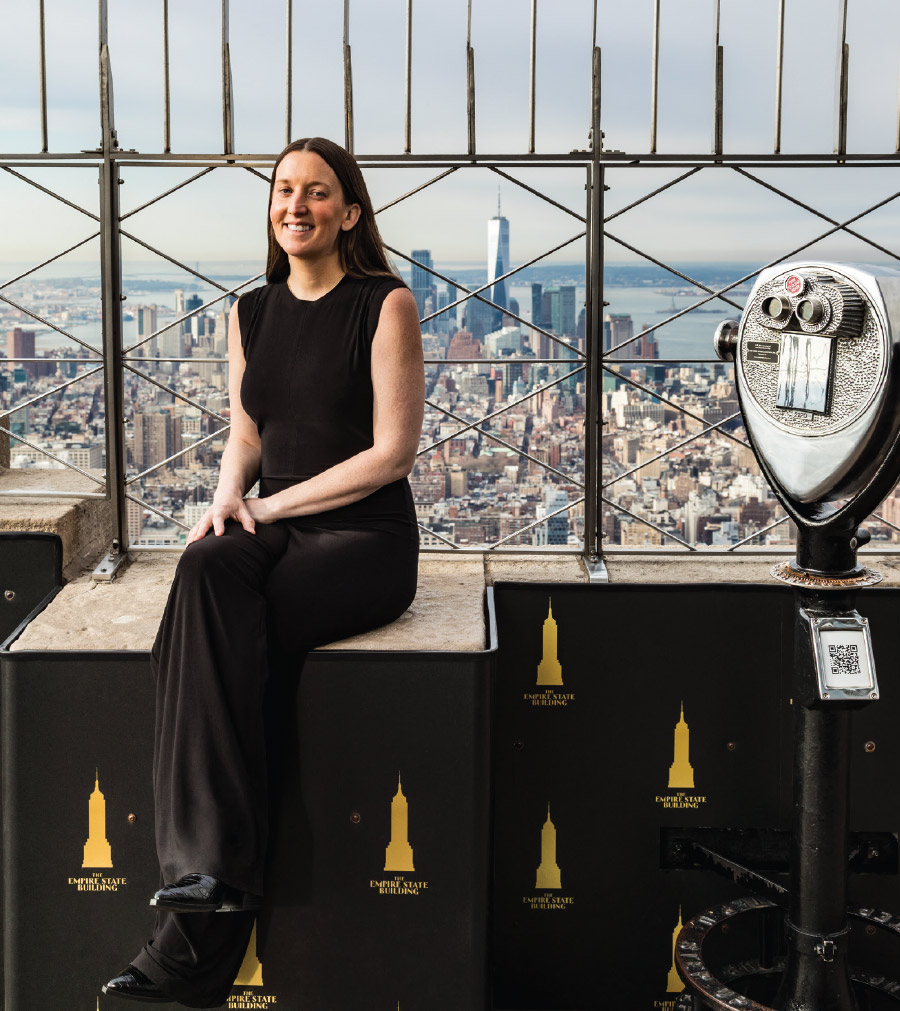
And ESB has a lot to say, and quite the online presence to do so, boasting 1 million followers on Instagram, 1.3 million on Facebook and 1.6 million on TikTok. On each platform, the landmark building comes alive, flirting, joking, clapping back, celebrating the beauty of New York City seen from such great heights and inviting others to do the same. Many followers take ESB up on that offer – the Manhatten skyscraper welcomes 2.5 million annual visitors into its gleaming art deco lobby and new museum before they rocket up to its renovated 86th- and 102nd-floor observation decks.
Hundreds of celebrities are among those who have made the journey, some with more flair than others. In 2023, Jared Leto physically climbed ESB’s exterior to promote his band’s world tour, and in 2024, the cast of HBO Max’s House of the Dragon joined a 270-foot-long dragon, Vhagar, atop the building in preparation for the show’s second season.
When brands interested in promotional events do the outreach to Rickards’ team, part of Rickards’ job is to push every idea to be splashier, bolder, more experimental.
“The House of the Dragon team reached out and said, ‘We want to put a banner on the building,’” she recalls. “And we said, ‘What about a dragon?’”
While Rickards was growing up in tiny Newbury, N.H., a town with no stoplights and a population under 3,000, her dreams of working in a creative field did not involve dragons. Eventually, however, they came to include Cougars.
“I wanted to go to school in a small city with a campus in the downtown area,” she says, citing Charleston’s warm weather and fascinating history as bonuses. “I loved the opportunities the College and city provided me. CofC gave me a great education and my best friends; the communication department gave me the foundation for my career.”
Through a retail job as a student, Rickards met a woman at a real estate firm who hired her as a marketing assistant. So, when she acted on a lifelong interest in moving to New York after graduating, she had two years of experience under her belt and was able to find a job with Empire State Realty Trust.
After a three-year stint as marketing manager for a different real estate company, she returned to the Empire State Building in 2018. She was excited to step into a leadership role in which she could build and develop her own teams, which sometimes requires stupidity.
“I’ll sit down with the team and ask, ‘What’s the dumbest idea you have?’” she says. “Stupid is fun. It’s great when you have a team that gives everyone the freedom to be stupid. Things flop, or they go viral, but we never get deterred when they flop, because it all helps us better understand our performance and the direction we need to take.”
Equally important is instilling a sense of what the 94-year-old brand stands for, what lines it will and won’t cross. “We have a strong identity and strict brand standards,” Rickards says. “So when we’re thinking up content, we’re asking ourselves, ‘How can we keep to those standards but still have fun?’”
Diploma Parlay

As an Honors College student majoring in political science and minoring in English, Dossaji took advantage of a multitude of experiential learning opportunities. Through internships with AmeriCorps and U.S. Senator Elizabeth Warren’s presidential campaign, Dossaji ingratiated herself in the community. She also ventured well beyond the city to gain a deeper understanding of social injustices. From studying humanitarian action in Cambodia, Vietnam and Jordan to interning with the Department of Justice’s Civil Rights Division in Washington, D.C., Dossaji became a global citizen-scholar.
After graduating, Dossaji spent three years on the public service leadership institute team at the Partnership for Public Service in Washington, D.C., before heading off to the University of Michigan Law School. In addition to her studies, she’s been involved with voting rights law issues and the Innocence Clinic, which helps exonerate wrongfully convicted individuals. The work is emotionally taxing but rewarding as it offers a tangible sense of purpose and potential change.
“I really like to read and write, but that has developed into a passion for the world, politics, social justice and civil rights,” says Dossaji. “These are the things that drive me both personally and professionally.”
The relationships she built with faculty at CofC proved particularly instrumental as she prepared for law school. Among these mentors were Anton Vander Zee, chair of the English department, and Jesslyn Collins-Frohlich, director of the Office of Nationally Competitive Awards.
“I had such strong connections with professors, even those who don’t work at the College anymore,” says Dossaji. “I knew them on a personal level, and they knew me. All the tools and resources from the College were still accessible to me, and that was incredibly helpful.”
If there’s one piece of advice Dossaji could offer current undergraduates, it’s this: Trust in your path, even if it diverges from your initial plans. Follow your passion and instincts.
“I think I’m better off for leaning into what I wanted to do in the moment,” she says. “Eventually, that will lead you to the right place.”
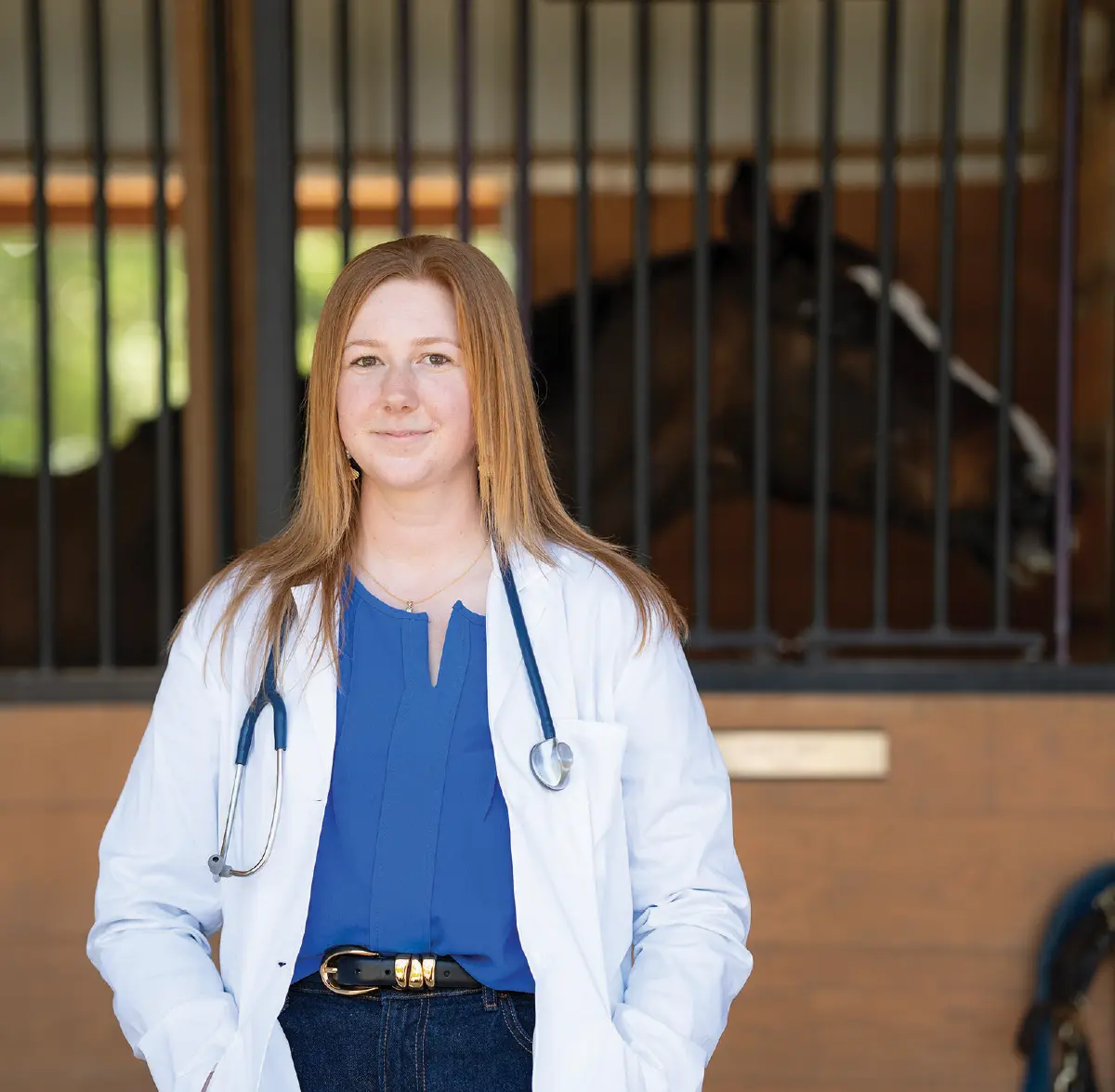
Pace’s love of animals set the stage for her career path. “When I was younger, I thought I would be interested in equine veterinary medicine because I grew up riding horses,” she says.
As an Honors College student, she decided to major in biology so that she could pursue the veterinary route, particularly the sports medicine and orthopedics side.
Before graduating, Pace had some impressive accomplishments. She published an extensive research project on archaea microorganisms for her bachelor’s thesis, interned at local veterinarian clinics, captained the equestrian team and served as president of the College’s Pre-Veterinary Society.
Pace is now pursuing her Bachelor of Veterinary Medicine and Surgery at one of the top veterinary schools in the world – the Royal Veterinary College of London. She’s even tried out for their equestrian and polo teams. Pace just began her clinical year rotations and expects to graduate in July 2026.
This summer, she is returning to the U.S. for three weeks to gain clinical experience at the Charleston Veterinary Referral Center in North Charleston. Then, Pace will be back in the saddle in London to finish her degree and will prepare to pursue residency in equine or small animal medicine following graduation.
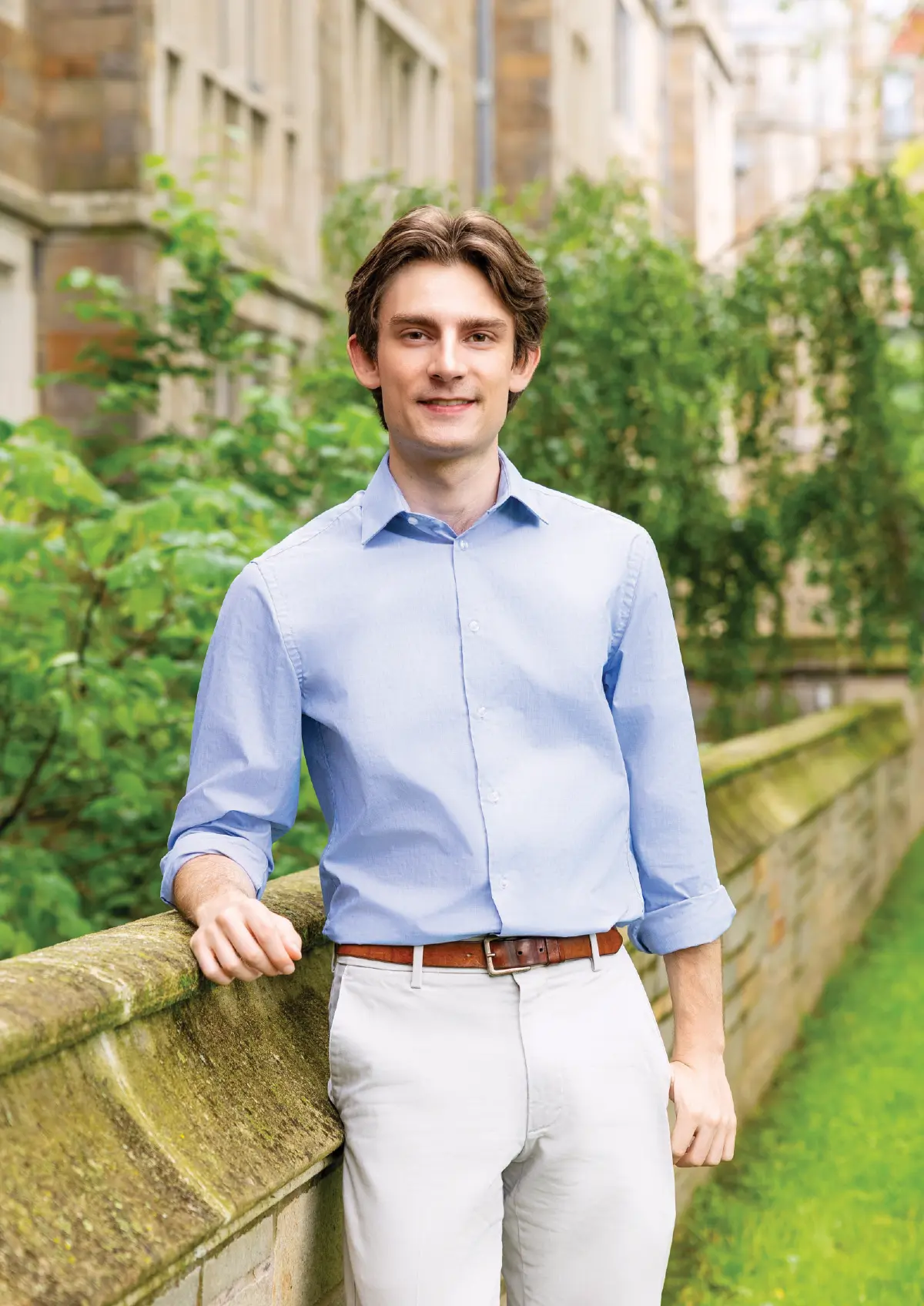
That opportunity was the PASS (Pipeline for Aspiring Surgical Students) Program, an in-depth, 10-week summer internship with the Department of Surgery at the Medical University of South Carolina. The program also teams up with the Honors Summer Enrichment Program, which supports Honors students pursuing summer endeavors by providing stipends, workshops, peer-to-peer collaboration and other resources.
The MUSC internship gave Walter invaluable shadowing, research and clinical experience. He was able to observe a surgeon interacting with patients, volunteer with EMS and be part of a research study on mice in the pancreatic cancer lab. These opportunities boosted Walter’s skills and self-confidence, assuring him that he had chosen the right career path. They also gave him a competitive edge for medical school.
Now, Walter is a student at Yale School of Medicine, especially interested gastroenterology. He says the pre-med classes offered in the Honors College prepared him well for the academic rigor of Yale. He has always wanted to work in medicine and is excited for what the future holds. – Amy Stockwell and Mary Carr
Breaking Barriers

“Just as we Black women scientists have struggled to thrive in our field, sharks have struggled to survive,” says Graham. “When Black women fight back, we are seen as the enemy, just like sharks, which, more often than not, bite only when provoked.”
Like a shark, Graham doesn’t stop moving. In 2024, she published a book, Sharks Don’t Sink, a memoir of her journey to becoming a shark scientist. She also appeared on an eight-episode PBS miniseries, Sharks Unknown With Jasmin Graham. She regularly publishes research in scientific journals and partners with National Geographic as a science adviser and consultant, leading to SCI Journal including her on its “Top 16 Famous Shark Scientists That You Should Know” list.
“I don’t just love sharks,” says Graham. “I feel for them. I admire their persistence, their resilience, their ability to survive, to keep moving forward; but I’m also laser-focused on their vulnerabilities, their need for our protection.”
Graham discovered her passion for sharks as an Honors College student at the College. In her search for a paid research position – a rare opportunity for undergraduates – she met Gavin Naylor, then a CofC marine biology professor working on the Chondrichthyan Tree of Life Project, which focuses on the genus of sharks, skates, rays and chimaeras. Naylor was able to get Graham funding, and they worked together throughout her time at the College.
“Gavin moved mountains to find me undergraduate funding after my summer research with him,” says Graham, who grew up in Columbia, S.C. “The funding Gavin found for me, when others said it was impossible, was essential, but perhaps his biggest gift was the confidence he always seemed to have in me.”
For Naylor, supporting Graham just made sense. “When you meet someone of the caliber of Jasmin, you want to support her,” he says. “For such a young person, she is incredibly self-assured – not loud but quietly confident. She was an absolute joy to work with.”
At the urging of Naylor, Graham applied for and received a National Science Foundation graduate research fellowship. After graduating from CofC with a double major in marine biology and Spanish, she studied with Naylor’s colleague at Florida State University, graduating with a master’s in marine biology. She then discovered a group of marine scientists who were also women of color.
Graham had never encountered a shark scientist who looked like her, and the experience proved pivotal. In 2020, she cofounded Minorities in Shark Science to provide underrepresented students with a welcoming, inclusive environment to explore the field of marine science. All MISS programs are free because, as Graham says, “not having money shouldn’t be a reason you never get this experience on the water.”
Today, with Graham as CEO, MISS has more than 500 members in 33 countries. In her role, she wears many hats, from fundraising and research to outreach and public awareness.
In addition to conducting ocean science workshops for students, Graham regularly presents about the importance of protecting endangered sharks. When she first started her presentations, she would Google “marine scientists” to show the audience how the field was not diverse. Now, the Google images include more diversity, and almost all are affiliated with MISS.
Graham also serves on the board of the American Elasmobranch Society, which supports the scientific study of sharks, skates and rays. She says she is pleased that AES is helping to bring more communities of color into marine sciences.
PASSAGES
May 27, 2024; Mount Pleasant, S.C.
Dec. 22, 2024; Gainesville, Fla.
Jan. 9, 2025; Greenville, S.C.
Oct. 20, 2024; Asheboro, N.C.
Nov. 12, 2024; Daniel Island, S.C.
Dec. 1, 2024; Greenville, S.C.
April 2, 2025; Hilton Head Island, S.C.
Jan. 4, 2025; Greenville, S.C.
Nov. 6, 2024; Charleston, S.C.
Feb. 17, 2025; Charleston, S.C.
Feb. 23, 2025; Myrtle Beach, S.C.
Oct. 15, 2024; Largo, Fla.
Feb. 8, 2025; Charleston, S.C.
March 13, 2025; Charlotte, N.C.
Jan. 3, 2025; Park City, Utah
Feb. 4, 2025; Ninety Six, S.C.
Jan. 24, 2025; Charleston, S.C.
March 19, 2025; Decatur, Ga.
Feb. 11, 2025; Moncks Corner, S.C.
Dec. 6, 2024; Beaufort, S.C.
Nov. 23, 2024; Charleston, S.C.
Feb. 17, 2025; Raleigh, N.C.
Feb. 12, 2025; Fort Mill, S.C.
Jan. 30, 2025; Jolly Hill, S.C.
July 14, 2024; Columbus, N.C.
June 6, 2024; Santee, S.C.
Nov. 13, 2024; Mount Pleasant, S.C.
Dec. 24, 2024; Toledo, Ohio
Aug. 11, 2024; Charleston, S.C.
Dec. 4, 2024; Johns Island, S.C.
Jan. 7, 2025; Lawrenceville, Ga.
Feb. 19, 2025; Sandy Springs, Ga.
Nov. 19, 2024; Charleston, S.C.
March 12, 2025; Fort Mill, S.C.
Nov. 5, 2024; Fort Myers, Fla.
Feb. 28, 2025; Charleston, S.C.
Nov. 2, 2024; Charlotte, N.C.
March 18, 2025; Daniel Island, S.C.
Nov. 3, 2024; Greenwood, S.C.
Feb. 8, 2025; Charleston, S.C.
Feb. 11, 2025; Charleston, S.C.
Dec. 6, 2024; Summerville, S.C.
Feb. 18, 2025; Charleston, S.C.
Dec. 27, 2024; Mount Pleasant, S.C.
Aug. 28, 2024; Summerville, S.C.
July 21, 2024; Hanahan, S.C.
Feb. 21, 2025; Myrtle Beach, S.C.
Jan. 31, 2025; Charleston, S.C.
Former Faculty
Jan. 3, 2025; Mount Pleasant, S.C.
Former Faculty
Dec. 12, 2024; Cary, N.C.
Former Faculty
Feb. 13, 2025; Shanghai, China
Former Faculty
Nov. 1, 2024; Charleston, S.C.
Former Staff
Dec. 2, 2023; Summerville, S.C.
Former Staff
Oct. 27, 2024; Charleston, S.C.
Former Staff
Nov. 5, 2024; Charleston, S.C.
Former Staff
Aug. 21, 2024; Charleston, S.C.
Former Staff
July 19, 2024; Havelock, N.C.
Former Staff
Jan. 15, 2025; Columbia, S.C.
Student
May 2, 2025; Johns Island, S.C.
Four-Step Program
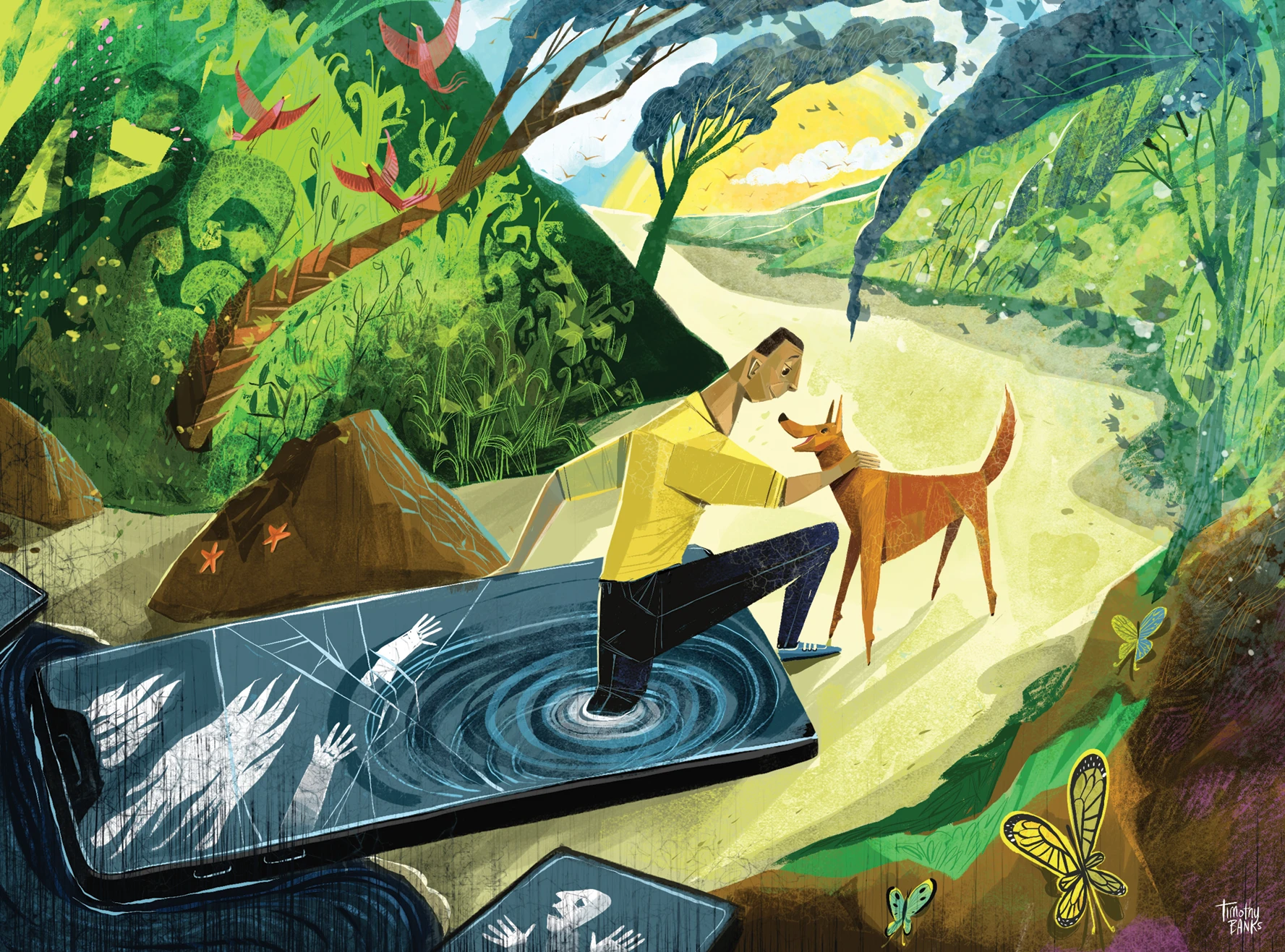
More than 70% of American adults are concerned about how technology affects their mental health and personal relationships.
Our recent research studied the digital detox journey, where people take a much-needed break from digital consumption, aiming to uncover what supports or sabotages those seeking digital well-being. Our findings highlighted four key strategies to improve this journey:
1. Finding replacement practices
Feelings of withdrawal during a digital detox are quite common. For many, reaching for their phones and scrolling has become such a ritual that they often don’t realize they are doing it. Finding an alternative to distract your mind and occupy your hands can be crucial during a digital detox. These replacement practices often involve hobbies or activities that result in play. As adults, people sometimes forget what it feels like to have fun. By engaging in play for its own sake, you can significantly reduce stress levels and boost your digital well-being.
2. Shoring up social bonds
Since humans are social creatures, our innate desire for connection combined with people’s reliance on technology can lead to feelings of FOMO – fear of missing out – and anxiety during a digital detox. Although we’re a more connected society, relationships suffer and people are lonelier than ever.
During a digital detox, it is vital to fill your cup with community. We recommend engaging in a digital detox alongside others, because FOMO may rear its ugly head if your friend pulls out their phone during a night out.
3. Emphasizing mindfulness
In today’s fast-paced environment, finding a moment to pause can feel impossible. Many don’t have moments to be alone with their thoughts. Yet, the ability to just be allows time to reflect, helping you consider what makes you happy and healthy.
In our study, yoga and meditation were common ways that detoxers found moments to become more aware of their own thoughts, which helped foster more intentional behaviors. Finding moments where you can step away – to be still and silent – can provide a much-needed recharge.
4. Viewing digital well-being as an ongoing journey
Ultimately, digital well-being is a journey. It is not a checklist that, once completed, means you are fulfilled.
A successful detox often leaves people feeling introspective and curious. Relapses are common, especially if detoxers don’t set and monitor goals. Importantly, your needs change and evolve over time. What works now might not be what you need in the future.
We recommend identifying specific goals related to your own digital well-being. These aren’t productivity goals but goals to be unproductive. Whether planning a weekly game night with friends or taking a 10-minute walk without your phone, making time to unplug is worth it in the long run.
People are not machines, so recognizing your limits and finding ways to reconnect with yourself and others during a detox can enhance your sense of humanity and digital well-being.

